In Nomine Corporeal Player's Guide by Mors Rattus
Here's Johnny
Original SA post Corporeal Player's Guide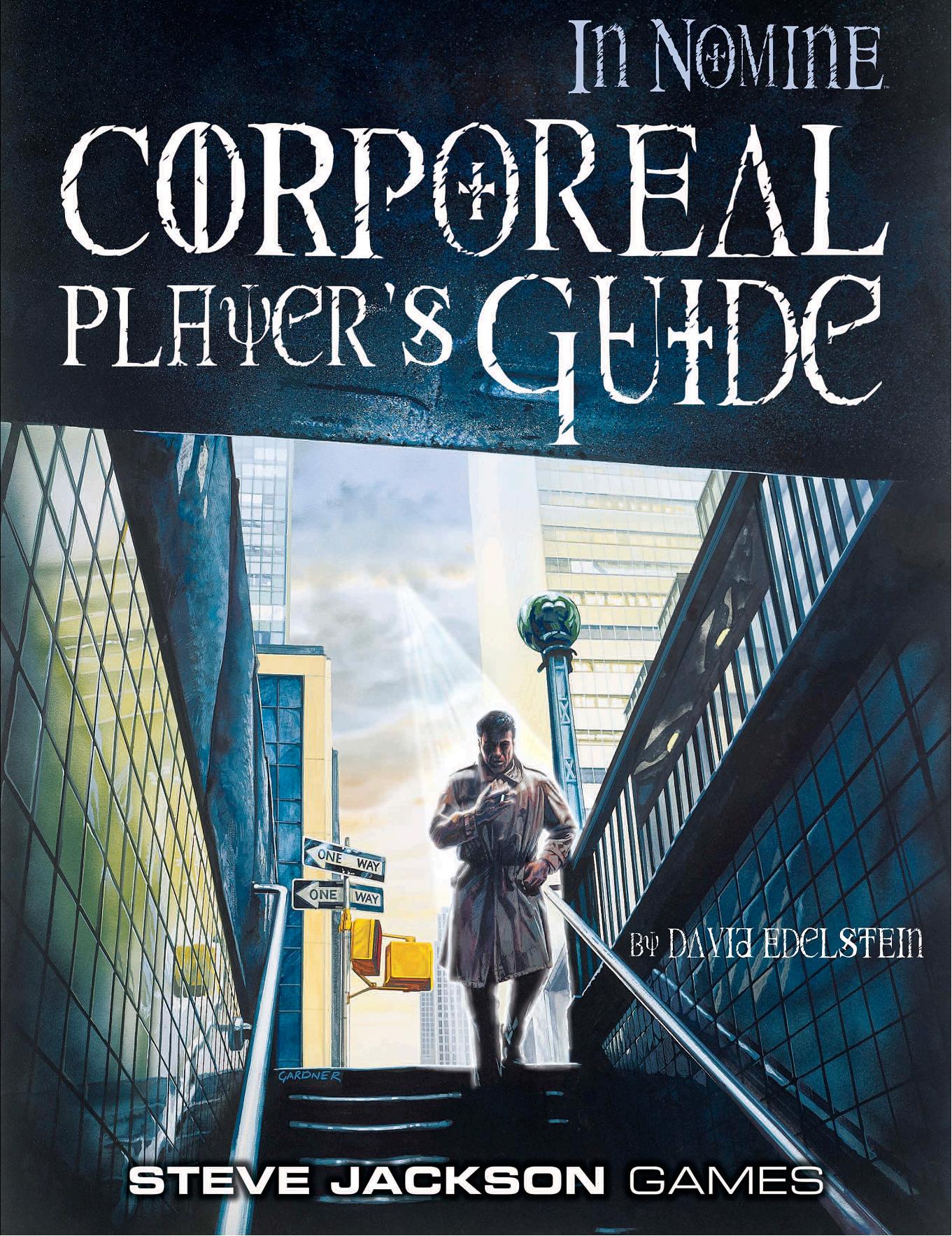
The opening fiction of this book has to do with a gang member named Johnny. He gets recruited by a demon. Anyway, this book is about the human characters in the War. It is easy to see them as inept cannon fodder, and many angels and demons do see them that way. However, humans are the reason for it all. Demons might deny it, angels might question it, but if there were no humans, there'd be no War. Humans were why Lucifer rebelled, and while some Princes say their significance ended there, they provide Heaven and Hell with Essence, both directly and by the creation of Tethers. The War, however, isn't even about resources. It's about a principle - about who is right = and the true battleground for that is the human soul. Demons must prove that humans are base animals, unable to escape their fates and unworthy of God's favor. Angels must prove humans are special, able to achieve a destiny even the Archangels cannot understand. Some believe the War will be won by military conquest, with humans as mere tools. But the oldest ones, who remember the Fall, know it's all for nothing if humanity doesn't prove itself one way or the other. Humans matter.
Evolution exists in In Nomine, but God was there, shaping the universe. Many angels, particularly Jordi, were deeply involved in the origin and evolution of life. The first humans were the result of millions of years of evolution, perceived as a blink of an eye to the angels - they saw time differently in those days. Some were shocked by the humans, and no one knew if they were planned or accidental. No one ever knows if God truly planned their creation. But they made a huge stir. Most angels liked them - they had particularly nimble vessels. Not strong, not fast, but excellent at making things and expressing. The opposable thumb, some angels said, was the best thing since lungs. But it was not thumbs or intelligence or even art that set humans apart. It was belief. By believing things, they changed the Symphony. The Marches began to fill with dreamscapes, and some entities became potent on the Essence of belief. Tethers formed based on human actions. Before them, only the most dramatic natural events could open Tethers. The angels were shocked to learn that one human could affect the Symphony as much as a hurricane or billion-year-old mountain. Humans generated Essence and could wield it. Some angels continued to argue that they were just monkeys with big brains, but as evidence of the phenomenon of faith spread, these arguments became hollow. Angels knew that God existed - but humans could adore God as fervently based solely on belief, on faith, with no proof. Faith was the special gift of humanity.
Many were upset when Yves announced God's ruling of nonintervention with humans. Jordi was the first to defy the order - he believed that, special or no, humans were too dangerous and cruel to the rest of the world to live. He prepared to exterminate them, but Michael talked him out of it at God's request. Lucifer was less direct and slower to back down. He was more cunning, suggesting that before Earth be given to humans, they must prove themselves on a smaller scale. He proposed a microcosm, a perfect place in which a perfect pair of humans could demonstrate that, without celestial intervention, they could achieve their destinies. God agreed.
Eden was created, and Adam and Lilith were made whole, created without ancestors. The Eden experiment's first problem was when Lilith, on learning her role, chose to leave. Rather than make a new and equally unpredictable woman, God took one of Adam's Forces and used it in the batch to create Eve. However, the test was contaminated. Lucifer enlisted a fixer and did not rely on a fair outcome. God declared that because it was clear that celestlals could not resist meddling, they must refrain from all Earthly intervention. Adam and Eve were released into the outside world, but mankind would never have Earth all to itself. The Fall followed quickly, and the War has ensured the presence of celestials.
It's been a long time since Eden. Celestials still intervene in human affairs now, if not as openly as once they did. Some famous people have even been angels or demons. Most, however, have not. Even the influence of the Superiors is fairly small, in human history. They are eddies and splashes in a very long stream. The cumulative effect may divert its course, but most ripples are made by humans, not celestials. Celestial action is not irrelevant, mind - they can affect human society in very significant ways. But humans can do the same, and it's impossible to separate celestial influence from human influence. It's not really, ultimately important which group is responsible for any particular moment. What is important is human reaction. Humans outnumber celestials hugely, and history belongs to them. The outcome of the War will be decided by them. Each human can choose their destiny or fate, regardless of influences in either direction. Celestials hold that humanity as a whole has a destiyn and a fate, and that each human soul will tip the scales, one way or the other. Angels and demons try to tilt it by influencing humans, but they cannot remove choice and free will.
The fiction continues with Johnny teaming up with the demon Rawmeat to take over his gang. Moving on...humans seem dull and weak compared to celestials. They are unable to perceive the Symphony's glory and experience the certainty of God's presence in Heaven while alive. Few celestials truly appreciate the advantages of humanity. They feel more deeply than celestials, never needing to fear that their emotions will alter their fundamental natures. Humans have total freedom to be selfish or selfless at will, to love and to hate at once, to choose virtue or vice as their mood suits. They are flexible in ways no celestial can ever be. They appreciate the pleasures and hazards of Earth with a sensitivity that the replaceable nature of vessels often prohibits. These abstract qualities are of little interest to most celestials, however. One thing they do grasp, though, is that humans are native to Earth. They belong here, they are natural, and so they can act subtly yet profoundly on Earth. They are elegant, quiet tools compared to the chainsaws of celestial servants.
Fiction continues - Johnny is revealed to be doing all this so that he can take care of his girlfriend, Anna, and provide for her. He loves her deeply. Moving on - human, as defined by In Nomine, is anyone born human. Soldiers, mundanes, sorcerers, Saints, Undead and Children of the Grigori are all human for purposes of the Symphony. They are natural, and nothing they do creates Disturbance. They have no Role or need for one. The only wqay they can cause Disturbance is by conscious expenditure of Essence, which only the Symphonically aware can do. If a human performs a Song or a Saint assumes celestial form, it causes Disturbance, as does deliberate spending of Essence to improve your luck. Unconscious expenditure as part of a focused effort does not, however. Still, even when humans do expend Essence consciously, it never produces any supernatural side effects. Further, celestials cannot damage or kill humans - even the vessels of Saints or the Undead - without causing Disturbance. Lastly, humans can create Tethers by their actions. They can't do it reliably even if they want to, but their thoughts, deeds and Essence can empower Words.
No Superior has ever found a reliable way to force a human towards fate or destiny. They can be influenced, manipulated, coerced and led, but they are hard to predict and impossible to control. No attunement or Song can actually compel a human to seal their fate. Period. Celestials often find them very hard to predict at all. Celestial personalities are influenced massively by their Choir or Band, which hardwires many reactions into them. Everything they do is tinged by their resonance and Word. It makes them consistent, predictable. Humans are not. Even the Symphonically aware can only hear Disturbance - they can't feel dissonance as feedback on their choices. Human behavior is highly variable and amazingly inconsistent, from the celestial view. For an angel or demon, acting out of character is a cause for alarm. For humans, it might just be because they're having a bad day, are under pressure or just feel like it. It's hard for celestials to grasp. Humans can choose, moment by moment, to be selfish or selfless. Celestials are born to one or the other and can't go in the other direction too far without painfully transforming themselves. Behavior that would require Discord in a celestial is just a personality trait for a human. Humans are free to rise or fall, and they still haven't provided a solid answer to the free will debate.
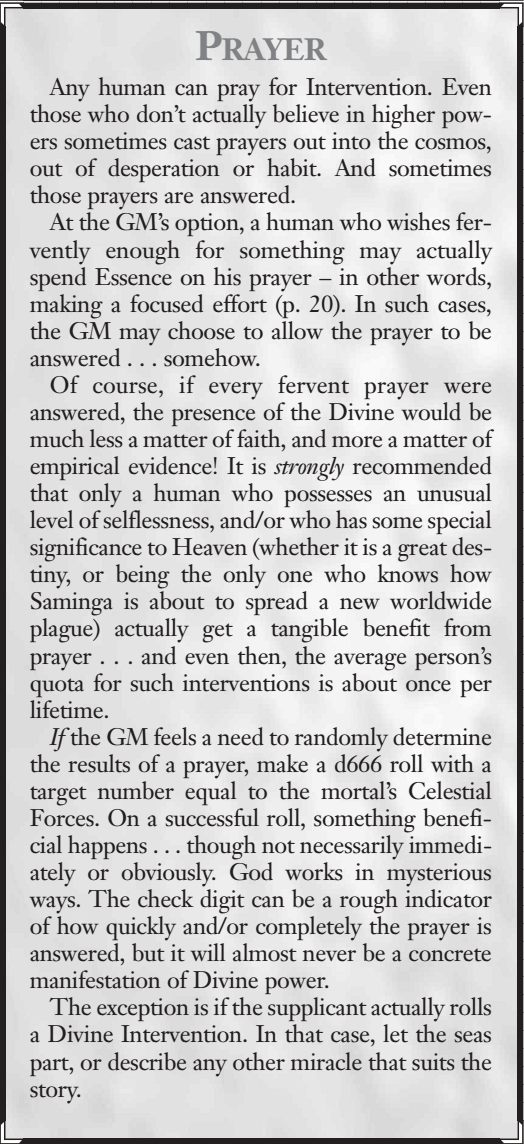
God and Lucifer rarely directly intervene in human lives. Interventions rolled by mundanes are rarely dramatic and almost never supernatural. They're just lucky or unlucky, no supernatural assistance. Mortals who have not taken a side are not aligned for purposes of Interventions, so what's a good or bad one depends entirely on what they were doing at the time. Divine interventions are good when you're being selfless and bad when you're being selfish. For most value-neutral stuff, Divine Interventions tend to be good and Infernal Interventions bad. However, that can all change at God or Lucifer's will. Sometimes a seemingly benevolent action is smiled on by Lucifer, sometimes the Holy Spirit aids someone acting selfishly. No one seems to understand why, but there is always good reason. Humans who throw in with one side or the other, of course, are treated accordingly. Soldiers of God and Hell have picked a side. Saints are divine, Undead are diabolical. Sorcerers are usually Hellsworn, but there are exceptions.
The entire world as we know it, with gravity, temperature, taste, texture and sleep, is all alien to celestials. They get taught about Earth and how to function there, but they still have to practice at it and it still feels weird. Humans, on the other hand, function by instinct. A human need not learn how to breathe or sleep, or how to react to physical sensation. Humans are thus often the best teachers for earthbound celestials, if they understand how celestials tend to think. (The inexperienced are not - they will rarely remember to explain that commercials aren't real, for instance.) Second, humans with experience are often more likely to spot a celestial pretending to be human than another celestial is. They know what signs to look for that a celestial wouldn't think of - someone who works all day without getting thirsty, someone who can't talk about high school in any meaningful sense, someone who fails to stock their bathroom with hygiene products. Third, no matter how long a celestial's on Earth, they never really understand humans. With all their experience and resonance and Words, thy remain outsiders. Humans have proven again and again to be just as able to alter the course of history, just by virtue of being part of it.
We return to Johnny and Rawmeat. Rawmeat reveals that they're building a bomb so that they can start a war between Haagenti and Belial. It is specifically a nuke, and Johnny realizes that if it goes off, it will take out the entire neighborhood. Johnny realizes that he can't get out of the area in time to meet Anna - they'd both die if he tried. Johnny decides to sacrifice himself, and as the nuke is about to go off, he uses the Song of Shields taught to him by Rawmeat to encase himself and the nuke, containing the explosion to a very small area. Only the house they are in goes up. Johnny achieves his destiny, and an angel of Destiny shows up to tell Anna about it, then erases her memory so she will only remember that Johnny gave his life to save many, many others, despite being a Soldier of Hell.
Mortal humans require food, water, sleep and air, at minimum. Most also require lives and interaction with other people. This is often not apparent to many celestials, who are on call 24/7 and often fail to realize that humans need more out of life than work. Indeed, this is often the hardest thing for celestials to learn - to pass for human, you need to act human and spend time on nonessential work. Even Saints and Undead, who lack the biological needs of mortals, possess human drives. Sure, they may be on the job a lot, more than any normal human, but they retain hobbies, preferences and probably friends and family. Becoming immortal doesn't remove all that. Sure, they might be less important, and Saints are discouraged from contacting any relations they had, but even they don't spend all their time in service to their Word or their schemes. Sometimes they just want to catch a game. Humans all have motivations and agendas, and even a veteran Soldier has a life still. They aren't interchangeable robots.
The big disadvantage of being human is death. Celestials can come back. Humans...can't, usually. Injury and death are to be feared. Humans are fragile...but if you know Heaven exists, well, that's something to take courage in. (Demons usually lie about what Hell is like for this reason, as Hellsworn have little waiting for them that's pleasant.) There are five main destinations for a human soul - Heaven, Hell, the Marches, reincarnation or being a ghost. Of those, three are only postponements. Heaven and Hell are obvious. Reincarnation is for most people - those who do not meet fate or destiny, or who meet both. These peoples' souls are reborn in new bodies, wiped of all memory of their prior existence. Angels claim it's a chance to get it right again, while demons say it's being held prisoner on Earth in God's rigged game. Some souls reincarnate many, many times. There's no real way to reliably recognize a reincarnated soul or awaken its past memories, but it has happened before, rarely.
Sometimes, however, a soul doesn't reincarnate. No one knows why, but sometimes they just...stop. Their Forces disband and the soul vanishes forever. This always happens to Undead upon death. No one knows exactly what causes a soul to disband, but most celestials believe that in non-Undead, it is caused by as strong desire, conscious or not, to cease to be. Some blame atheism or too many reincarnations or too much despair in one life.
Ghosts are all souls that have met their destiny or fate, but who are so compelled to remain on Earth that they stay as ghosts. When they finally let go, they head off to where they're meant to be...but if forced to leave, they will disband utterly. Sometimes, however, a human soul will form a strong attachment to an ethereal realm. These souls become dream-shades, usually after dying while dreaming, though sometimes an attachment to a strong and enduring dreamscape will remain even after death, allowing the soul to support itself in the dream as a symbiotic afterlife. Some sorcerers, lucid dreamers or Dream Soldiers know enough about the marches to anchor themselves there, while some pagan souls are called to their god's Domain after death. Dream-shades never last forever, though. Eventually they move on, either to Heaven or Hell, or to vanish, possibly disbanded or reincarnated.

Humans, like all life, are made of Forces. Unlike ethereals and celestials, however, they are born with a set pattern of Forces, determining how many will attach naturally and how many can be added to them. Most mortals are born with one Force and can reach 5 naturally. The rate varies - most children have 2-3, teenagers generally 4, but a precocious child might have 4 and a late blooming sixteen year old might have 3. Rarely, a human is born with 2 Forces, and these usually turn out to be prodigies with higher than average potential. A normal human musth ave at least 1 of each type of Force - 0 in a realm is possible only for the very young who have less than 3 Forces still or for those that are severely handicapped.
Every human's ptoential is limited by their Force configuration. Most humans can't go over 5. A few can't even go over 4, due to physical or mental stunting. Some are able to hit 6, making them exceptional and potential Soldiers. A rare, rare few can have 7 or more, making them potentially legendary. Usually, a human achieves all their potential by adulthood. However, anyone with the potential for 6+ Forces will only reach 5 naturally. The rest must be acquired by training, dramatic events or celestial help. Most humans never achieve that potential. A human can exceed their potential only with celestial help, and it's risky. The theoretical maximum for any human would be 15 Forces, as mortals can never have more than 5 in any one realm. It is doubtful if more than hald a dozen 15-Force humans have ever existed, and some hold that it's only been Adam, Eve and Lilith - and they were created that way. No one knows the exact distribution of human potential. Vapulans have done studies, but it's hard to research. The consensus is that about 1% of humanity have potential for more than 5 Forces. Of those, only a tiny fraction have more than 6. Beyond that, only estimates are possibly, but conventional wisdom is that at any one time there are perhaps a handful of people with 10 Forces. Over centuries, a celestial paying very close attnetion might meet one human with 12 Forces. More than that might be once a millenium.
Next time: Forces
Forces
Original SA post Corporeal Player's Guide: Forces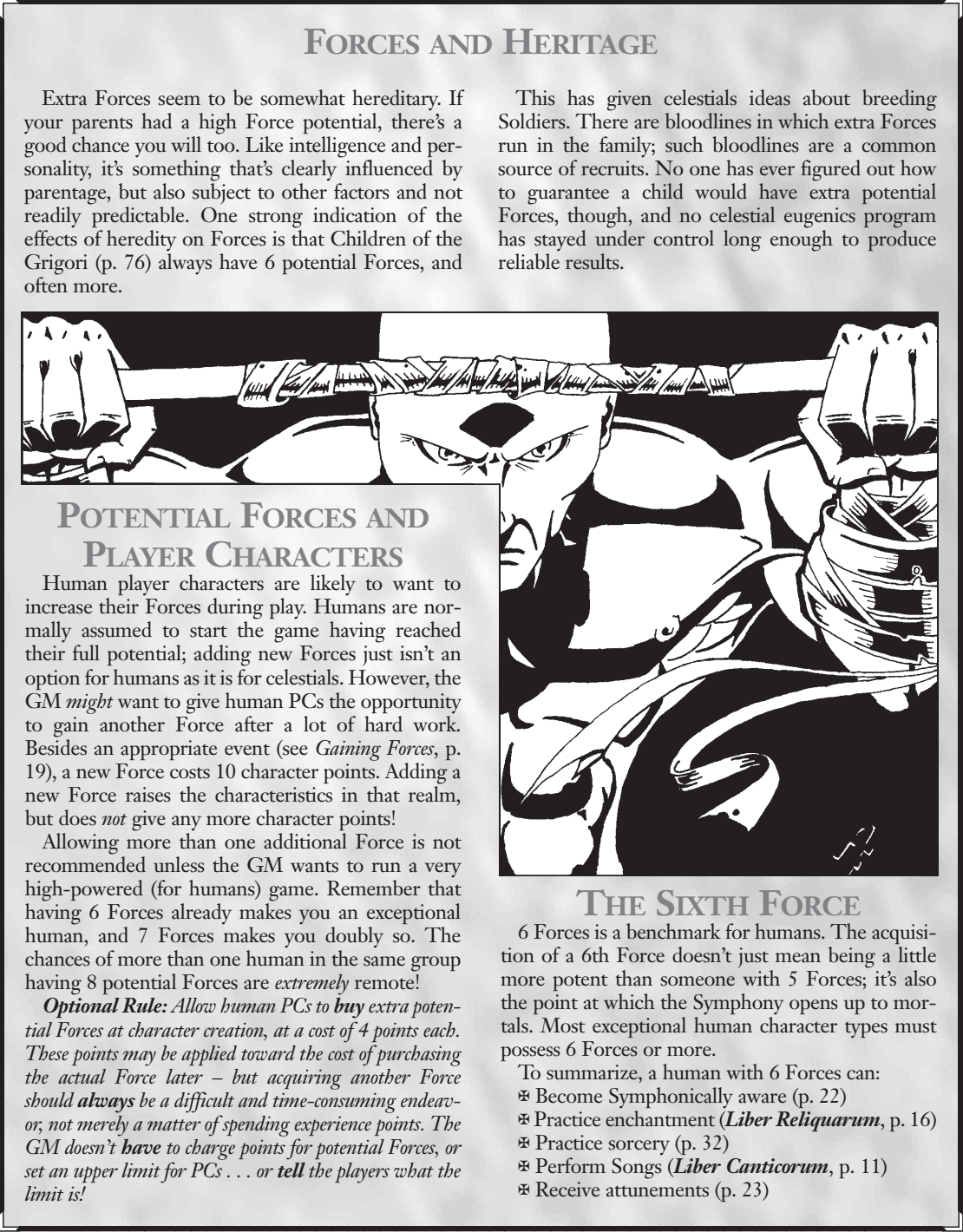
A few humans with extra potential do not need to strive - they are born with the ability to reach 6 or more Forces by adulthood naturally. Most humans with the potential have to work for it, however. There are two natural ways to gain new Forces - training or a trigger event. Training is simple, mechanically. Spend CP to raise your stats. Once a connected pair are raised by 4 total points, possibly only if you have the potential for another Force, you gain a Force in that realm. If you do not have the potential, you can't get that fourth stat point that'd push you up a Force. Note that humans have a maximum stat level of 10. Saints and Undead can exceed this due to no longer being bound by mortal limits; Soldiers and other mortals need GM permission. 12 is the cap for all humans, no matter what, even with GM permission. A trigger event can be anything the GM considers dramatic enough to awaken potential and spontaneously attract a loose Force. It can be a great tragedy or triumph, or an intellectual breaktrhough, or a spiritual epiphany. Being exposed to celestial powers often triggers latent potential as well. In play, this costs 10 CP. If you start the game having already gotten your potential Force, you must decide how you got it.
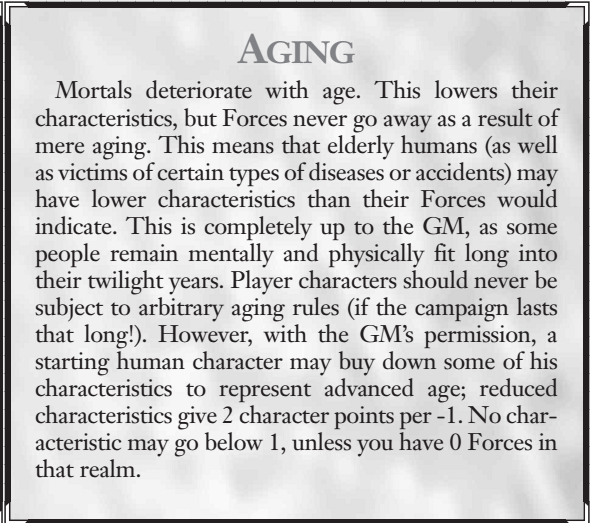
The third way to gain a Force is supernatural intervention. It's faster, but it means the Force comes from elsewhere. Celestials prefer that humans reach their full potential on their own, so they don't have to get a Superior to supply a Force, but the potential of a Soldier is usually enough to be worth the investment. Supernatural intervention is the only way a human can exceed their potential Forces. Mummies, for example, are made via a sorcerous ritual that adds a Force regardless of your potential. Archangels or Princes can also add any number of Forces to a human, even beyond their potential, but the more are added, the more unstable it becomes. Superiors rarely try for 10 or 15-Force humans because it's expensive, it's a waste of Forces more effectively used for celestials and because the human would probably die anyway in the process.
Regardless of which side they're on, all humans regain 1 Essence each day at noon. Saints and undead are sufficiently realigned to regain essence at sunrise or sundown respectively, however. All humans, including Saints but not undead, may also regain Essence once per day by succeeding at a roll with a skill they possess at level 6. This is the only method most humans have to regain Essence. Humans who cannot control their Essenca can't receive Essence from any other source and may only use their Essence in a focused effort. This is simply a concentrated and/or desperate attempt to succeed at any single task to the exclusion of all else. A focused effort automatically spernds all of your current Essence. Humans do this all the time, whenever they really want to succeed at something. Often this essence is spent on trivial things, and the GM rules when NPCs do it. However, a focused effort can be made deliberately, even by mundane mortals. It just takes a Precision roll and some training that teaches how to concentrate all your energy on one action. Some disciplines limit this to a particular area - many martial artists learn to do it when attacking, but not when, say, driving. Engineers might teach themselves to concentrate on a problem and wait for inspiration, but would have no idea how to do it for anything but their work. Focused efforts can be useful even to those who can control their Essence - it is, after all, a completely natural thing to do and thus makes no Disturbance. However, you must spend all your Essence on one roll to do it, and for the Symphonically aware, a failed Precision roll means you still spend all your Essence, but it causes Disturbance. Only humans can make focused efforts.
Symphonically aware humans can be given access to Rites in order to regain Essence, typically as a reward from their Superior for work as a Soldier. All Wordbound and some powerful ethereals have the power to grant Rites to humans, but that Essence comes from their personal supply, so generally only Superiors can afford to give out their Rites, and even then, it isn't casual. Rites can be revoked, as well.
Humans do not have vessels - they have bodies. As a result, they are quite fragile compared to celestials, though some can be quite hardy by buying levels of Toughness. Saints and undead are much tougher, as their bodies are treated as vessels for HP calculations. Saints can't have Toughness (as they actually do use vessels) but undead can. Your HP is (Corporeal Forces + Toughness)*Strength, so the average human with 2 Corporeal Forces and 4 Strength has 8 HP, while a truly incredible human with 4 Corporeal Forces, 2 Toughness and Strength 10 can have 60 HP. Like celestials, humans are knocked out at 0 HP. They die when their HP hits -(STrength + Tougness), but undead and Saints remain alive until -(Corporeal Forces + Toughness)*Strength. Mortals heal 1 HP per (6-Strength) days, minimum 1. Saints and undead heal 1 HP per day. Humans have the same mind HP as celestials, but rarely get into mental combat. Likewise, they have the same celestial HP, but almnost never get into celestial combat. Humans do not gain Discord if their Forces in a realm are reduced to 0, but instead suffer other effects.
First, all stats in that realm hit 0 unless they were raised above default with CP, in which case the extra points remain. If a human loses Forces, it is theoretically possible for them to regain them via training or any of the other methods for mortals to gain Forces. If a human loses all Corporeal Forces, they die unless they had extra Strength, leaving them with a positive Strength score. These humans remain barely alive, with 0 HP, falling unconscious from any damage at all and dying at -(Strength) HP. Toughness gives no benefits to those with 0 Corporeal Forces, and anyone at Agility 0 cannot walk under their own power. If a human loses all Ethereal Forces, they become catatonic unless they had extra Intelligence. Even then, they will resemble a victim of severe brain damage. With 0 Precision, they will have a short attention span and no ability to concentrate, as well as being a complete amnesiac with no real ability to form memories. Loss of all Celestial Forces leaves you intact, but lacking any real driving force. With 0 Will and Perception, you lose all ambition and become oblivious to most things around you. However, your soul is gone - all that's left is meat animated by intelligence. Upon death, your remaining forces will disband.
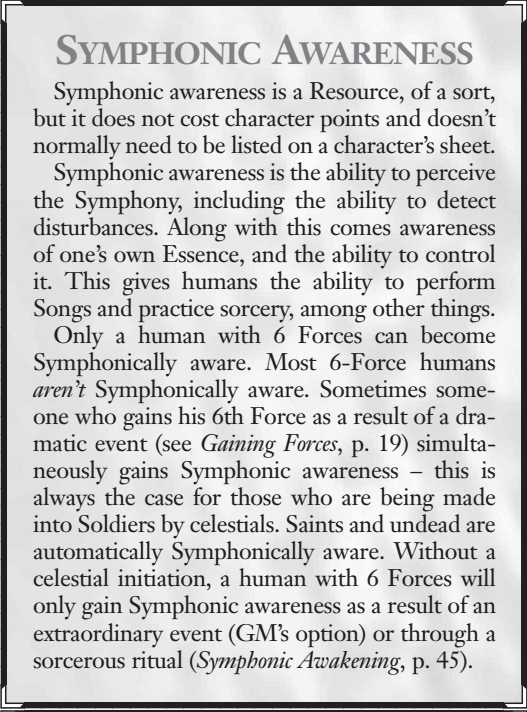
Humans can get most things that celestials can. However, they can receive only servitor attunements or Distinctions, and only if they have 6+ Forces. They may not receive any Band or Choir attunements unless they receive a Force that came from a celestial, which allows them just enough celestial nature to use the Choir or Band Attunement of the angel or demon who 'donated' the Force. Even so, they cannot use any attunement requiring a celestial resonance. Superiors rarely strip Forces from a celestial just to aattach to a human, though some Princes will do it if they already plan to kill a demon, and an Archangel would do it only if an angel were to volunteer - which is rather rare. Humans also can't have Roles because they have no need of them. They do receive a free set of skills based on their native upbringing - so in addition to their native language, they generally get Area Knowledge of their hometown, Knowledge about their profession and some hobby, and then, in America, usually basic Driving and Swimming skills.
Some things are only available to humans - Advantages. Superiors cannot grant these. Some mortals are Blessed (10 CP) - they have extremely potent resistance to anything that messes with their free will., They double their Will for purposes of resisting any resonance, attunement or Song that is resistable, plus any Fast-Talk or Seduction attempts. This does not apply to resisting anything that doesn't get resisted by Will, but does apply to resisting orders if they are made a Servant. On very rare occasions, this is gained later in life, via extreme piety or spiritual enlightenment. All Saints are Blessed automatically, due to direct contact with the Divine. Blessed mortals are not necessarily holy, however. They have an advantage against demons, sure, but some are quite selfish - their force of personality can resist good influences, too. Angels greatly value the Blessed who join them, but demons have also recruited them. Sure, they're hard to dominate, but temptation and manipulation work fine. A Blessed human who becomes a sorcery does not double their Will in a Will-war, but does get to add their Celestial Forces to their TN like a celestial would. The Blessed advantage must normally be purchased in chargen only.
Some humans acquire a Soul Link - a link to an ethereal or celestial who manifests the link as a sort of Discord. Occasionally, pagan gods will grant these links voluntarily, and it's rumored that sorcerous rituals exist to force them on spirits or even celestials. For a celestial, a Soul Link is Ethereal Discord, but it's an advantage for the human. The two are linked as per the Djinn resonance, with the exact same benefits and restrictions, but the attunement is permanent until the Discord is removed. The human will always recognize the Soul Linked being and may ask for a favor if they meet. The other being must roll vs Will at a penalty of the Soul Link's level or be compelled to obey as if it were a Geas - except that the link doesn't go away. The mortal can ask again next time they meet, as long as the last boon has already been fulfilled. Once per day, the human may also voluntarily give Essence to their patron, even across planes, up to the Link's level. This can be done even by those who aren ot Symphonically aware, but they will automatically give all they have or the max allowed, whichever is less. The patron cannot send Essence through the link.
Some attinements are human-only. Celestial Connection can be given only by a Superior, and it opens a link through that Superior to the celestial realm. This allows mortals to tap into the Superior's Forces in order to perform Celestial Songs. This attunement is very rarely granted, and also allows the human to invoke Superiors as if they were an angel or demon of the Superior that gave them the attunement. Celestials, of course, never need the attunement - it just gives what they already have naturally. Ethereals, Saints and undead can already perform Celestial Songs, but may be given a Partial Celestial Connection . Mortal humans may also receive this. The partial attunement does not provide any Song ability, but does provide the ability to invoke Superiors.
Ethereal Connection can be granted by a Superior or certain powerful Ethereals. It allows mortals to perform Ethereal Songs and, due to its unique ties to the ethereal realm, the Celestial Song of Dreams. Only Blandine and Beleth usually give this out, though ethereal gods also give it to Dream Soldiers. Non-mortals, obviously, do not require it.
Infernal Pact is the attunement that Hatiphas, Demon of Sorcery, has and can give to others. It gives the power to grant the Sorcery attunement to humans without need for a sorcerous initiation. Accepting this gift, however, also makes the sorcerer Hellsworn and almost certainly damns them. The demon giving the pactm ust reveal this truthfully, but may iie about anything else, like promising immortality or a favored position in Hell. It is rumored that certain ethereals can also do this, but with the caveat that the soul is instead drawn to their Domain on death.
Sorcery allows the user to practice sorcery. It can only be gained by someone meeting all the requirements of becoming a sorcerer. It also makes the user Symphonically aware. This can be gained either via Infernal Pact or by the harder route of sorcerous initiation. More on Sorcery in a bit.
Oathtaking is a quick and dirty attunement to grant extra Forces to mortals. It summons an infernal Force from Hell and staples it to a human. These Forces are prepared ahead of time by the Princes of the demons who have this attunement solely for this purpose, ready to attach to whatever configuration of Forces they bump into. The attunement is actually just to open a conduit to Hell and request the Prince's Force. Most Princes allow these transfers without much though, but they are aware of them. The summoend Force may only be attached to a willing human, who must be fully aware they're making a pact with Hell. If the human has no potential for the extra Force, then they will be destabilize and begin to unravel. Some demons will use necromancy to try and preserve them as a mummy, while others just let them die. Any Prince cang rant this attunement, which is actually a special form of Distinction. Most ranking Wordbound are authorized to use it to induct Hellsworn Soldiers, and it can be assumed that any Wordbound of Captain rank or higher has this attunement unless there's a reason they shouldn't.
Humans cannot have Discords, but can take Disadvantages - identical in effect, but naturally occurring. These provide bonus CP just as Discords would.
Next time: Sorcery
It's not magic, really, we swear
Original SA post Corporeal Player's Guide: It's not magic, really, we swearSo, for as long as humans have been able to think, they have wanted power. The earliest humans wanted the power to control the natural forces around them so they could survive. As humans grew more sophisticated, however, so did their desires. And there is a path to real power over the world - though these days it's mostly a path to Hell. This path is sorcery. Before the Fall, there was no reason to teach humans Songs or attunements, and God had made it clear He didn't want humans to learn these tricks. Some humans were exposed to celestial power anyway, though, and commerce with ethereals could not be prevented. However, some celestials hold that the first sorcerers were not imitating angels or ethereals, but had invented it all on their own. Wherever the idea came from, humans soon learned that there were ways to make the universe obey their will. They didn't truly understand the Symphony or their power, but it worked despite that. Little has changed since then, save that demons have provided a shortcut to sorcerous power and done a good job of getting rid of any sorcerer they haven't been able to coopt.
Even humans who are Symphonically aware don't often grasp the difference between Songs and sorcery - both appear magical. Sorcerers can learn Songs, and some even believe their Songs are just a different kind of sorcerous ritual with more immediate effects. Sorcery, however, is not magic. It is an ego-driven method of playing Symphonic chords, similar to Songs. Many celestials believe that sorcery is just an indirect method of using Songs, burying the ritual beneath layers of abstraction, pointless ceremony and distorted perception. Sorcery is less efficient than most Songs, but sorcerous effects often mmic things only Ethereal or Celestial Songs could do, and celestials cannot explain that. Further, sorcerers can do some things that no known Song can do, and even things that no celestial would ever wnat humans to be able to do. The few sorcerers that understand the Symphony and the distinction between Songs and sorcery tend to theorize that sorcery draws directly on human will, which can alter the Symphony on a fundamental level. It's the same force that can create Tethers or influence Words.
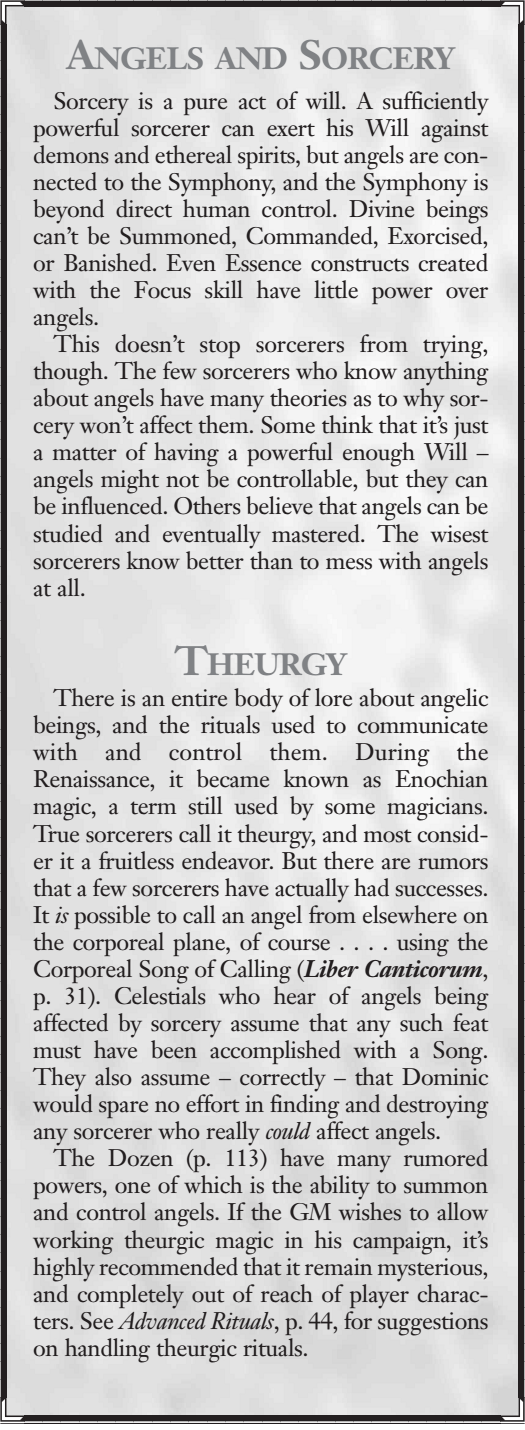
Anyone who can do sorcery is a sorcerer. To become a sorcerer, there's only a few requirements. First, you need to be human. Second, you must have at least 6 Forces, with at least 1 in each realm. Third, you must be Symphonically are. Fourth, you must have a Will of at least 6. Fifth, you must have the Sorcery attunement. And, to do any rituals, you must know at least one sorcerous skill. Get all that, and you can do sorcery. The sorceryous skills are useless if you can't perform sorcery, except to teach others. They have no practical uses. There are five of them: Banishment (to force demons or ethereals back to their home planes), Command (to exert your Will on others), Exorcism (to force demons and ethereals out of their hosts or vessels and to destroy ghosts and undead), Focus (to shape Essence into useful things, store it or drain it) and Summon (to call beings from other placeS). These skills are used to perform the rituals that are the heart of sorcery. There are many sorcerous traditions, all with their own techniques. The same ritual done by each tradition might be performed very, very differently. Most of the occult lore surrounding these rituals is not true sorcery, and many rituals you can read about will do nothing even for a sorcerer. Likewise, a real ritual will do nothing if not done by a sorcerer. Each ritual must be learned individually, and it's up to the GM to determine how long that takes. Rituals are guarded closely by sorcerers, and the book suggests at least a month of study - more, without a teacher, but less with a demon teaching via Infernal Pact. One ritual per level in a sorcerous skill is 'about the right rate.' Non-sorcerers can learn and teach rituals, but cannot use them. Some magicians do this unwittingly, while demons and etherals often learn rituals so they can trade them to sorcerers for service.
The details of a ritual's performance are based on your tradition. The outcome is the same no matter how you do it, however. Each ritual also requires Essence expenditure, even if it fails. This Essence expenditure produces the only Disturbance the ritual creates, however, on their own. (Summoning a demon to Earth will produce Disturbance as normal, though - just not the summoning ritual.) Unlike Songs, you cannot alter the range or duration of the ritual. They must run their course when invoked and cannot be canceled. However, they can be negated by a counter-ritual by anyone who knows the first ritual, requiring a contest against the roll made to invoke the first ritual. Counter-rituals are the only way to end a ritual permaturely, even if you were the caster. All use of sorcery is considered favorable for Infernal Intervention and unfavorable for Divine Intervention except for those very few sorcerers who are truly and firmly on Heaven's side. These sorcerers are very rare. Sorcerers often band together in cabals in order to pool Essence for rituals. Not every tradition allows group rituals, but those that do may pool their Essence. The roll is made against the lowest skill of any performer, and any assistants must also know the ritual. There can be assistants up to the lead sorcerer's skill level, who may contribue Essence, as well as up to 10 times that number in spectators who may also contribute Essence - 1 Essence if Symphonically aware, even celestials, and 1 Essence per 10 mundane spectators contributing.
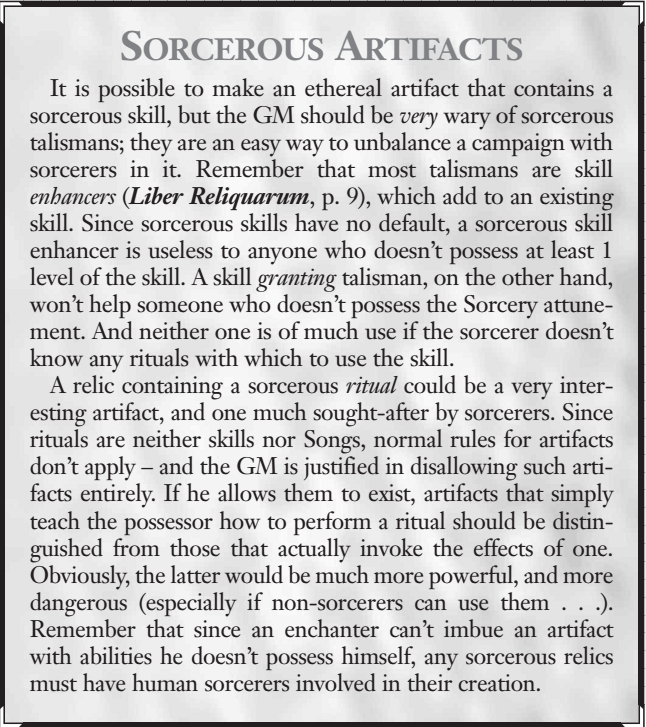
Banishment Rituals...well, there aren't multiple. There is only one.
Banish , often known as Interdictio. The target must be present for the entire duration, and cannot attack the sorcerer until the ritual is complete, but can leave or get others to attack. The ritual forces a demon or ethereal back to their home plane, and can force a ghost or dream-shade to move on to their final reward. You can't Banish something unless you know a ritual to Summon it, but you need not have any Summoning skill. At Banishment/1, you can only banish ghosts, dream-shades or ethereals. Demonlings is level 2, demons is 3. Banishing ethereals by by name is 5, and banishing demons by name is 6. Banishing by name means the target can't add their Celestial Forces to resist. Normally, the ritual is a contest of your Banishment skill and the target's Will + Celestial Forces, see. If you win, the target is immediately returned to their native plane and cannot return to Earth for (CD) days. If you fail, you can't try to banish them again for (CD) days and open yourself ot a Will-war if they feel like engaging you. A ghost that is successfully banished cann ever return to Earth - they travel on to Heaven or Hell as appropriate. A dream-shade is banished to the ethereal from Earth as per an etheral spirit...but if banished from the ethereal, it is forced to move on as per a ghost. Ghosts and dream-shades cannot invoke a Will-war on failure unless they are themselves sorcerers. The ritual takes 10 minutes to perform and costs (CD) Essence.
Command rituals are potent, but easy to overestimate - it's not mind control, and no one enjoys being commanded.
Suggestion , or Monitum, requires Command 1. One target you can see becomes susceptible to your next suggestion. They can resist with Will + Celestial Forces, and your suggestion must be plausible andn ot obviously against their interest, but can be something htey would not normally do. This takes 1 minute and costs (CD) Essence.
Command Minor Ethereal Spirit , or Imperandum Somniorum Minorum, requires Command 2. It gives you a bonus to your Will of (CD) in a Will-war against any ethereal spirit with less than 9 Forces, lasting until your next Will-war against any being. It takes 15 minutes and costs (CD) Essence.
Command Demonling , or Imperandum Diabolorum Minorum, is the same but requires Command 3 and givesa bonus against imps, gremlins and familiars.
Awe Demonling , or Terrendum Diabolorum Minorum, requires Command 4 and gives a bonus of (CD) to the reaction roll against an imp, gremlin or familiar. It costs no Essence and takes only one round to perform.
Command Major Ethereal Spirit , or Imperandum Somniorum Maiorum, is identical to the minor version, but works on ethereals with 9+ Forces, requires Command 5 and costs (CD+3) Essence.
Awe Demon , or Terrendum Diabolorum, requires Command 6 and is identical to Command Demonling, save that it works on full demons.
You will note the lack of a ritual to improve your chances against full demons.
Exorcism rituals require the target be present for the entire duration. They target cannot directly attack the user until the ritual ends, but can leave or get others to attack.
Exorcise , or Expulsio, takes Exorcism 1-4 depending on what you are trying to exorcise. It forces a demon or ethereal to leave their host or vessel. This is a special kind of A Will-war, with a TN for the sorcerer of (Will + CD). The subject may not break off the Will-war, and if you lose, you are bound to them as a Servant as usual...but if they lose, they are instead forced out of their current vessel or host, regardless of any bindings, and may not return to it for a full year. They can use a different essel or host, but must otherwise return to their home plane or to Limbo. Against ethereals with 8 or fewer forces, it's a level 1 ritual. For demons up to 7 forces it's level 2. For ethereals with 9+ forces it';s 3, and for demons with 7+ forces it's four. Dream-shades who have come to Earth casn be exorcised as per ethereals of the appropriate power. You need not know what kind of being you're exorcisng, but will take appropriate penalties if your skill is too low. If you fail, you cannot attempt to exorcise that target again for (CD) months. This takes one hour and costs (CD) Essence.
Exorcise Ghost , or Expellendum Manium, requires Exorcism 1. Ghosts cannot norally participate in Will-wars unless they are sorcerers, but they may be exorcised by usuing this ritual to destroy their hold on Earth. This is conducted as per Exorcise, with the following differences. First, if you lose, you do not become the ghost's Servant. However, you may never attempt to exorcise that ghost again. Seocnd, if you win, the ghost is destroyed forever. Their Forces disperse, and they do not travel to their final reward. For this reason, many angels and humans would prefer banishment of ghosts to exorcism. Finally, at the end of the ritual, regardless of outcome, all lost Will is restored. This takes 10 minutes and costs (CD) Essence.
Exorcise Undead , or Expellendum Larvarum, requires Exorcism 3. They are a viable target due to their infernal Forces. Undead cannot normally participate in Will-wars unless they are sorceers. The TN for this ritual is (Exorcism+Necromancy) skills. If you succeed, you exorcise an undead exactly as per Exorcise Ghost with the same results. Zombis, as a note, have no Will and so automatically lose any Will-wars - successful performance of the ritual instantly destroys them. This takes 10 minutees and (CD) Essence.
Focus rituals allow you to store or drain Essence and create Essence-constructs.
Symphonic Awakening or Excitattio requires Focus 1. It is unique, in that it does not require the Sorcery attunement to perform. It makes its user or target Symphonically Aware, and in fact does not require even the Focus skill, but does give a penalty if you don't have it. The target, whoever it is, must have at least 6 Forces. The TN is the target's total Forces plus your Focus skill. If you succeed, the target becomes Symphonically aware. CD 1 also knocks them out for several hours from traumatic awakening, while CD 6 is smooth and almost instantaneous, with no trauma. A failure means you can't do the ritual again for that subject for (CD) days. If the ritual is done by a non-sorcerer, it instead cannot be done again for (CD) months. This takes 1d6 hours and costs (7-CD) Essence, minimum 3.
Protective Ward or Tutela requires Focus 1. It wards an area against or contains within it ethereal and celestial beings. The area is a radius of up to 10 feet, though not necessarily circle-shaped. You must demarcate the area somehow, such as with walls or chalk. Large areas can be warded via multiple ritual performances, each of which expands the total allowed radius by 10 feet. The ward is an invisible energy field that physically blocks ethereals, demons and angels, even those in vessels. It does not block use of resonance, attunements or Songs, nor does it stop any other beings. Angels can easily bypass this via a roll of Precision + Ethereal Forces, once per round. Demons and spirits must instead wear the ward down by forces, rolling Will + Celestial Forces and doing damage equal to the CD. Angels may choose to do this but do not have to. The ward can withstand (10*CD) damage and lasts for (CD) hours. It takes 15 minutes and costs (CD) Essence.
Sacrifice for Essence or Potestas Caede requires Focus 2. It kills or destroys something that contains Essence, giving it to you. A living being must be killed, an artifact physically destroyed. If the ritual works, you gain (2*CD) Essence or however much the target had, whichever is less. If this is more than you can hold, the excess drains off into the Symphony unless you have a reliquary or spirit jar to store it in. This takes 30 minutes and costs 1 Essence.
Store Essence or Deponendum Potestatis requires Focus 3. It is a ritual to create a spirit jar, which acts as a temporary reliquary with high acapcity. Physically, the jar must be a small sealable container - a jar, bottle, box or bag of some kind. If you succeed, the container is linked to you, and may be activated at any time by some means defined by the ritual to create it. Once activated, it can receive Essence for 1 hour or until you take Essence back out - after that it can't have Essence added to it any more. Essence can be stored only from the creator of the spirit jar, though the sorcerer can gain that essence and transfer it from other sources. The jar may hold (5*Focus skill) Essence for (CD) days. Only the creator can remove Essence from it, though other sorcerers may use Sacrifice for Essence on the jar. Any Essence remaining after the duration ends leaks into the Symphony without Disturbance. Once the duration ends or all Essence is removed, the jar becomes inert but can be reused in a new ritual. This takes 4 hours and costs 1d6+3 Essence.
Create Spirit Anchor or Ancorae Animae Creatio requires Focus 4. A spirit anchor is a phyiscal object that may trap an ethereal or celestial spirit. The object can be anything at all, but most sorcerers prefer small and portable items. An anchor can contain a spirit with total Forces up to (2*CD). It must be brandished against a spirit you can perceive, which must be in celestial form or on ethereal plane (in which case the anchor must be an ethereal or celestial artifact). A spirit in a vessel cannot be trapped. Angels and relievers are immune to spirit anchors, as are any demons with Hearts. The target resists with Will + Celestial Forces, and if they win, the anchor loses its power. If they lose, they are trapped within it. Spirts in an anchor can do nothing but regain Essence and talk to the sorceer. The more Celestial Forces the spirit has, the shorter the period they can be contained for. At the end of the duration, the anchor may be kept active by performing the ritual again for no time or Essence. The spirit may spend 2 Essence to roll to resist again. Once a spirit successfully resists, the anchor loses its power, and if the anchor is destroyed, the spirit goes free. Celestial Forces 1 can be trapped for 3 months per use, 2 for 1 month, 3 for 2 weeks, 4 for 1 week, 5 for 3 days and 6 for 1 day. This takes 2 hours and (2*CD) Essence.
Siphon Essence r Ducendum Potestatis requires Focus 5. The next being you touch must roll Will+CElestial Forces or lose (CD) Essence, or however much you had or however much the sorcerer can actually hold, if that is less. On a failure, however, you lose (CD) Essence on top of the ritual's cost. This takes 1 minute and costs 2 Essence.
Permanent Ward or Tutela Sempiterna requires Focus 6. It is identical to Protective Ward, but can have a radius of 50 feet per performance and requires 100 damage to destroy. Even after it is destroyed, any sorcerer with the Focus skill can revive it by spending half the Essence needed to create it. The CD of the ritual is the number of times the ward can be raised before it fades out forever. This requires 24 hours of ritual during which you may not eat, drink or leave the ward's confines, and costs (3*CD) Essence.
Summoning rituals are not inherently evil, but demons are rarely summoned for benign purposes and even etherals are dangerous. These rituals tend to be long and exhausting, and they grant no power over the summoned being. If the being reacts poorly, you need a Will-war, temptation or threat to get them to help you.
Summon Random Ethereal Spirit or Appelandum Somniorum requires Summon 1. It pulls a random ethereal out of the Marches to your location. If you are on Earth, the spirit will arrive in its vessel (and will be a spirit that has one). This can only be done in the Marches if you are a lucid dreamer or can otherwise travel to the ethereal, in which case the spirit may or may not have a vessel. The spirit has (CD) Forces. If on Earth, it appears within 1d6*10 minutes, and in the Marches it appears in 1d6 minutes. This takes 30 minutes and (CD) Essence.
Summon Demonling or Appelandum Diabolorum Minorum requires Summon 2. It pulls a demonling out of Hell, with (CD) Forces. The GM determines what kind of demonling it is and if it has a vessel or just appears in celestial form. It arrives in 1d6*10 minutes, or 1d6 minutes if summoned at an infernal Tether. This takes 15 minutes and (CD) Essence.
Summon Human Soul or Applendum Animarum requires Summon 3. It summons a human soul on the same plane as you to your location, which means usually only ghosts, though a sorcerer in the Marches could summon dream-shades. The soul may resist with Will + Celestial Forces - CD. If they fail, they must go to your location as quickyl as possible, which could be minutes or weeks depending on on where they are. This could theoretically be done in Heaven or Hell to summon a Bodhisattva or damned soul, but it'd piss off angels and the damned usually don't have freedom to travel. The GM may optionally allow this ritual done at a Tether to summon a soul from the realm the Tether links to. This takes 15 minutes and (CD) Essence.
Summon Random Demon (of a Specific Type) or Appelandum Gentium Diabolorum requires Summon 3. Each type of demon has a specific ritual. Types are usually but not necessarily Bands - Summon Succubus exists and might summon a Lilim, Impudite or Balseraph depending on the ritual and tradition. Type can also be a Superior's Word, so you can summon Demons of Lust or whatever. If the type is the Band, the demon serves a random Prince. If it's a Word, the demon's Band is random. The demon will have Forces of (6+CD) and arrive in 1d6*20 minutes, or 1d6 from an infernal Tether. It is up to the GM whether the demon has a vessel or not. Most will treat a summons as a free vacation, with their first plan being to torture or enslave their summoner. This takes 1d6 hours and (demon's total Forces) Essence.
Summon Named Ethereal Spirit or Appelandum Nomine Somniorum requires Summon 5. It summons a specific and named ethereal from the Marches. It must be a spirit with a vessel unless you are in the Marches. The spirit will arrive in 1d6*10 minutes on Earth or 1d6 minutes in the Marches. Very potent spirits such as the old pagan gods cannot be compelled to appear - the ritual just asks them to show up, and they can ignore it as they please. This takes 2d6 hours and (spirit's Forces - CD) Essence.
Summon Named Demon or Appelandum Nomine Diabolorum requires Summon 4 or 6. You must know the demon's true name, and if you succeed, the demon must resist with Will + Celestial Forces - CD or drop whatever they're doing to answer it. If they are already on Earth, this is a level 4 ritual and the demon will arrive via whatever normal means are available, making all haste to your location, which could take a while. They may delay answering the summons for a day with 1 Essence and a Will + Celestial Forces - CD roll, but can only try once per day. If the demon is not onb Earth, the ritual is level 6 - and you don't have to know that when casting. The demon will arrive in 1d6*20 minutes, or 1d6 at an infernal Tether. Most demons will be quite annoyed to be pulled from their work and can inform others, even their Prince, of where they are going and why, though many will be too embarrassed to admit to being caught by a summoning ritual. The base reaciton roll is at -3, and you have no control over how much Essence the demon has. Generally, this goes poorly for you unless the demon already likes you. If Hell did not know you existed before, they do now, and ASmodeus dislikes this ritual intensely, usually sending demons to destroy summoners, though it can cause conflict with Hatiphas, demon of Sorcery. This takes 1d6+2 hours and costs (demon's total Forces - CD) Essence.
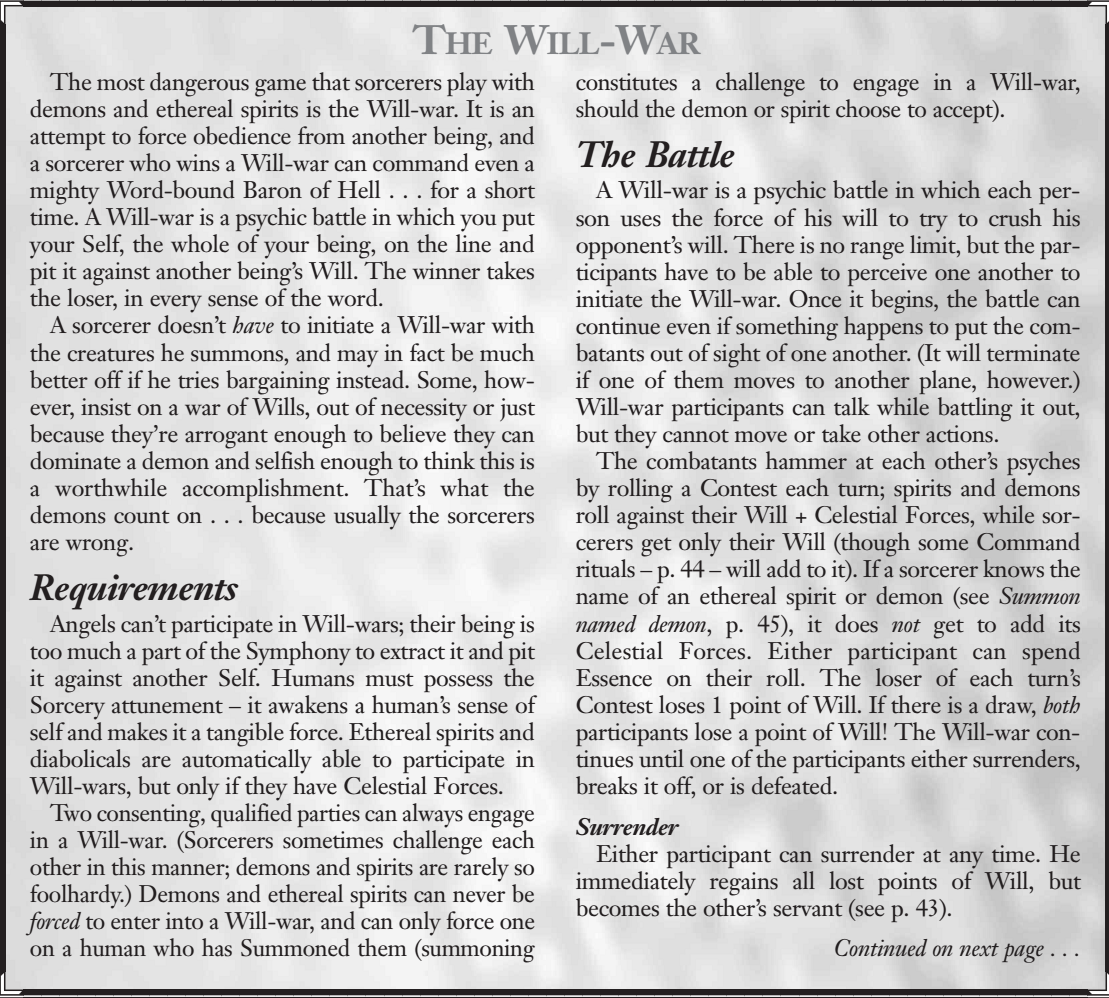
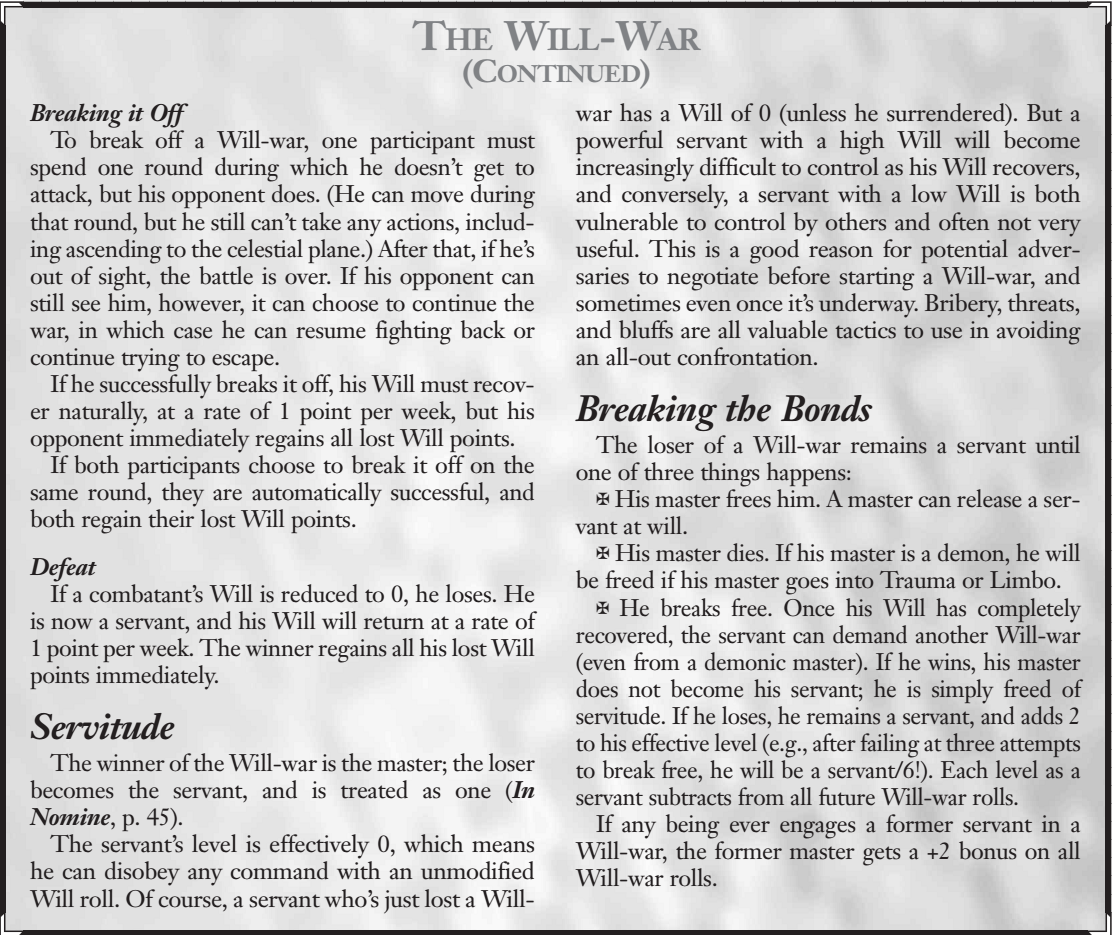
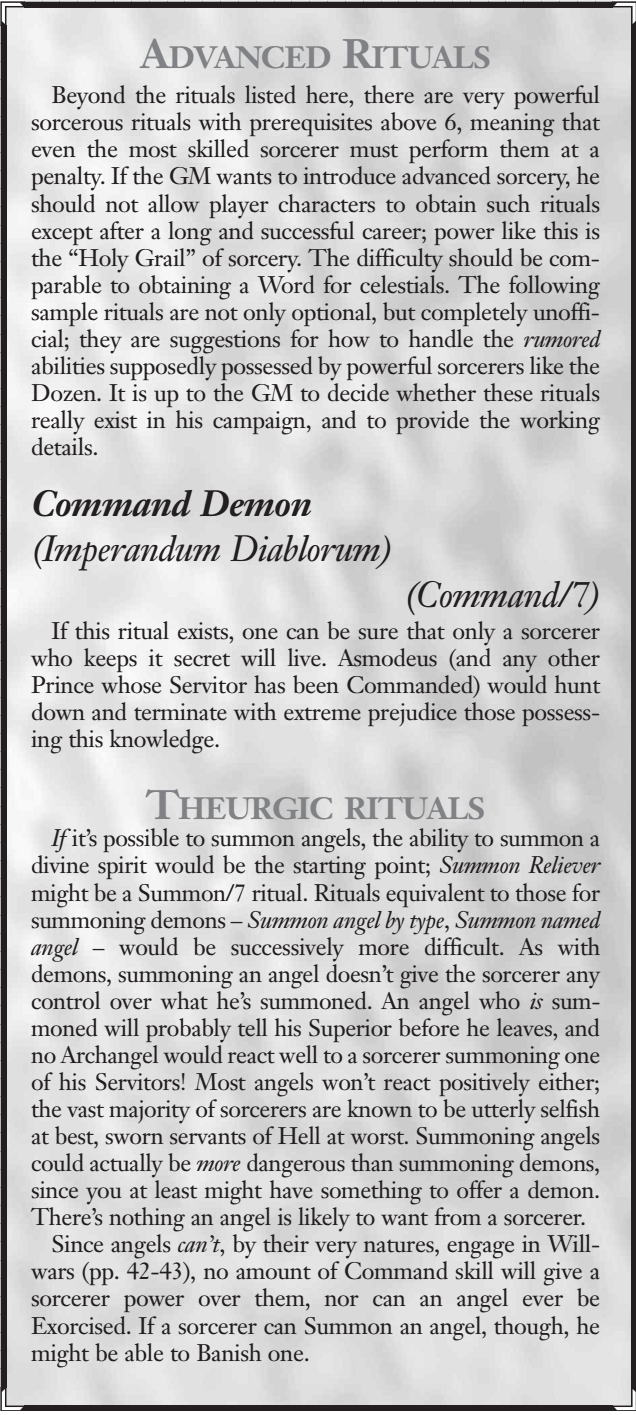
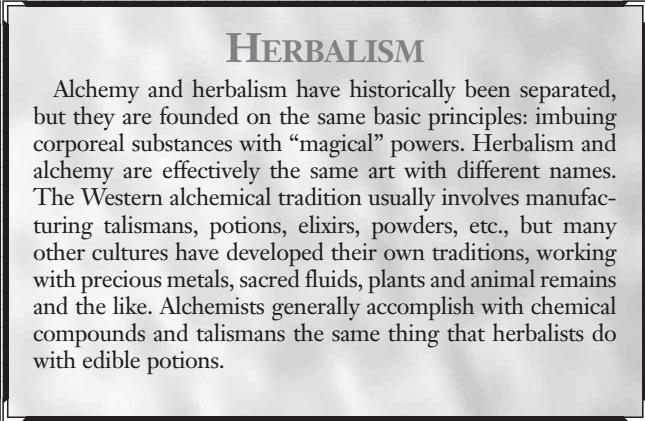
Sorcerous Initiation is a unique ritual, which need not be done by a sorcerer...but it's much safer when it is. There are many kinds of initiation, all of which are complex and arduous. The GM should determine the details required to go through with the ritual. You do all that, and if you meet all other requirements to be a sorcerer, you make a Will roll. Success gives the Sorcery attunement. Failure means you can't try again for (CD) weeks. On a failed CD 6 or any failure when initiating yourself without a sorcerer's help, you permanently lose 1 Will. If the ritual fails due to you not having 6 Forces or Will 6+, you also take (CD) soul damage.
So now, enchantment! Enchament is like sorcery and often done by sorcerers. It is the power to bind loose Forces into stable configurations by use of intense study and demanding rituals. It is not technically sorcery. It mainly uses the Enchantment skill, but cannot be learned by anyone with less than 6 Forces. However, it requires no attunement, and some techniques can even be done without Symphonic awareness. Further, celestials and ethereals can practice enchantment. The most common uses for it are artifact creation, alchemy, the manufacture of constructs and necromancy.
Enchanters can make corporeal, ethereal or celestial artifacts. Each artifact you know how to make is a separate ritual and requires knowledge of any skill or Song to be embedded within the artifact. You add your Forces in the appropriate realm to your Enchanmtnet skill to get the base TN, and more on this is in Liber Reliquarum. Alchemy is quite similar - it's the process of imbuing physical substance with Songs or sorcerous rituals. The difference is that alchemical creations do not contain Songs - they contain the effects of the Song or ritual, waiting to be unleashed. They are easier to make, but less potent and always limited in use and lifespan. Alchemical rituals require the Alchemy skill, with the base TN equal to Enchantment + Alchemy. Sorcerers can perform alchemy without the Enchantment skill, though it is much more difficult, and non-sorcerers must have at least 1 level of Enchantment.
Alchemical creations each require their own ritual. There are many such formulas, some known commonly and some secret. They follow largely the same rules as sorcerous rituals. Most embed a single use of a skill, Song, attunement or ritual. The object is then used, and the conditions on which to release its power are determined by the ritual. The alchemist must have whatever resource is being embedded, and it takes 1 day per level of the resource, which cannot be higher than you have it. Attunements require a full week. At the end of that time, you roll against the relevant skill, perform the Song or ritual, or use the attunement. You spend all Essence this owuld normally take and make the roll for any power that needs one, noting the CD. Failure means the ritual was a waste of time. Success then requires you to roll Alchemy + Enchantment, and if you succeed, the item is imbued with one use of the resource. Failure means all time and Essence was wasted. An alchemical creation holds its charge for (CD) weeks and then becomes a mundane item.
Examples: You might make a one-shot Dodge talisman, adding your Dodge roll's CD to a single Dodge roll made by the wearer. You could make a healing potion via the Corporeal Song of Healing, rolling the Song and making the drinker heal however many HP your Song would have healed. A Love Charm can be made to replicate the Ethereal Song of Attraction, and so on.
Next time: Constructs
I made him in my lab
Original SA post Corporeal Player's Guide: I made him in my lab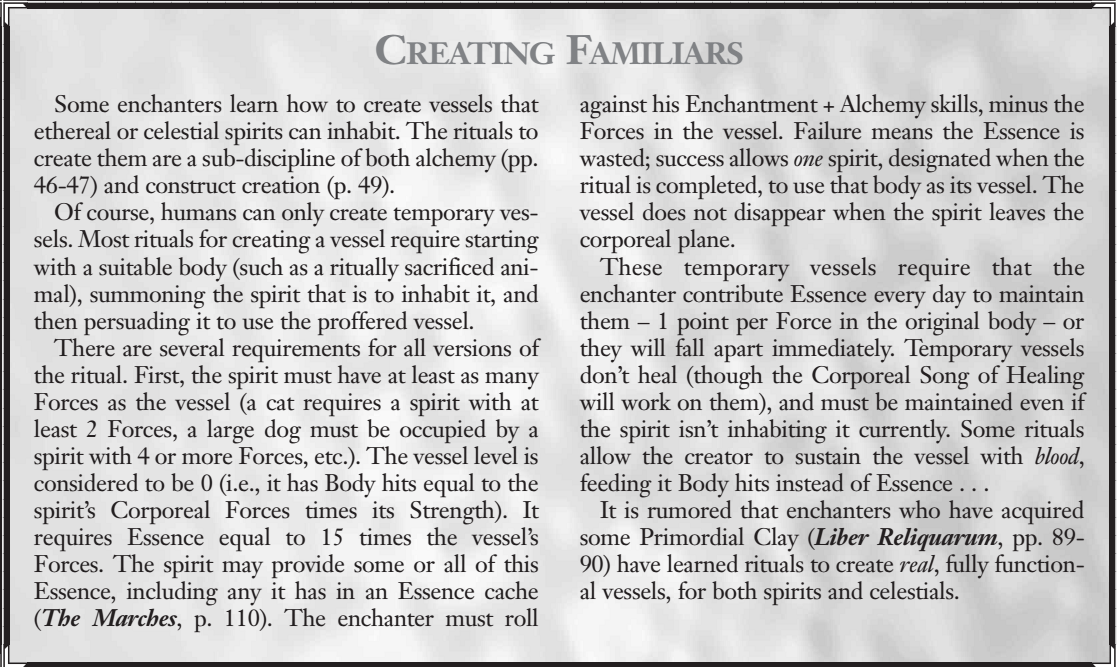
Constructs are inanimate bodies, given artificial life. They are also known as homunculi or golems. Their full history is given in one of the Revelations books. Constructs can be made of nearly any material. Those that are made of flesh must eat and drink once a week. All constructs are immortal and have GP based on the material they were made from. Flesh constructs heal at double human rate, while others can only be repaired by their makers. Constructs have a maximum of 4 Forces, with no more than 1 Ethereal or Celestial Force. For each Force a construct has, it must have one principle, a guiding oath that functions similarly to a Malakite oath. Each time a construct violates a principle, it gains 1 level of Discord, often Berserk or Murderous. If a construct's total Discord ever exceeds its total Forces, it implodes in a flash of light and puff of air. Constructs gain Essence once a day at noon and may use their Essence consciously, though only those with Celestial Forces are truly Symphonically aware. No construct may ever transfer Essence to others. Constructs can learn skills, and those with at least one of each Force type can perform Songs. They may never receive attunements or Distinctions. Constructs made entirely by humans do not cause Disturbance, but if a celestial has anything to do with their creation, even telling a human how to make them, then their actions are the result of celestial intervention and will cause Disturbance.
Learning to make a construct requires years of study under one of the few living construct-makers. The process requires 2 months per Force of the construct, and as one of the final steps, a strip of parchment with the name of the construct's master is prepared. The master need not be the creator. The construct must always obey its master, and constructs with no Celestial Forces will be rendered permanently inanimate if this sign is ever removed or destroyed. Those with Celestial Forces become free-willed but often highly unstable. The construct requires one or more Enchantment rolls to make and costs (3*Total Forces) Essence per roll. Failure on any roll means all time and Essence has been wasted. Constructs containing only Corporeal Forces require only a roll against the maker's Enchantment + Corporeal Forces. These constructs can only perform simple, repetitive tasks. Adding Ethereal Forces makes a construct intelligent but not self-aware. This is arare secret even among construct-makers and requires a second roll against Enchantment + Ethereal Forces. Very few construct-makers know how to grant Celestial Forces. Archangel Eli is known to have figured the secret out but has never taught anyone else. Any construct with Celestial Forces must be primarily composed of flesh. These constructs are self-willed but remain obedient to their masters. They may perform Songs and perceive the Symphony. This requires a third roll, against Enchantment + Celestial Forces.
Necromancy, meanwhile, was first discovered by the ancient Egpytians, who also made the first constructs, thousands of years ago. Saminga became Prince of Death by mastering the art, and while he claims it as his own, there are still some rare necromancers that do not serve Saminga. He tends to try to kill them. Necromancy is similar to making constructs in that it binds Forces into a corporeal body. However, no one but a Superior can attach a Force to a living mortal - anyone else that tries inevitably kills the victim. That's how you get undead. Necromantic rituals require the Necromancy skill and are done against a tN of Necromancy + Enchantment. As with Alchemy, sorcerers can do Necromancy without the Enchantment skill, but non-sorcerers cannot. There are only two well-known necromantic rituals, but each comes in many variations, like sorcerous rituals. They all follow the same rules for the most part, however.
Create Zombi or Recreandum Cadaveris animates a corpse after the soul has already left. Any fresh corpse can be used - defined as not beyond the earliest stages of decay. You roll against the total Forces the body had in life, and spend that much Essence. This takes (7-Necromancy) hours. Success raises the corpse as a zombie in (6-CD) hours. Failure wastes the Essence, and the corpse may never be zombified, ever, by anyone. Zombies created this way are not automatically your servants, but because they have no Will, they are fairly easy to order around anyway. Saminga's attunement to make Zombis is essentially an instant version of this.
Create Mummy or Conversio In Immortalem is the way most necromancers seek to become immortal. The ritual turns a human into a mummy...hopefully. The subject must be willing, and also aware that their soul will quite literally be lost. Without this knowledge and consent, no ritual can succeed. The mechanics are simple - you roll Necromance + Enchantment - subject's total Forces. Yes, you can perform it on yourself if your tradition's ritual makes this feasible. This takes (Total Forces) days and three times that much in Essence, which the subject can help pay for. On a success, the CD must exceeed the subject's total Forces before the new Force is added. Servitors of Death get a +2 bonus to the CD, and anyone else with an attunement or Rite from Saminga gets a +1. However, using the bonus means Saminga is automatically aware of the new mummy. If the CD is high enough, the subject becomes a mummy and gains a Force. If the CD is too low, the Force binds improperly and destabilizes the target as it peels away. The necromancer may attempt to hold the subject's Forces together with another roll of Necromancy + Enchantment - total Forces. If successful, the target becomes a vampire. If unsuccessful, the target loses 1 Force and becomes a zombi. If the first roll fails, the target just dies, lsing (CD) Forces in the process. If anything is left after that, though, the corpse can be raised as a zombi.
So, now we get into character types. Mundanes are ordinary humans with no speciual powers, though some may know of the War. Most people do not. They have only five Forces and are easily dismissed by most celestials, who believe them uninteresting and unhelpful, but also unthreatening. These celestials are wrong. Humans en masse control the War's ebb and flow, not the other way around. The emotions and behavior of each human powers Words. Humans determine whether Tethers form or not. And while it may be easy to push one of them around, several dozen are a problem even for celestials, especially if Disturbance is being avoided. Individual humans can also be shockingly capable. Most are average, but the occasional above average person causes real trouble. Demons who assume mortals are fodder learn the hard away what happens when they run into someone with strong Will, and high Perception can ruin your day if you hoped to avoid notice in celestial form. Some mundanes have a special knack for being useful or trouble.
Servants and minions, for example, are those who are bound to a celestial's will and service. They are all chosen for their use, whether they are rich and powerful or just in the right place. Some are more aware than others - angels tend to tell more than demons do, but few tell everything. Demons often lure servants with greed, while angels prefer to find willing recruits, but the religious often find it hard to reconcile their beliefs with the truth of the War. Some have no idea they're even serving non-humans at all.
Investigators, on the other hand, are those that poke around in celestial business. Unsolved crimes can attract very determined and curious investigators that can cause all kinds of trouble - which can destroy Roles. And cops aren't the only problem. You also get occultists, New Agers and paranormal researchers, who often unknowingly end up involved in the War as they poke into apparently supernatural events. Most are flakes, but some can be very canny. They may have incorrect ideas, but they can be good at tracking down the truth - which some celestials watch for, knowing the real information they can gain from the apparent nonsense. It's very embarrassing when a Malakite invades because some ghost hunter posted on the Internet about haunted houses. And some investigators get started after they witness an event. That's why you want to avoid supernatural battles in public - you get a lot of witnesses. Sure, there are cover up teams, but the more witnesses there are, the greater the chance one avoids notice. And they can be a huge problem. A victim of Shedite possession might bury the memories for years, a child who sees an angel may never be believed - but there's no way to predict what those events will do to someone's life. Some might become investigators, others Soldiers. Someone who's witnessed demons will certainly be tougher to manipulate by anyone they believe is demonic, and someone who saw an angel may refuse to believe in angels that don't fit their memory.
Then you've got magicians. 'Magician' is a deragotory word used by celestials and sorcerers for those that try to do 'magic' in ignorance - no matter how they do it. Some may have witnessed actual supernatural power, but most are just clueless, and none of them have any real power. Sometimes sorcerous cabalso r demons sponsor magicians, letting them play at useless magic while the inner circles watch for those who have the potential for real sorcery or use as Soldiers. For the most part, magicians are ignorable, but there's always the danger that one of them stumbles across sorcery on their own.
Extraordinary mortals, those with 6+ potential Forces, are still mundane...but they are potential Soldiers, sorcerers and wildcards. They are always of interest. Those who are of 6 Forces naturally are the most valuable of all - they can be made into a Soldier without either the knowledge or intervention of a Superior. And the trick is, they're exactly like anyone else, just more capable. The main thing is that if they witness the supernatural, they're probably drawn into it due to their potential surfacing. How that happens and who notices can make all the difference.
Now, you don't actually need extra Forces or powers to serve in the War, and many mundanes serve Heaven and Hell openly. Their work shouldn't be dismissed - but the humans who get all the attention and glory are the Soldiers. They are those who have at least 6 Forces and have knowingly joined the War. All are Symphinically aqare, able to hear Disturbance and control Essence. That's what makes them valuable. There are three kinds of Soldiers: Soldiers of God, who serve an Archangel, Soldiers of Hell, who serve a prince, and pagan Soldiers, who serve an ethereal god. Most Soldiers have 6 Forces. Those with 7 are quite rare, and only the most elite have 8 Forces. Most Superiors do not have even one 8-Force Soldier, and even fewer have a Soldier with 9 or more Forces. Most Soldiers have at least 2 Corporeal Forces, and those who are recruited and given a new Force to reach 6 are always given a Corporeal Force if they only had one of those. Those who naturally have 6 do not always end up with 2 Corporeal Forces, however.
Both sides use recruiters to identify potential. They're not always easy to spot. Those who can already control Essence and use Songs are obvious recruits, sure, but they're rare. Impudites of Technology or anyone that knows the Ethereal Song of Essence can measure someone's current Essence, which will detect high Force count...if they're full at the time. Kyriotates, Shedim and anyone using hte Song of Possession can tell how many Forces someone has by possessing them. These methods only detect those that already have 6 Forces, however. They are valuable, but the minority of Soldiers. Most Soldiers start with 5 and potential. There are only three surefire methods to identify this potential. Seraphim of Creation, who can recognize the gifted, can gauge someone's potential, unrealized Forces with a CD of 6. Yves' Divine Destiny attunement will identify anyone whose destiny is to serve Heaven. Kronos' Fated Future attunement will identify anyone whose fate is to become Hellsworn. That's it. No other sure methods. Once a potential Soldier is spotted, they need to be recruited and initiated. Angels and demons handle these steps quite differently, however.
Soldiers of God are gifted with concrete knowledge of Heaven and the power to serve God directly. They are also given the chance to risk their lives fighting Hellsworn and demons. They are extraordinary people, and not just due to their Forces. Laurence, as Commander of the Host, is nominally in charge of all Soldiers of God. Most enter the service of one Archangel or another, but all are made aware of Laurence's authority, and any angel that inducts a Soldier is expected to inform a ranking Sword angel so that Laurence can be made aware of the new member of the roster. (Creation and the Wind tend to neglect this stuff, however.)
Angels are always looking for humans passionate and selfless enough to serve Heaven. They must be careful, however - they know that the only thing demons like more than finding Hellsworn is corrupting or killing potential Soldiers of God. When an Archangel learns of a potential Soldier, they usually assign a Cherub to guard the human while other angels investigate. Laurence even has standard procedures, including a full covert evaluation by a Malakite, Elohite and Mercurian. By the time a human is approached, their recruiters often know them better than they know themselves. Ideally, a Soldier's attitude and capabilities are matched with the most appropriate Archangel and they are contacted by an angel serving that Word. Politics can preven this, however. Angels of War never send anyone to Dominic or Yves, for example, and while Laurence tries to be impartial, he only rarely sends anyone to Flowers. Of course, many Archangels tend to recruit in areas moer suited to their own Words. First contact varies according to the recruiter and the human. Mercurians are most commonly used, followed by Elohim, then Seraphim and Malakim. Those that already believe in angels are easier to recruit, while skeptics and atheists are quite difficult. Sometimes, it takes months of building a relationship and slowly drawing them in, while other times it takes only a look at an angel's celestial form. Most Archangels frown on recruiting the unwilling, however - they're likely to turn traitor. Sometimes a potential Soldier who lacks in virtue might be strongarmed into cooperation and given only partial truth until they are reformed. The truly irredeemable are a problem, though. Malakim often like to kill them, but other angels tend to balk at that. Of course, sometimes you just don't have time for background checks and soft sells. Sometimes, it's a crisis and you figure it out as you go.
Once a Soldier candidate is recruited, they must be made a real Soldier, which means getting a 6th Force. Those who have 6 Forces only need a Symphonic awakening - easily given by an ARchangel, or you can try a ritual to do it on your own. Most angels who know the Symphonic Awakening ritual do it at a Tether and spend Essence to ensure success. Humans who still need to get a 6th Force, however, need to gain one. Sometimes that means intense training to bring out the latent Forcen aturally, but that's arduous and uncertain. An Archangel can give the Force easily, though. Any Seneschal or Wordbound can request a Superior add a Force to a living human at a divine Tether, which requires minimal attention from the Archangel and is usually granted without even a personal appearance. There may or may not be a formal ceremony involved, and Malakim as well as any angel of the Sword tend to like solemn vows, but others, like the Wind or Flowers just slap a human on the back and congratulate them.
Soldiers of God are often taught attunements or Corporeal Songs, much like angels are, though to earn an Archangel's servitor attunements tends to require they do something great to earn them. Laurence is the exception to this. He will offer his attunements freely to any Soldier, regardless of which Archangel they serve, asl ong as he is aware of them. Humans do not normally gain Choir Attunements, as ARchangels never strip an angel's Forces to give to a Soldier unless the angel volunteers it. In that case, however, it is possible.
Serving God is not easy. Soldiers of God are never off-duty and are expected to drop anything and everything to help when needed - even family and friends. Some angels are more accommodating about this than others, but all of them expect the War to be your top priority. If you aren't independently wealthy, being a Soldier can fuck up your career, and even if you are, it will fuck your social life. There's a comfort in serving Heaven, but it's also lonely and frustrating at times, as well as dangerous - you're a prime target, after all, and so are your friends and family. Demons will stop at nothing to demoralize and corrupt you, and if they fail, they'll send Hellsworn to kill or kidnap you. Soldiers of God must usually work covertly to avoid attention. Most serve an angel directly, though not always as a literal servant. Angels in charge of Soldiers are usually fairly low-ranking, and Wordbound are usually too busy for the job. Almost never does a Soldier report directly to an Archangel - most only ever meet an Archangel once in their life, and only because several Archangels try to attend swearing-in ceremonies when they have the chance. Sometimes, a Soldier will work under another, more experienced Soldier, who may even run a cell or small operation without consstant supervision. This is especially true of Creation, Fire and the Wind. There's always at least one angel in contact with the senior Soldier, however. Occasionally, Soldiers will form their own organizations, such as the Muradi Sufis, the Purifiers or the Seagull Society, but they will still have celestial patronage at the highest levels, though they often operate independently. They have more autonomy, but less access to Songs and other supernatural resources.
So what are the perks of being on call to angels 24/7? Well, first, you know you're on the side of the angels. You are not guaranteed a spot in Heaven, but almost all Soldiers of God meet their destinies as part of their work. Second, your angelic friends can help you in life if you can convince them to get involved. Most like to avoid mortal affairs, but they do usually recognize that Soldiers with personal problems are less effective. They won't magically remove your credit debt or speeding tickets, but they might help you find a job, get a bully off your back or even give you romantic tips, if they're of a more Mercurian demeanor. There can be material rewards, but Heaven discourages interest in that kind of thing. They see nothing wrong with you using your power to improve your life, however, as long as it's not at the expense of others or your work for Heaven. Lastly, Heaven will teach you Songs and attunements and even hand out artifacts. Soldiers can also, rarely, receive Distinctions.
Next time: Soldiers by Archangel
Left, left, left right left
Original SA post Corporeal Player's Guide: Left, left, left right leftSoldiers of God are sworn to serve a single Archangel most of the time, but are not bound to that Archangel's Word the way a celestial servant is. They are encouraged to identify strongl with the Word, of course, but some humans prefer to think of themselves as serving God first, an Archangel second. This can ba an advantage - Soldiers can't gain dissonance, and while most Archangels frown on Soldiers acting contrary to the Word, they recognize that humans aren't angels and can do so without harm. Occasionally, a Soldier will want to switch Archangels, perhaps to have a new role or to get a boss they like better. While Archangels don't appreciate this, they won't usually try to hold onto a human against their will. Some angels may react poorly, but a Soldier can usually negotiate a transfer with relative ease.
Most of Blandine's Soldiers are Dream Soldiers and given the Dream Walking attunement along with the Songs of Dreams and Healing. They work to help keep dreamers safe and typically work in places where many people need dream therapy, such as hospitals, boarding schools, prisons or overcrowded neighborhoods. Some work to inspire dreams in the waking world, working as teachers, counselors, therapists or authors.
David's Soldiers are tough, and most often reached six Forces on their own. In fact, David typically has potential Soldiers serve as mundanes for as long as it takes to manifest that Force rather than handing it out. David never takes Soldiers with less than 2 Corporeal Forces, and they tend to be combatants and counter-infiltrators, often leearning the Songs of Form, Shields and Thunder. They are team players and often team leaders, drawn from bikers, gangbangers, militias, cops, religious fanatics, soldiers and martial artists. While David likes engineers, architects and sociologists, few meet his standards for toughness.
Dominic's Soldiers tend to be watchers and researchers, reporting on demons ather than dealing with them directly. They are widely rumored to act as a mortal branch of the Inquisition, searching out treason in Soldiers, but this is not true. Dominic may expect obedience, and his Soldiers will probably report any suspect misbehavior, angels of Judgment are much better at keeping humans honest than other humans. Dominic prefers to recruit lawyers, government agents and law enforcement, as they are in a position to track celestials in society. He prefers not to teach too many Songs, but does grant Incarnate Law to his better Soldiers.
Eli rarely formally initiates his Soldiers, and many remain unknown to anyone but him. He picks out Soldiers from those who impress him in his wandering - artists, creative geniuses or great teachers, usually. He might teach them just about any Song or attunement, including Choir Attunements, which are rumored to be given with a gift of one of his personal Forces.
Gabriel's Soldiers are always drive, passionate and minimally supervised. Gabriel recruits very little herself, and in fact is not always aware of her own Soldiers. They tend to be crusaders for justice or vengeance, or those who inspire others with their passion. They can be from any walk in life, and angels of Fire tend to handle initiations on their own and teach Songs like Charm, Light or Thunder, then turn Soldiers loose. They might have attunements only if they're lucky enough for Gabriel to notice.
Janus' Soldiers are anarchists, revolutionaries and travelers. Some are hobos or hitchhikers, traveling without any angelic contact. Others work in the corporate world so that they can reach a possession of influence to sow chaos from. Many are support personnel for the Wind, as they can maintain safehouses for the traveling angels. They tend to be very independent, since the Wind has no real organization. They often learn the Songs of Motion, Shields and Thunder.
Jean's Soldiers are micromanaged, not trusted with any responsibility, and are always monitored and supervised. They tend to be engineers, technicians and scientists working as support, monitors and researchers. Occasionally, they are counter-infiltration hackers. Jean rarely teachs them Songs and hardly even gives attunements, but often hands out useful artifacts.
Jordi has very few Soldiers - only those truly dedicated to helping animals. They tend to be hardcore animal rights activists, and while some are peaceful, most are eco-terrorists. They are typically given attunements over Songs, but are sometimes taught Harmony or Healing.
Laurence has more Soldiers than any Archangel but Michael. They are highly organized in a rigid chain of command, with angels in charge of them. The last few centuries have seen some increased autonomy as Laurence has realized sometimes humans work best on their own initiative, but each is expected to obey Laurence's strict code of conduct and to obey his angels without question. However, Laurence, alone among Archangels, has sometimes put Soldiers in very high ranks - even granting them Master distinctions and putting them in charge of angels. His Soldiers can be just about any kind of person, but he recruits heavily from military and law enforcement as well as churchs. Many are missionaries, and all must be upstanding and moral. They are given access to Laurence's attunements and the Songs of Form, Healing, Shields and Tongues.
Marc recruits many Soldiers, but they aren't very visible. They are rarely combatants, after all. They work as businessmen, bankers, corporaye lawyers, accountants and diplomats, promoting peace, commerce and ethical business practice. Most are high status people and quite rich, and they often bankroll Heaven's Earthly operations, including giving insurance and trust funds for other Soldiers. They are the only Soldiers who draw salary and earn vacaiton time. They're often overlooked, but few realize just how deeply they're embedded in the world's financial networks, and in an emergency, they stand ready to move billions of dollars to support Heaven and fight Hell. They often learn the Songs of Dreams, Projection and Tongues. Those who qualify for hazard pay may learn the Songs of Charm or Harmony, and those who perform well can get attunements or even Distinctions.
Michael has a small army of Soldiers. They serve in just about any position in human society, and while Michael has a lot of military Soldiers, he also has doctors, lawyers, priests, rabbis, bus drivers, teachers and housewives - anyone who will fight for God. Not all fight physical battles, either. They know all about sabotage and guerrilla interference with Hell. Most know something about actual combat, however, and often learn the Songs of Charm, Form, Healing or Thunder.
Novalis prefers 'Gardeners' to 'Soldiers' as a term. Hers rarely fight evil directly, but instead nurture good and try to create environments where evil cannot flourish. She welcoems any who desire peace, and her Soldiers are often some of the nicest humans in the War. They learn the Songs of Harmony and Healing quite often.
Yves' Soldiers know all about choice and consequence, and many formerly selfish or Hellsworn humans who join divine service like working for Yves to help others avoid their mistakes. Oters are just eternal optimists, believing that humans are basically good. They seek positions where they can impact the lives of those at crossroads, and they are often teachers, librarians, parole officers, priests or anyone else that can make a difference in many lives, one soul at a time. Most have attunements, and often know the Songs of Dream, Harmony or Tongues.
Soldiers of Hell are the darkest forces - those who are damned of their own will. They sell their souls for many reasons, all selfish. Some rationalize it or whine about being trapped, and some revel in damnation. All of them go to Hell, however. They all have the same requirements and abilities as Soldiers of God, but the path they take to becoming Soldiers is different, and so are the conditions of their service. Like angels, demons are always watching for potentially useful humans. They have a harder time identifying potential, though - only demons of Fate can do so reliably. This means they are less selective - they'll take anyone that looks like good raw material, even mundanes. Common criminals, psychos, the resentful and dispossessed, gang members, cultists, Satanist teenagers, anyone full of aggression that's easily manipulated. Those are the lowest and most common Hellsworn. Most are mundanes serving in petty ways, often entirely unaware of the nature of the gang they've now joined. They are treated as worthless and expendable. Those with real talent are groomed for greater service, and if they impress their demonic masters, they get a chance to become real Soldiers. They are let in on the truth and given the chance to swear loyalt to Hell in exchange for...well, whatever they deem is worth the price. Those that decline are usually killed. Unfortunately, since most of these recruits lack the potential to be Soldiers, many of those who accept die as well.
Those rare humans already having achieved 6 Forces are gold to demons - all they need is awakening, and they're good to go. Some demons initiate these Soldiers in secret, risking their Prince's anger for the power of a secret ally. Others turn the new Soldier over to their Prince in hopes of reward. Most demons create Soldiers by recruiting many 5-Force humans and putting them through terrible ordeals in hopes of triggering a manifestation of a 6th Force. This does work sometimes, even if it kills a lot of candidates. The most effectivem ethod, however, is an Oathtaking ritual. Since this is usually done on humans who may or may not have potential, the result is usually death or mummification. Some demons conduct foral initiations with great ceremony, often involving contracts or goat sacrifice. (Kobalites particularly love cheesy and extravagant Satanic ritual.) The trappings don't matter - all that's needed is that the human sides with Hell of their own will. From that point on, unless they can redeem themselves, they go to Hell when they die.
Soldiers of Hell usually have to work harder for their rewards. Demons use the promise of Sogns as incentive, but only teach them to those that do wuite well and would be more useful that way. Some Princes will give out attunements, but others will not. They are slightly more likely than Soldiers of God to have Band Attunements, however, since whenever a Prince kills a demon, using their Forces for Soldiers is a good conservation of energy. Soldiers of Hell are not, however, given much responsibility or information. They know they work for Hell, but some have served for years without ever learning their Prince's name. Veterans usually pick up some information, but they also get a lot of misinformation - demons don't want them too knowledgeable. After all, besides treachery, you know a human will give up everything they know to angelic interrogation...eventually. Hellsworn, like Soldiers of God, are always on duty. They are owned by Hell, and they almost never have normal lives unless their position in society is useful to their masters. All Hellsworn take orders - some from demons as personal servants, even. Some never meet anyone but their demonic master, while others work as part og groups, like the Hellforce or the Midnight Screamers. They may have a demonic contact or may serve a more experienced Soldier who reports to a demon. Demons in charge of Soldiers are usually low-ranking - herding humans around is not a reward. Soldiers rarely meet Wordbound after their Oathtaking unless they serve one directly, and Princes tend to have much better things to do than talk to monkeys. hellsworn humans rate each other by how often they get to meet the ranking demon in an area - a Soldier that serves a Knight or Captain is a lot higher status than one who just works for some rando. Both, of course, outrank any Hellsworn that never even meets the local demons. All demons outrank all humans, of coruse, and in theory a Hellsworn obeys any order from any demon...but some Soldiers, who are either tough, brave or really good at bluffing manage to defy demons and get away with it. Sometimes it's because they serve a higher-ranking demon and know it, or sometimes they've even managed to earn some respect. Of course, if they start flaunting that openly, they'll be put back in their place fast.
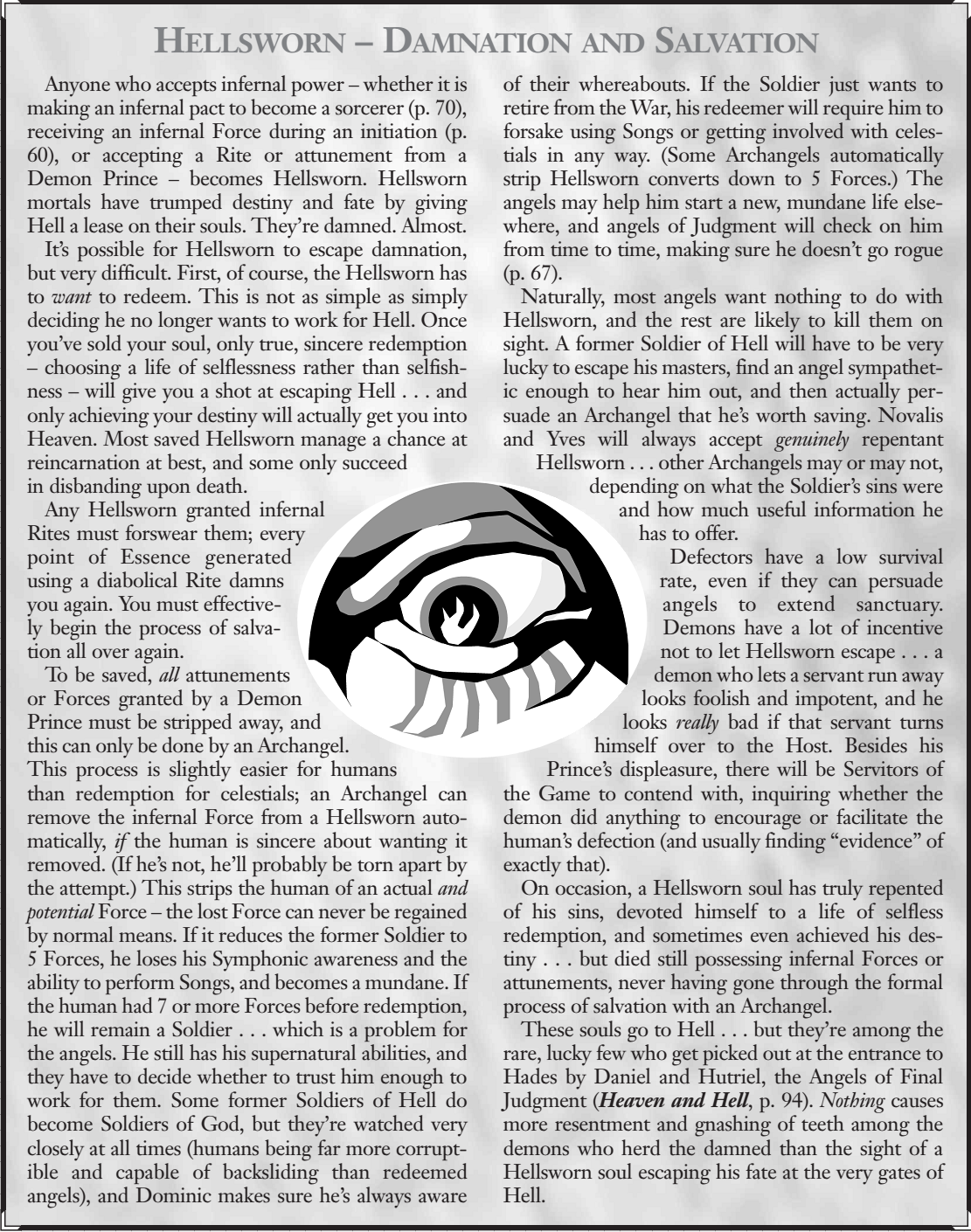
Hellsworn come in two types: rationalists and realists. Rationalists prefer to avoid thinking about their pacts or damnation. They convince themselves it's just self-interest, it's not really real - the demons are just supernatural creatures with a different worldview, Hell is just a state of mind, not a real place. Or they believe they'll escape Hell with some final prayer of forgiveness, that God will see they weren't really evil. REalists know what they've done and revel in it. Some are too insane to think about the consequences, others believe they'll be rewarded in Hell and will not suffer like the rest of the damned. All Hellsworn think they have an out - and they're all wrong.
Most Soldiers of Hlel don't even get much reward on EArth. They get their vengeance, their money, that night of passion they wanted - whatever made them sign the pact...and then the rest of their life is paying a debt that never goes away. Some receive wealth, fame or power on Earth if it'll make them more ueful - a demon can do wonders for your life or career, but only if they're going to get something from it. A truly effective Soldier can get Songs, attunements or even artifacts...if it'll be useful to Hell. They can get Distinctions but almost never do, even the most capable. Hell is very conscious of status and power, after all, and one of the core tenets of the Rebellion was that celestials are superior to humans. Giving a mortal rank over a demon causes huge resentment and makes the human a walking target. Few humans ever live to see Captain, and none would ever be Barons. Many Hellsworn believe their reward comes after death - sure, demons have to tell the truth about serving Hell, but can lie easily about what life in Hell will be like. A demon will promise power and privilege in death, that the rest of the damned will serve you, that you might even be made a demon. This is what is known to demons as the Big Lie. The turth? You get chained up with the other damned. No one cares how you served, with only very, very few exceptions.
Hellsworn, like Soldiers of God, cannot be actually bound to a Word, but they don't get to pick and choose their masters. Their Prince is the Prince of their demonic master, and the only way to really change that is to be traded. Demons trade Hellsworn like chattel, and some lucky and resourceful few can negotiate service to a hopefully better boss, but usually any attempt to change masters is seen as disloyalty and killed. Those who wind up service each Prince often share common traits, however, because demons want humans that will serve their Word well and tend to recruit along certain lines.
Andrealphus' Soldiers are typically attractive and corruptible, and of all Hellsworn they are most loyal, as their masters keep them sexually satisfied as long as they serve well. Andrealphus wants the smart and sexy, and his Soldiers are carefully trained for their jobs. He often teaches the Songs of Attraction, Charm and Healing, and sometimes Numinous Corpus.
Asmodesu likes Soldiers as spies on demons - they're even harder to detect than demons under Humanity. He often bribes Soldiers of other Princes into being double agents, and he treats them as any traitor - to be used when handy and disposed of when not. He's been known to plant his own Soldiers to be 'discovered' as natural 6-Force humans by other Princes. A few Soldiers of Asmodeus have even been Knighted, and some actually manage to earn a position after death. For every Soldier of the Game that does well, however, ten more are sold out and discarded. Most Hellsworn of the Game are lawyers, and they are taught the Songs of Projection and Tongues.
Baal recruits Soldiers almost exclusively from the military, most expendable combatants. He has many Hellsworn, chosen from the thousands of unemployed soldiers left after every war. These Hellsworn die often, but if they obey, do not make mistakes and survive, they have a good chance of actually getting the rewards they've been promised. Sometimes, Baal will teach offensive Numinous Corpus Songs, and even the Songs of Shield and Thunder. Baal's senior Hellsworn never receive Distinctions but can receive attunements.
Beleth's Soldiers are largely Dream Soldiuers, opposing Blandine's in the same manner that Blandine's Soldiers work, but in reverse. They are those who delight in terrorizing others - sadistic doctors and psychologists, stalkers, serial killers. Beleth's Soldiers do not often defect, as they know she fan find them in their dreams. She is quite generous with her attunements, however, and also the Songs of Dreams and Entropy.
Belial's Soldiers are psychopaths. They have to be, to serve him. They die more than any other Hellsworn, after all. Belial prefers arsonists but will take anyone destructive and insane. Often his Soldiers don't even survive their first jobs, though he prefers mundanes as suicide bombers. He does teach the Songs of Acid, Form and Thunder, however.
Haagenti's Soldiers tend to the fat side. There are two main kinds. The first are activists and support, who serve as cooks, seles clerks, fashion consultants and anyone else that can encourage conspicuous consumption. The other kind are grunts - fat but combat-skilled, cheap and expendable muscle who spend most of their time eating. Haagenti's recruiters tend to use a wasteful but effective method of finding Soldiers. They round up humans indiscriminately - anyone hwo'll take the offer of free food at a Tether. There, they use their powers to force the humans to eat themselves to death. Typically, one or two will manifest a latent Force and the rest will die. Haagenti finds this entertaining. He teaches the Song of Charm and the Numinous Corpus Songs of Claws, Fangs and Tongue.
Kobal's Soldiers are meant to have razor wits, but most are the punchline, not the comedian. They are straight men to the demons of Dark Humor, and while soem are recruited for their caustic sense of humor, others are just pathetic, meant to be fodder for pranks or angels that'd stop them. The best of them, hwoever, are sharp enough to one-up a demon and get away with it and may earn Kobal's favor. Most do not. Kobal teaches the Songs of Attraction, Charm and Entropy.
Kronos has more Soldiers than other Princes because his demons can actually spot them more often. They recruit indiscriminately but often trade new Soldiers to other Princes. Those that remain with Fate are usually fighters or support staff given menial work, though the most talented are themselves given Fated Future and used as recruiters. Kronos only teaches the Song of Entropy.
Lilith has few permanent Soldiers - they get contracted and then traded out to others. Freedom's a good gig if you can get it, though - Lilith treats Soldiers as mercenaries, not slaves. Many will happily take Geases to stay in her service. They're damned anyway, after all, so what's left to lose? Lilith will happily sell Songs, artifacts and other rewards for Geases...which she'll then trade out to another Prince. This way, she has Geases on Soldiers working for nearly every Prince, and even some Soldiers of God.
Malphas ignores his Soldiers. His demons use them as they see fit, but only the elite are recruited by Malphas himself. He looks for humans with a telent for starting arguments and destroying friendships, who are alone and see everyone else as less real. Malphas loves sociopaths, who understand him. He grooms them carefully, and often does not tell his demons about them, putting them in key positions where they do nothing for years. Some work for other Princes, even. These Soldiers believe Malphas has chosen the mfor their geniuss and truly respects them. The truth is, they're exependable, groomed for a single task, at which point he will discard them. Malphas will teach some Songs at some points and others at other points, but he freely grants his attunements.
Nybbas' Soldiers work in the media, often in New York, Hollywood or other media centers. They range from security guards to big name producers, and some of them even work alongside his senior demons. The grunts are expendable, but talent is feted and treated well...until Nybbas gets bored or ratings fall, anyway, and then they are let go. Nybbas teaches the Songs of Charm, Project, Tongues, Shields and Thunder.
Saminga has few Soldiers. He prefers undead. Soldiers who want to become undead may work for him for a time, earning that gift. What they want is usually to become mummies, but often they end up zombis. Soldiers of Death must be killers with iron stomachs. Saminga never grants them attunements while they live, but may teach the Numinous Corpus Songs.
Valefor's Soldiers are criminals ,thieves and con men, though some also serve as corporate raiders or real estate moguls. They do a lot of work on Valefor's Tethers, since his demons can't. Some serve demons directly, but most operate on their own. They have a lot of freedom for Hellsworn, and Valefor rewards talent and initiative, buyt he will also happily trade screwups to less merciful Princes in a moment. He teaches the Songs of Attraction and Motion.
Vapula's Soldiers tend to be scientists and engineers, particularly unorthodox and unethical ones. The elite work in Vapula's Earthlky labs, testing his work and sometimes being destroyed by it. Vapula also buys many Soldiers from other Princes to use as test subjects, and veteran Hellsworn know that being traded to Vapula means you pissed someone off. He's free with Songs and arfiacts, at least, but life expectancy is not high.
Celestials aren't the only ones looking for Soldiers, however. Ethereals also recruit ,if covertly. Symphonically aware humans that serve ethereals are pagan Soldiers, though not all are tehcnically pagans. Some do worship their patrons and serve as priests, but others are more mercenary, workin for etherealss in exchange for Songs, knowledge or aid. The Host disapproves of this, but if a human freely chooses to serve EThereals, most angels will not treat them as they might a Hellsworn. Depending on which ethereal they serve, they may just be put under surveillence, though Judgment and the Sword are likely to try to destroy their patron. Demons tend to see ethereals as rivals and target pagan Soldiers, but sometimes they just ignroe them. Both siees can cooperate in a pinch.
Ethereals have no solid means to add Forces to mortals. Some of the old gods might have been able to once, but even if they still could, they have no Forces to spare. In the old days, many gods trained their mortal worshippers with rituals similar to those demons sometimes use now - grueling, often fatal ordeals to bring out potential. It's hard to find people willing to do that these days, especially without being noticed. There's a few cults that still do it enough to produce the rare Soldier, but most ethereals have to find those who hit 6 Forces naturally. Thge one advantage they have is the Marches. Not every human remains in the Vale of Dreams between Blandine and Beleth's towers. Some venture in the Border Marches, where spirits evade celestial patrols to find chances to speak with mortal dreamers, and some even head for the Far Marches, where the old gods still rule. Most precious of these are the lucid dreamers, who can wander the Marches freely and often have potential for more Forces. Some ethereals still have human worshippers to draw on for Soldiers, and others are found by chance. Some rare few even seek out the gods. These Soldiers may serve not for religious reasons, but because they want something.
Like any Soldiers, pagan Soldiers can learn Songs, but most spirits can't grant attunements. The more powerful can make Dream Soldiers, however, via granting an Ethereal Connection. Not ever pagan Soldier is a Dream Soldier, and not all etherals can make them. Even those that can only choose their most loyal, who actually worship them. Even without the Ethereal Connection, however, a sponsor needs to talk to their Soldiers, and trips to Earth are risky. Almost all pagan Soldiers learn the Dreaming skill and the Song of Dreams. Some ethereals even give their most loyal followers Soul Links. Ethereal Gods, like Wordbound, have Rites, generally relating to their aspects, and those who perform the Rites draw Essence from the spirit to themselves. Only the most potent Ethereals can afford to share this Essence, and only with a rare few mortals. However, the more potent gods do teach them.
Example Rites:
Apollo : Spend 1 hour sunbathing.
Loki Play a harmful trick on someone, 2 Essence if oyur involvement remains unknown, 3 Essence if they were a celestial.
Bast : Usable once per day, pamaper a cat as you would an honored guest.
Tezcatlipoca : Cause someone's great harm by getting them to believe your word. 3 Essence if your deceit kills them.
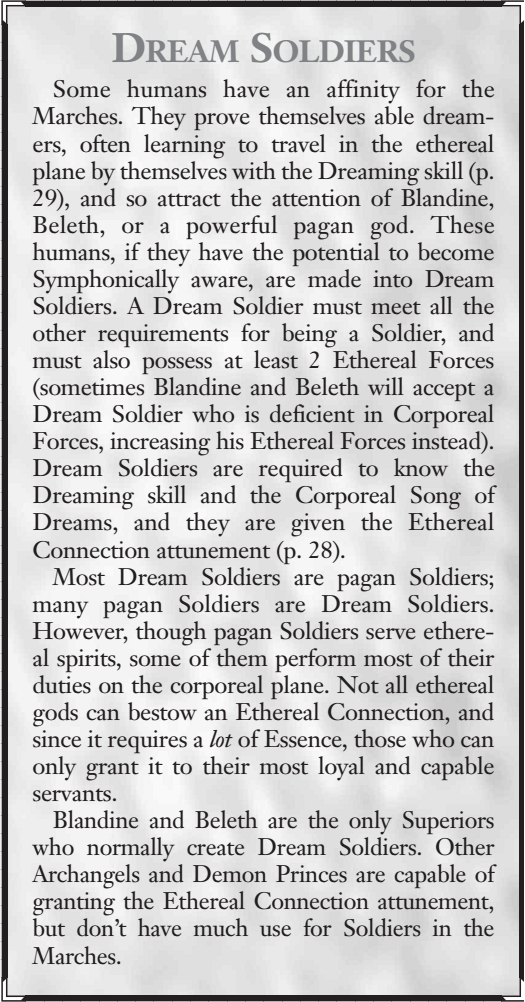
So why do ethereals want human Soldiers? Essence, mostly. Some spirits have other motives, sure, but sponsoring Soldiers is hard and they are expected to pay it back. The best way to do it is by giving Essence. This can be done directly by worship or indirectly by finding other worshippers. Soldiers are skilled corporeal agents, able to protect and further the interests of a god's cult and recruit new members. Soldiers are usually leaders in the pagan community, and often priests. As a general rule, ethereals want their Soldiers to avoid involvement in the War, as attracting too much attention often gets Soldiers killed and may bring the wrath of Beleth or the Host down on the ethereal. Pagan worshippers, Soldiers or no, can provide Essence to a god viea worship rites. These rites do not generate Essence for the performer, but instead send Essence from the performer to the god. Worship rites could be anything from telling stories about the god to wild orgies or blood sacrifice. Any sincere worshipper can perform a worship rite once per day, sending 1 Essence from themselves to their god.
Next time: Rogues
Rogue, Fighter, Wizard
Original SA post Corporeal Player's Guide: Rogue, Fighter, WizardNot all humans who are Symphonically aware pick a side. Some work only for themselves, or are unaware of the War. It's hard to stay uninvolved, given all the people that want to recruit or neutralize Soldiers, but a few humans manage independence. These are known as rogues. The most ocmmo ntype of rogue is the 'Gray Soldier' - a former Hellsworn that has decided to abandon serving demons but is not seeking salvation. Sometimes they want redemptiob ut have no idea how to start, or are too afraid. Gray Soldiers are treatd as Renegades - demons hunt them down, and angels usually treat them as hostile. A rare few Gray Soldiers who know about infernal hierarchies and have some contacts among angels (and often favors among Outcasts, Renegades and Free Lilim) know enough to trade information and keep ahead of the Game and their old masters. If they can keep their head down and avoid attention, they may remain alive and free...but unless they redeem themselves, they remain damned. More rarely, Soldiers of God also abandon the cause to strike out on their own. If they don't defect to Hell, they may be hunted or left in peace depending on who they served, so long as they stay out of the War, which isn't easy when everyone else that knows about them wants them back in.
Some rogues are secret Soldiers - initiated by groups other than angels, demons or ethereals. They aren't really independent, but they work for independents. Outcasts and Renegades are the most common recruiters of secret Soldiers, and they are also happy to recruit Gray Soldiers. Sometimes, they are daring and lucky enough to recruit a fresh Soldier with no knowledgeo f the War. They may reveal all or nothing as they like, and their Soldiers can be trusted allies or abused minions. The Host and the Game both either try to kill or recruit secret Soldiers, based on a combination of their usefulness, their knowledge and their past actions.
Sorcerers have plent yof need for Soldier bodyguards and assistants, and are some of the few humans who know enough to recruit Soldiers. They also happily recruit Gray Soldiers, and it can be either well-paid work or near slavery, depending on the employer. Soldiers who work for sorceers sometimes become sorcerers themselves, if they have the Will and inclination.
Munanes who discover the Symphony but do not understand it also happen. Some paranormal researchers occasionally find 6-Force humans, and thus can recruit their own Soldiers. Other groups, from cops to corporations to criminals, may hire someone with supernatural powers and not care about the details.
The most unpredictable rogues are the ones who are 6 Forces through their own doing and manage to avoid discovery. They hear Disturbance but don't know why, and they learn to control their Essence and become very lucky. They rarely learn Songs, as they have no teachers, but sometimes they find artifacts. If they learn about the War, they may try to stay out of it and hide. Many of them are Children of the Grigori. That siad, it is possible to learn Songs without being taught. Long exposure or accidentally duplicating hte performance ritual might allow a rogue to learno n their own. With no one to teach the truth, these rogues often believe they have spiritual, magic or psychic powers. They may form cults, and anyone who uses these 'spells' or 'powers' too often will eventually get noticed, but because celestials usually dismiss human claims to supernatural power as charlatans and fakes, someon who is lucky and discreet can remain hidden.
So, prophets. Gabriel is known to channel God directly, speaking His words through her madness and seeing Truths even the Seraphim cannot. Occasionally a mortal can do the same thing. These mortals, able to receive divine visions, are known as prophets. No one knows what triggers the gift. Some believe they're all Children of the Grigori, but there's no evidence for that. All prophets have the potential for at least 6 Forces, but need not fulfill that potential. Sometimes they are Symphonically aware, but often they are not. No attempt ot detect or create prophets has ever worked, and there is no noticeable difference in their configuration of Forces from normal humans, so only a Seraph can be totally sure a prophet is truly receiving visions. Many prophets go insane, and those that don't usually keep silent about their visions for fear others will think them insane. They are like any other human in most ways - their Divine gift does not guarantee them a spot in Heaven, and some prophets use their powers selfishly or ignore them. Prophets can become Soldiers, and they are treasured and protected by both sides. Angels see them as blessed, and demons as a source of strategic data from the enemy.
Prophets receive visions frm the Divine. The nature and frequency of these visions is random and up to the GM entirely, but all visions they receive are in some sense true. Some prophets see the future, while others see visions of the past. Others see events going on elsewhere but in the present time, on or off Earth. Visions may be literal and clear, or symbolic and confused. Some prophets receive only a few visions in their life, others see visions every day or even every moment. Some learn to summon and control the visions with a Perception roll, CD determining clarity of vision, but others cannot manage to control the power. Their visions are never false, however. This power is very potent, and it exceeds an angel's resonance in scope. As far as anyone knows, only Gabriel has ever been a non-human prophet.
Lucifer cannot create prophets, but he can make false prophets, and occasionally does so to make people and celestials distrust prophetic visions. False prophets receive false visions, generated from Lucifer's imagination. These visions can be of the past, present and future, and may come in any form. Sometimes they will be accurate - Lucifer is, after all, a Balseraph - anything he sends is what he believes to be true at the time, and sometimes it is actually true, or he makes it true. A Seraph can tell the difference between a true and a false prophet...but only on a CD 6, and only if resonating a false prophecy. Lucifer chooses people to be false prophets at whim. They always have 6 potential Forces, and beyond that, some are good people and some mad or evil. False prophets, like true ones, retain their free will and can go to Hell or Heaven. Lucifer my revoke their visions at any time.
Sorcerers, of coruse, are humans that learn sorcery. They have many, many motives and can be problems ofr anyone. A sorcerous cabal is also a good foe for a grou pof Soldiers. Sorcerers sometimes work for demons, and they can be fun PCs in a human or mixed game. They tend to the mysterious and their powers are subtle and secret. They tend to be secretive in general, and demons spread rumors and disinformation about them to confuse people. Non-sorcerers should never really be sure how sorcery works or what a sorcerer can do. Even sorcerers rarely do more than scratch the surface of the art. All sorcerers are Symphonically aware, but are also often ignorant of the War. They hear Disturbamces, which they refer to as the Cacophany, but rarely know why. Some summon demons or spirits, but come up with their own classifications for these beings. Heaven and Hell rarely fit their worldview except in the abstract. Sorcerers are more often than not pawns of Hell. It is possible for them to serve as Soldiers, but rare - they tend to be too willful and focused on their own desires to work for more than a contract basis. Undead canbe sorcerers, and often are. It is theoretically possible for a Saint to be a sorcerer, but is not known to have ever happened. Then we get a general rehash of the other sorcery information.
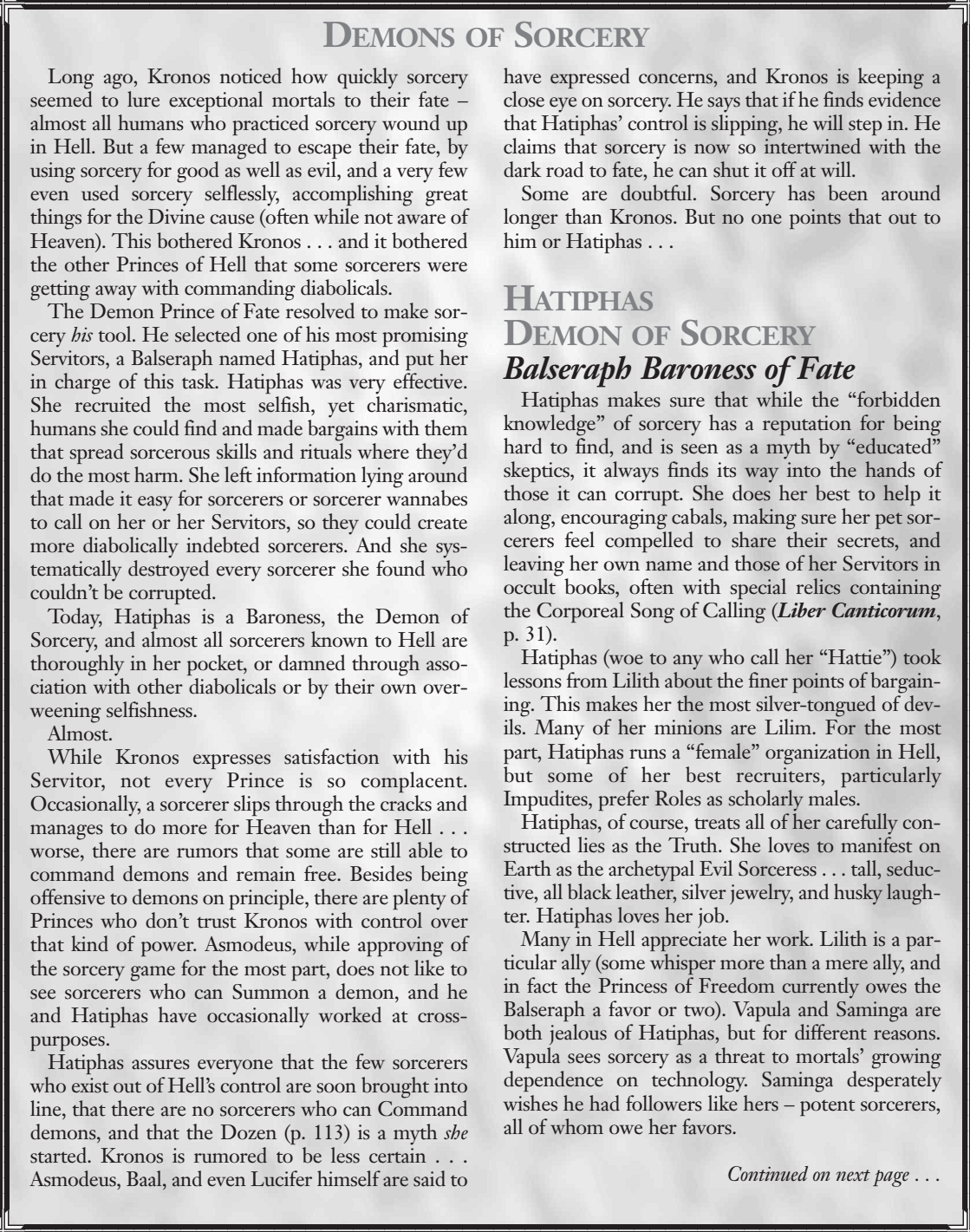
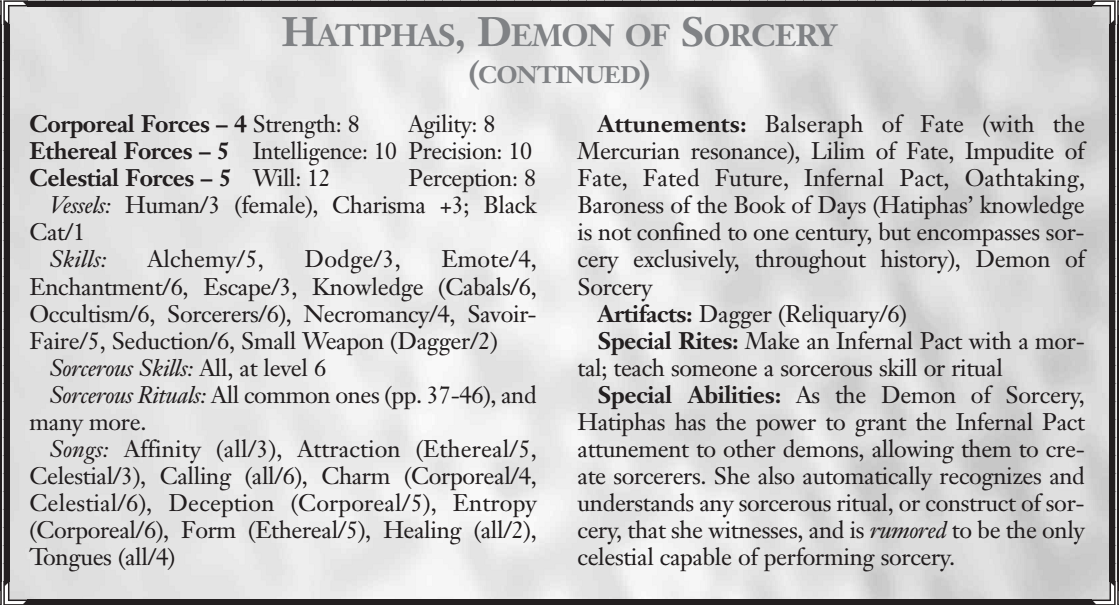
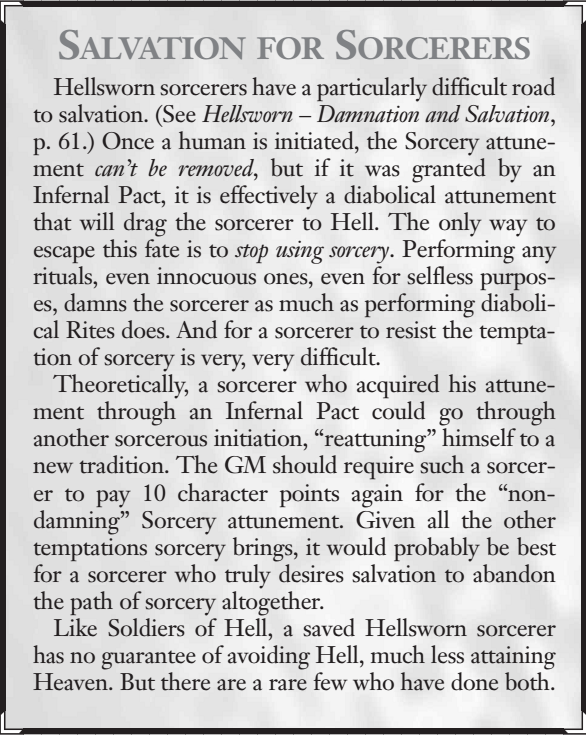
We do, however, get the first explanation of white sorcery. See, sorcery is inherently selfish. You don't have to be evil, but every sorcerer must believe in their core that they have the right to impose their will on the universe and bend it to their ends. There are no humble, selfless sorcerers. That and the fact thatm ost gain their power from infernal pacts or bargaining with spirits or demons for power means that most sorcerers work for Hell. However, a rare few manage to act selflessly enough to avoid damnation. Doing sorcery does not automatically seal your fate, after all, and those that stick to purely benign work can reincarnate, or even achieve their destinies. Hatiphas despises them, but above all, she hates the 'white sorcerers' who work for Heaven. I nfact, she denies that they exist at all, but it's best not to mention Merlin or Solomon around her. White sorcerers must fight a constant battle with their own selfishness and the lure of knowledge and power in exchange for evil acts. Plus, they need to hide - demons of Fate and the Game will quickly try to kill any white sorcerer they find, and Dominic isn't that much more tolerant. Perhaps the real reason, however, that demons mount such an extreme response is that some white sorcerers are rumored to be redeemed diabolical sorcerers, who gained their power via infernal pact yet escaped their fate by serving Heaven. Hatiphas denies that this is even possible, of course, but they remain one of her greatest problems, in part because she refuses to stop claiming white sorcerers don't exist.
Crossbreeds are a form of human that do not get wide discussion by celestials. With the use of the Songs of Fruition, ethereals and celestials can have children with mortals. These crossbreeds are mortal, but often have unusual abilities, and they include the Children of the Grigori. Both Dominic and Asmodeus forbid breeding with mortals. Ethereals that seek to have children this way are ruthlessly hunted, and celestials must face Judgment or the Game. The children's fate depends on who finds them. Angelos, even Judges, do not blame the children for their parents' sin, though they will be watched closely. Demons tend to see crossbreeds as a resource to be recruited or destroyed. Nephilim and Gorgons are another matter. Angels are ordered to report them to Judges, who will do what must be done. Demons tend to kill them on sight unless they seem recruitable.
In the old days, the pagan gods had chidlren with their worshippers fairly often. These days, the Host pesecutes any who even visit Earth, and espercially those that create offspring, but it still happens sometimes. Children of ethereals are outwardly human. There's no clear rules to how they will turn out, but some traits do manifest more often than not. First, many have extra potential for Forces, and a higher tendency to manifest them, especially in events triggered in the Marches. They are usually lucid dreamers and, if 6+ Forces, tend to become Symphonically aware. It is rumored that some have been born with a natural Ethereal Connection, but celestials insist this only happens when given by a pagan god. If an ethereal knows about its children, it will usually take an interest, and some are genuinely caring parents, while others see their offspring as resources. Either way, they often teach their children Songs or make them Dream Soldiers or sorcerers. Regardless of potential, however, ethereal crossbreeds do not breed true - it ends in one generation. The children of these crossbreeds are no more likely than any human to haveu nusual abilities.
One third of all ethereal crossbreeds, however, are Gorgons. They are very rare, and if they are not born deformed, they usually become so later n life. Life expectancy is rarely high, even today. Gorgons are not actually monsters, however. They are exceptional humans who are physically and mentally twisted by their parentage. Mental defects often do make them malevolent, but even more often, that malevolence is due to mortal and celestial persecution. All Gorgons have at least 6 potential Forces and almost always reach that potential early. When they acquire the 6th Force, they automatically become Symphonically aware, but also develop Corporeal, EThereal and Celestial disadvasntages equal to their Forces in each realm, which can be openly supernatural. More often than not, this results in a psychotic abomination that is quickly put down, but some do survive. Sometimes, their disadvantages are even invisible and, even more rarely, they can live relatively benign existences. They do receive character points for their disadvantages and can purchase additional ones. Like normal ethereal crossbreeds, they often have an affinity for the ethereal realm and can learn Songs or sorcery.
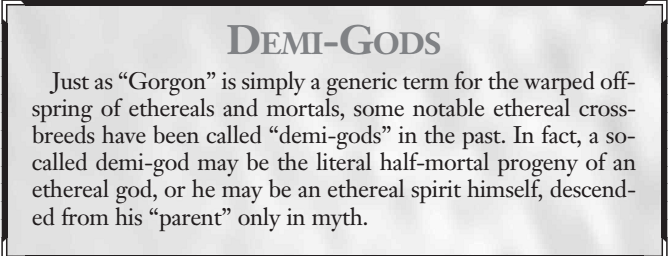
Celestials, too, can create half-human children by the Songs of Fruition. This is forbidden, of course, but it does happen. Most celestial crossbreeds are just mortal humans with a high incidence of extra Force potential, and they are often drawn into the War by their parentage. Many have the Blessed advantage. Like ethereal crossbreeds, their children do not inherit any greater likelihood of extra Forces as far as anyone can tell, or any special abilities. (Note that a Kyriotate or other celestial possessing a human and having sex does not produce a crossbreed.) Like ethereals, however, celestials can also spawn monsters. These are called Nephilim, and most of them descend from Grigori, due to the strict rules on celestia lprocreation. Any angel who discovers a Nephalim must report them to the Inquisition and may not interact with them under celestial law. When investigating Nephilim, angeles always use the Celestial Song of Affintiy to hunt down and kill the celestial parent, which dissuades most demons from trying to make them. Nephilim are identical to Gorgons in all ways. One note, though - a Nephilim that goes to Heaven never becomes a Bodhisattva. They immediately ascend to the Higher Heavens. Nephilim that go to Hell can be found, but there are non in Heaven. Some angels believe they actually disband, and that Heaven is forever barred to them. Beyond this, there is no actualy difference between celestial crossbreeds and the Children of the Grigori, save that Dominic actively suppresses all discussion of Grigori and their offspring even more than normal.
Next time: Immortals
The Quick and the Dead
Original SA post Corporeal Player's Guide: The Quick and the DeadHuman souls on the celestial plane are largely treated like Heartless celestials. They have the same Forces after death that they had in life, but no longer hae a limit on their potential Forces. They can gain them freely, by training or by Superior. The damned, of course, are forbidden new Forces by the Princes. Celestial souls retain all of their skills, Songs and attunements, though the latter are usually stripped from the damned. Human souls can learn and perform Songs in any realm after death if they have at least 6 Forces. Those with less still can't manipulate Essence or the Symphony. The blessed may learn any Song an angel is willing to teach, while the damned cannot learn anything without a Prince's permission, but some do anyway. Many Princes prefer to strip human souls down to 5 Forces ot prevent this. Souls can receive attunements and Distinctions, but the Archangels tend to give them only to Saints. Almost no Damned have any status - even those rare few that earned Knighthoods on Earth will tend to have them stripped in Hell.
Unlike Discord, disadvantages are not tied to your soul, and any mortal that enters Heaven may choose to abandon any disadvantages they had in life. Many newly ascended keep them at first, unaware that they might be able to shed their blindness or crippled...ness at will. The same is true of Ethereal or Celestial disadvantages - it might be harder to choose not to be Angry or Lustful or whatever, but it's still just a choice. Some angels and blessed souls patiently guide new arrivals through the process of releasing this baggage. In Hell, the damned can also lose themm but it's harder. No one tells them they can do it, and Hell tends to aggravate them rather than remove disadvantages. A damned soul must work them off with CP, as any living human might, and that's not exactly common.
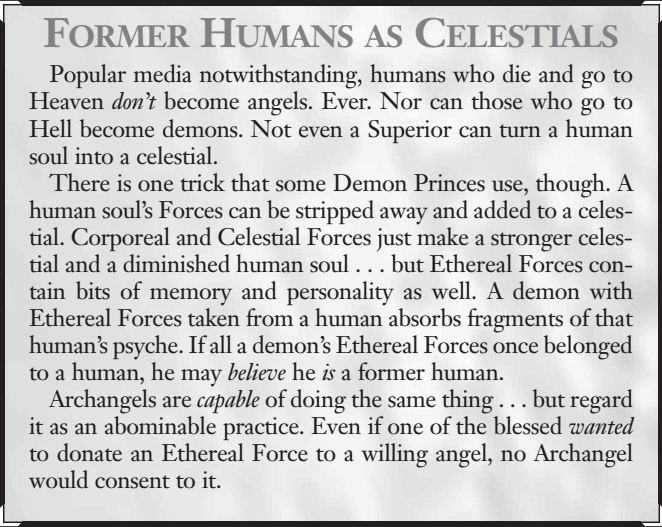
Human souls can engage in celestial combat, and if they lose all Celestial Forces, they cease to exist. Of course, no blessed soul would ever attack someone and no angel would even consider harming a human soul. The damned, however, fight fairly frequently or are preyed on by demons. Princes usually forbid the wasteful destruction of the damned, as they are useful as Essence and Forces, but they will allow anything short of destroying the soul.
The blessed are those who achieve their destinies, and the majority ascend to the Higher Heavens, never seen again. Those that choose to remain in the lower Heaven with the angels, however, continue service. Some advise Laurence or the other Archangels, giving them a valuable human perspective on the War. Others seek to become Saints. Buddhists believe in Bodhisattvas, the enlightened who choose to stay behind in the cycle of reincarnation to help others. This term has become popular among the humans of Heaven, though Laurence prefers to use the word 'Saint' to refer to all blessed souls, whether they have corporeal forms or not. Blessed souls always have the option to ascend to the Higher Heavens, and they constantly feel the lure, knowing instinctively that they are a place of ultimate joy and peace. It takes immense selflessness to avoid ascension. Heaven's a very nice place, but the blessed know an even better one awaits. Most eventually move on, sometimes after a short time touring Heaven to meet famous souls and satisfy curiosity, sometimes after centuries of struggle and work. All blessed souls automatically gain the Blessed advantage, though it hardly matters except for Saints.
Humans that meet their fate become the damned in Hell. They have few options. Usually, they just suffer eternally. If they are lucky, they may be destroyed eventually, but the Princes prefer to keep them around as Essence batteries. Rarely, one of the damned might prove themselves useful, however. In some Principalities, like Sheol or Abaddon, the damned are never more than victims. But under Asmodeus, Baal and the Princes of Shal-Mari, there are some chances to earn higher position. Those who are cunning, have an instinct for politics and are good at bootlicking may end up in positions of authority over the resto f the damned, and a rare few even get to serve demons as lackeys instead of mere toys.
Some humans have unfinished business after death, and when they reincarnate, subconscious memories drive them to complete that business. Those who have achieved destiny or fate have no such chance, however. Some of these, those with a strong will and desire to remain on Earth, resist the lure of the celestial plane and become ghosts. To do so, they must have at least 2 Celestial Forces, must have achieved their destiny or fate, and must have something on the corporeal to anchor themselves to, preferably a focus for the obsession that keeps them around. Anchors can be people, places or objects. Attempting to anchor yourself costs one randomly chosen Force and requires a Will roll. If you succeed and retain 2 Celestial Forces, you become a ghost. If you fail, you can try again, losing another random Force. This continues until you succeed, give up or are dropped to 1 Celestial Force, in which case you must move on. This is why most ghosts are weak and incomplete.
Once a soul is a ghost, they cannot go beyond a certain distance from their anchor, based on their Celestial Forces and Will, generally not very far. In most respects, ghosts are treated like they are in celestial form. They cani nteract with the corporeal only by spending 1 Essence and making a Will + Celestial Forces roll. Success makes them visible, audible and able to touch things if they have any Corporeal Forces or speak if they have any Ethereal Forces, lasting for (10*CD) minutes. Failure means they can't try again for (CD) minutes, or all day on CD 6. Ghosts cannot be corporeally harmed, even when tangible - they have no bodies and no corporeal HP - but can suffer ethereal and celestial damage. Ghosts retain any skills and attunements they had in life, but if they lose all Forces in a realm, they lose all skills and Songs associated with that realm. If the ghost was Symphonically aware and/or had Songs and/or was a sorcerer, they retain those skills in death...if they retain 6+ Forces. Few ghosts do. Ghosts regenerate Essence as they did in life, retianing any Rites they had, and some ghosts after long periods develop a Rite based on their anchor. Ghosts cause no Disturbance except via spending Essence. Ghosts with no Ethereal Forces cannot speak or assume coherent form. At most, they appear as a mist, a ball of light or a chill. Ghosts with reduced Ethereal Forces appear incomplete, sich as only manifesting above the waist or being audible only as if from a great distance. Ghosts with no Corporeal Forces cannot manifest tangibly or produce sound. There are four basic types of ghosts.
Will'o'Wisps are those with no Corporeal or Ethereal Forces. They are the most common form of ghost and the simplest. They have sacrificed everything but the Will that keeps them anchored. They largely manifest only as vague balls of light or cold air, and cannot affect the corporeal. Even if they could, they aren't smart enough to do much. Many are never recognized as ghosts by humans. They do not know how to let go of the corporeal but do not remember why they wanted to stay.
Poltergeists have Corporeal Forces but no Ethereal Forces. They can be playful, friendly or malevolent, but are never intelligent, as they lost their minds in their struggle to remain. Now they are ony as bright as animals, guarding their anchors and expressing their feelings by using their limited ability to affect the corporeal. They rarely display any visible manifestations,a nd their celestial form is mostly just a ball of light. Some make inarticulate noises, even laughter or screams, but most are silent. They are usually detected only by cold patches and hurled objects.
Apparitions have Ethereal Forces but no Corporeal Forces. They have lost the ability to affect the world directly, but retain intellect and memories of the past - or at least some of them. Depending on how much of their mind remains, they might just replay loops of memory over and over, or they miught seek out humans to give messages to, in an effort to complete their wrk. They manifest as they remember appearing in life. They can be harmless or hateful, and while they cannot move objects or make noise, they have their own ways of making unwanted visitors uncomfortable.
Ghosts retain both Corporeal and Ethereal Forces. They usually have most of their intellect and awareness, and they may communicate both with the living and celestials. Since they are the ones most likely to either by exorcised or complete their work, they are the rarest ghosts. They appear almost as real and tangible as the living when they choose to manifest, and only bright sunlight reveals them as translucent. They usually have a morbid sense of humor, and those who no longer hope of completing their unfinishedb usiness tend to laugh at mortals as self-absorbed and meaningless. They generally wish they could live again, or seek an end to their eternal existence.
At any time, a ghost can release its anchor to move on to its final destination, unless they reanchor themselves via the same anchoring process as before. Ghosts tend to leave voluntarily only if they accomplish their goals, but destroying their anchor will force them to move on. Sorcerers may also destroy ghosts with an exorcism ritual or force them to move on with a banishment ritual. Ghosts may also be driven from the world by celestial combat. If reduced to 1 Celestial Force, they automatically move on to their final destination. Demons tend to ignore ghosts unless they're useful or a problem. Angels tend to pity ghosts and encourage them to move on, sometimes even helping them accomplish their tasks. They also frown on destroying ghosts instead of banishing them, as that renders their final reward or punishment impossible.
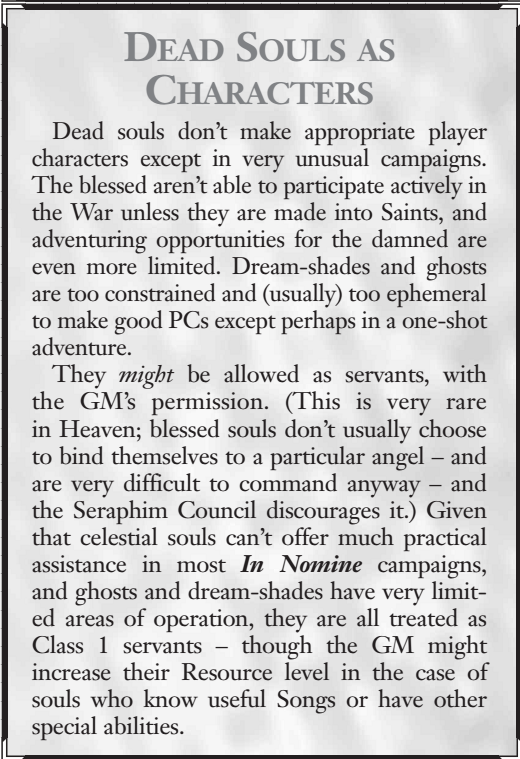
Dream-shades are ghosts that anchor themselves in the ethereal plane. Unlike corporeal ghosts, they need not have met their destiny or fate before dying, and they lose no Forces in the anchoring process. To become a dream-shade requires one of a few circumstances. First, any human that dies while asleep and dreaming can make a Dreaming skill roll to anchor their soul to wherever it happened to be at the time (usually their dreamscape), and non-lucid dreamers can attempt the roll at default by instinct. Failure means they move on to whatever awaits. Further, lucid dreamers (which is anyone with the Dreaming skill) can make an attempt at -2 even while awake. Success anchors them anywhere they know in the Marches or in their dreamscape, their choice. Humans who know the Song of Dreams can do the same, but must successfully perform the Song and have enough Essence when they die to do so. Humans with the Dream Walking attunement can do the same with a Percpetion roll. In either of these two cases, the dream-shade must anchor themselves in someone else's dreamscape, and is out of luck if the subject is not dreaming at the time of death. Certain potent ethereals can also anchor souls in their own Domains, but only if they're aware of the human's death as it happens and the soul is willing. Some worshoppers of pagan gods go to their gods on death this way. Blandine and Beleth can also anchor willing souls anywhere in their side of the Vale, but Blandine never does so. The final method is to use the Ethereal Song of Blood, which lets you murder a mortal in their sleep and bind them to their dreamscape.
Once anchored in the ethereal, a dream-shade can move on at any time - nothing can hold a soul against its will. Dream-shades who have fulfilled their fate or destiny will eventually move on to their final destination, while the rest reincarnate or disband. Dream-shades are treated as ethereals in most ways, and retain all Forces and abilities they had in life, but have no corporeal form. They regain Essence at midnight, like spirits, and can be attacked in celestial combat. They can learn and perform Ethereal Songs if they have 6+ Forces, but not Celestial Songs. Most can wander the Marches freely, but non-lucid dreamers who anchored themselves to their own dreamscape will be trapped within until someone shows them how to leave. They may reanchor themselves with a Dreaming roll, and the new anchor can be someone else's dreamscape or any location in the Marches. A failed attempt means you wait (CD) days before you can try again.
Unlike ethereals, dream-shades cannot create their own vessels. The only way for them to go to Earth is if a Superior or pagan god makes a vessel for them and they have at least 1 Corporeal Force. Dream-shades with vessels can manifest on Earth anywhere they've ever been before with 1 Essence and a Will roll, and may return to the Marches the same way. Dream-shades feel the constant pull of the afterlife, and each time their vessel is killed makes it harder to resist. Most dream-shades that die on Earth move on, but the few that cling to their existence suffer Trauma as an ethereal would, and then need to get someone to give them a new vessel. Dream-shades can be exorcised or banished, and if their anchor is destroyed they can be forced to move on - but that's not easy without killing a dreamer to get rid of their dreamscape, killing the pagan god or Superior that owns an ethereal Domain. Even then, the dream-shade gets one chance to roll Dremaing to reanchor.
Next time: Saints
Oh when the Saints, go marching in...
Original SA post Corporeal Player's Guide: Oh when the Saints, go marching in...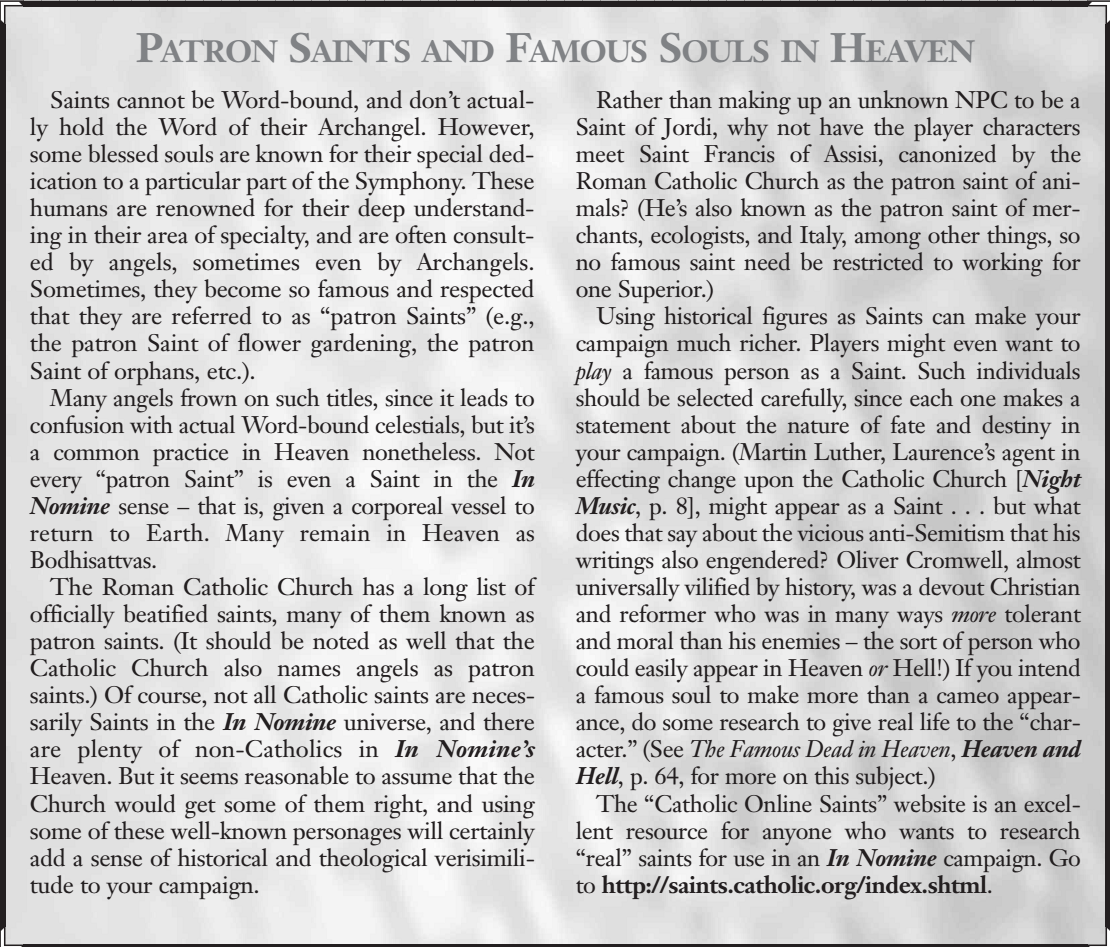
Blessed souls that do not ascend to the Higher Heavens usually stay in Heaven, but some petition to go back to Earth. These are Heaven's secret weapon - almost incurruptible, with human insight and celestial powers, and the power to live on Earth without Disturbance. Bodhisattva is the common term for blessed souls and Saints for those with vessels, but there is no real difference between them save the vessel. Still, Heaven has strict requirements for handing out vessels. A soul that wants to go to Earth must first petition an Archangel, usually the one whose goals and methods align closest to their own. If a human was a Soldier in life, they'll probably petition their former Archangel. Most Archangels have only a few dozen Saints on Earth at any time - the Seraphim Council doesn't want the dead to meddle with the living too much. An Archangel will question any petitioner very carefully, as a result. The blessed as selfless as any angel and cannot lie in Heaven, but they are as fallible as any human, and some want to go back for personal reasons, not to help all of humanity. Only those with an overwhelming desire to fight for the sake of all creation and who will forsake all former Earthly attachments are considered. Every Archangel also only wants to sponsor Saints that will advance Heaven's cause in accordance with their Word. Petitioners are expected to describe in detail what they plan to do on Earth and why, how it will be done and how it will help Heaven. The Archangel will then cosnider the proposal alongside the Saint's abilities. If they are swayed by it, they will send the new Saint to Earth.
To make a Saint, Archangels must first make a veseel as they would for an angel, but binding a blessed soul to a vessel is trickier than for an angel. There are two main methods. Either way, a Saint's body is treated as a vessel for purposes of HP, with level equal to Corporeal Forces. Archangels have also learned that Saintly vessels must require sleep - unlike angels, the human mind needs to sleep and dream when not in the celestial plane, and Saints are prone to forget this unless their body reminds them. Other needs depend on which of the two methods was used.
The simplest method is to create a vessel and just bind the soul into it. The Saint returns to Earth full-formed, with all memories of Heaven and the past life intact. Often, the vessel will be identical to their living body, though this is sometimes not desirable, like when a Saint died recently and may be recognized. A recorporealized Sain'ts vessel is like a celestial's in most ways - it does not age, it doesn't have to eat or drink and it's immune to most environmental extremes. Saints are recorporealized by those Archanges who have a specific reason for the Saint to be in a certain place at a certain time.
The other method, however, is literal rebirth - an Archangel picks out a woman to give birth to the Saint, who is invested in an embryonic vessel in the womb. The woman chosen to bear the Saint to term is always carefulyl slected, and sometimes is a volunteer Soldier. Often a Cherub will be assigned to guard the mother and newborn. Reborn Saints grow up as normal, but always very healthly and selfless. At some point in their life, an event triggers their dormant abilities and they remember who they are and why they were sent back to Earth. A reborn Saint's vessel is mortal - it will age and die if the Saint is not killed first, and when this happens, their soul returns to Heaven again and they can, if their Archangel allows it, go back for another round. These vessels must eat and drink and are as vulnerable to the environment as any human. Rebirth is used largely by Archangels hwo have no specific mission in mind, just a desire for the Saint to bring about positive change.
Angels fight demons directly and Soldiers work as guerrillas, but Saints attempt to avoid conflict. Their job is to attend to humans, ideally furthering their patron's Word but primarily just helping humans get by. Saints live among humans as helpful souls, working to save individual souls one at a time. Saints do not ignore demons, of course, and as they can hear Disturbance they make excellent sentries, and few will hesitate to fight a demon preying on their flock. They are much more formidable than Soldiers, as they do not fear death and cannot be told from normal humans unless they use powers. Demons despise and resent Saints, and enjoy hurting them, but they tend to come off the worse in confrontations with them, as Saints usually have angelic friends. Archangels do not waste them on jobs anyone else could do, and tend to work in the long term, so they make poor PCs - they tend to stick to individual lives for years on end. They will help angels if they can, but their first priority is always their charges. They won't chase a demon if it'd mean missing a meeting with a troubled teen they're counseling. Saints will call on angels for help only when absolutely needed, and they expect to be treated with respect. Any angel that tries to order tham around is likely to get yelled at by their Archangel.
Blandine's Saints, more than any of her servants, work on Earth to help brighten the world. They are always people who, in life, illuminated many dreamscapes or who were particularly brilliant lucid dreamers.
David's Saints are leaders, charismatic and driven, especially those who endured great suffering. They help people find purpose and encourage communities.
Dominic's Saints promote rule of law and work to fight unjust laws. They also keep an eye out for demonic influence, particularly the subtler kind. They're as quick to report angels as any Judge, and they always have an absolute set of morals.
Eli has few Saints, since he's been AWOL for years. The ones that remain are free spirits who make life better just by their existence. Most are artists, who created out of love for the world.
Gabriel has few Saints as well - she's hard to find and harder to talk to. Her few Saints tend to be wrathful vigilantes, but her oldest ones were artists, lovers, leaders or prophets that inspired others with their passion.
Janus' Saints are infiltrators, who work their way into stagnant organizations and engineer some radical change to get them moving again. Janus loves revolutionaries.
Jean's Saints watch over the works of mankind. They are engineers, mechanics, plumgers, sysadmins and other repairment, who ensure that equipment vital to human life keeps going. Their work is not glorious, but it is vital. Sometimes, Jean uses his Saints to subtly pass on knowledge he deems suitable for humanity, but he will always recall anyone that passes on Heavenly innovation without instructions. His Saints are sometimes brilliant innovators, but more often careful, precise and methodical researchers.
Jordi has almost no Saints, and chooses only those who love animals so much they're willing to live as them. Most of his Saints have animal vessels and work to save animals from abuse and extinction as well as attacking hunters.
Laurence's Saints tend to be Christiand and especially Catholic. He chooses great men and women of the Church, and he primarily sends them as missionaries or supporters of churches.
Marc's Saints are those who prospered by fair and good practice and used their money to help others. He sends them back to Earth to teach other people to do the same. They invest in promising companies, mentor young entrepreneurs and teach business ethics and economics.
Michael has over a thousand Saints, and he's been recruiting for a long time. Any of his former Soldiers that want to do the job get to. They infiltrate organizations Michael believes are demonic targets, get key positions, then wait. Some have been waiting for centuries. They watch for demons, report it to angels and oppose only passively, always remaining hidden. This vast conspiracy exists for when the Day finalyl comes - when ifnernal forces organize enough for a major strike. Then, Michael will give the order and the Saints will act by the hundreds. Queue mass bloodshed and the deaths of thousands of diabolical agents with no Disturbance whatsoever. The last time Michael mobilized his Saints was Normandy in WW2. The hope is that next time will be the Final Battle.
Novalis' Saints are sweet, kind and optimistic. They don't need to have done anything great - they just had to live happily and make others happy. That's all Novalis requires. Their job is to heal people, comfort and cheer them, and then move on to the next person in need. They're so saccharine even some angels can't stand them.
Yves' Saints are subtle, very subtle. They are sometimes sent to places where many reach a crossroads in life, but more often they are sent to mentor humans identified as having great destinies. Sometimes they become a permanent part of that human's life - a friend, a mentor, a lover, even a parent or sibling. These Saints may not have had great destinies themselves, though - Yves prefers souls who had a knack for guiding others to destiny.
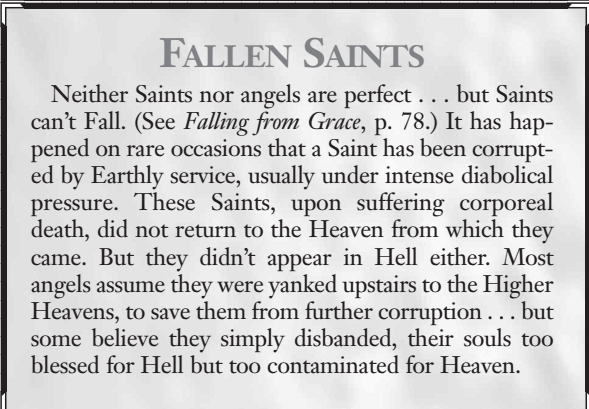
Saints are human, but very potent. All Saints have 7 or more Forces and have only the same limits as celestials on Forces. Even those who are reborn are born with all of their Forces - their stats are just temporarily reduced until they reawaken, to allow them to live as normal humans. Saints are Symphonically aware (though, again, reborn Saints are not until they reawaken). As humans, they cause no Disturbance save by Essence spending, and if they are harmed by celestials it does cause Disturbance. All Saints also have the Blessed advantage. Saints may learn and perform Songs of all three realms, and while they have dreamscapes in the Marches, they may consciously leave them and travel in the same way as celestials. Saints cannot manifest in celestial form on Earth, except via Tethers. If they return to Heaven this way, they cannot get back to Earth save via a Tether or being sent back by an Archangel. In theory a Saint could go to Hell via an Infernal Tether or by following a demons; this is a terrible idea. When a Saint is killed, they suffer Trauma the same way as celestials. If they fail a Will roll to recover from Trauma, they may choose to ascend to the Higher Heavens forever. Once a Saint recovers from Trauma, they will need to get an ARchangel to give them a new vessel, but some archangels prefer not to let a Saint die a lot. Saints do not have or need Roles, and their vessel is free - but its level cannot be increased save by gaining Corporeal Forces. Saints cannot buy Toughness, either, and rarely have disadvantages.
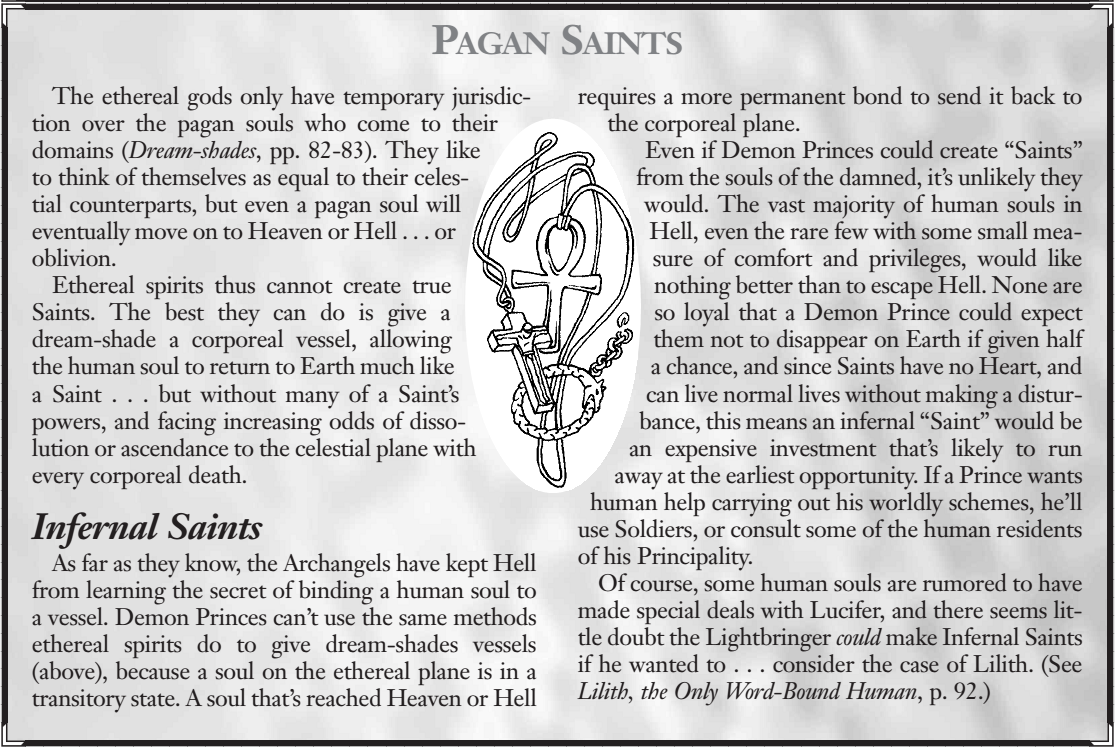
Undead are the least human humans. Most are Hellsworn who voluntarily gave up mortlaity. The rest are the victims of dark sorcery or demons of Death. Undead have a lot of power, and are kind of immortal, but they are not very human. The Forces bound to their bodies are held together by Hell's power, and their souls are permanently tied to their bodies. They may never gain additional Forces on their own, though they can lose them, and when their body is destroyed or their Forces otherwise disbanded, their soul is gone forever, beyond even the powers of Superiors to save. Some believe this lets them off easy - after all, most would go to Hell otherwise, and it can be argued that oblivion is superior to Hell. This may be the motive of some Hellsworn volunteers...but even in Hell, a soul can hope for relative comfort over other damned souls, and when Armageddon comes, none knows what may happen to the damned. Some believe that if God wins, he will give them a second chance, or that those who are truly loyal will finally be rewarded by Lucifer when Hell wins. But none of that matters for the undead, who cease to be. Many mortals will take any existence, even Hell, over nothingness. For these people, undeath is the worst thing imaginable, for the undead know there is nothing for them after their existence. Saminga particularly likes turning those kind of people to undead - their anguish is far greater than any torment he might give them in Hell.
All undead share certain traits. First, they're human by the Symphony's definitions, with all the advantages and disadvantages that entails. However, due to the manipulation of their Forces that made them undead, they are Symphonically aware even if they have less than 6 Forces (though zombis are only technically so - they can hear the Symphony if they spend Essence, but few have the will to do so). Zombis can only perform Corporeal Songs, but other undead can learn Songs from all three realms. Princes can give attunements to undead, but rarely do, and can also give them Rites. Saminga (and Saminga alone) will sometimes grant them Distinctions. Being infernal creations, undead benefit from Infernal Intervention and suffer from Divine Intervention, even so-called redeemed undead. They regain Essence at sundown. They may use infernal Rites, but may no longer regain Essence via use of skills at level 6. Undead are still limited by their Force potential, but can acquire them like other humans if they have any extra potential after undying. (Wait, that contradicts - oh, whatever.) Undead are immortal and unaging, though zombis rot. Undead are immune to poison, disease and environmental conditions, and have no need of food, water, breath or sleep. They can do all of that, but neither have any use for nor enjoyment from them. They may be killed, but their bodies are treated as vessels of a level equal to (Corporeal Forces) for HP purposes. They regenreate 1 HP per day, except zombies, who do not naturally heal. Medicine cannot heal them, but the Corporeal Song of Healing can. Undead have no celestial form and no dreamscape, even if they will themself to sleep. The only method by which an undead may visit the Marches is via the Corporeal Song oF Dreams or Dream Walking attunement. Physically, an undead is a walking corpse. Their autonomous bodily functions do not work and they are room temperature. They may look normal if they maintain themselves, but even a cursory medical examination will reveal they are very, very wrong.
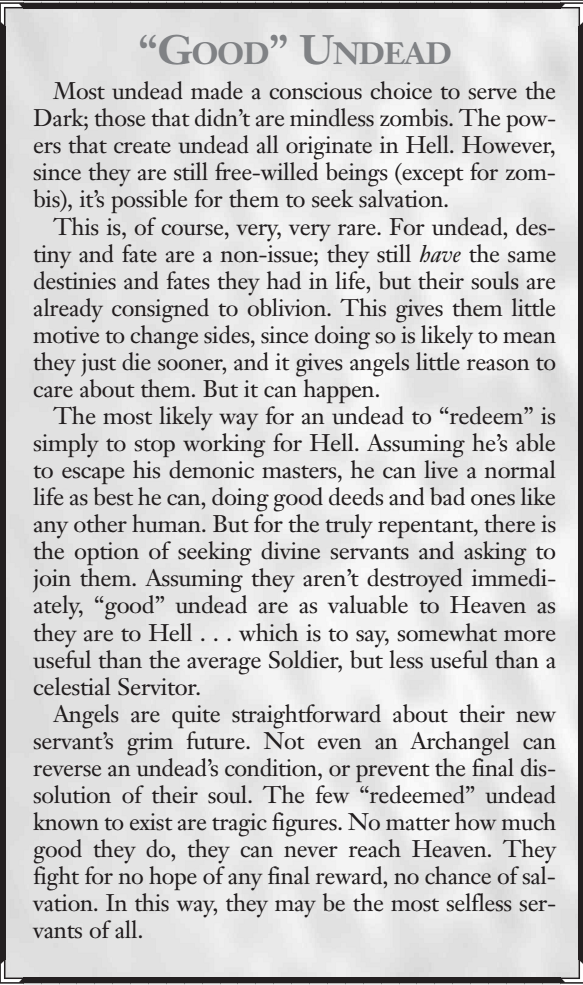
Saminga is the master of most undead, but he didn't invent undeath - the ancient Egyptians did. His demons are now the greatest experts of necromancy and guard its secrets carefully, but it is theoretically possible to learn from sources he doesn't control...though if he learned of those sources, he'd want to destroy them and anyone that learned from them. The most potent undead are mummies, made by special ritual. Vampires and zombis are usually the results of a botched mummy ritual. There are other ways to make undead, particularly by Saminga's Songs, attunements or special artifacts incorporating those powers. Because Saminga controls most sources of undead, most undead serve him. However, a few other Princes are patrons to sorcerers who can make undead. Even if a demon doesn't have those resources, it's generally pretty easy to make a deal with a demon of Death if you want an undead servant, and Saminga is fine with that - anything that spreads undead on Earth is okay by him.
Mummies are permanently bound to their vessels by the addition of a Force. Most mummies have 5 Forces before they become mummies, and Soldiers with 6+ Forces are especially good candidates. After the ritual, they gain 1 Force in any Realm. A new mummy thus gets 4 bonus points to raise stats with in htat realm, plus 10 character points to buy supernatural powers with. They can buy powers from their Prince or from Saminga, who is always willing to hand out attunements to mummies. Some mummies also take on disadvantages for extra points in order to buy other things, such as Rites of Death or the Prince they serve.
Vampires are almost mummies. Their soul was bound to their body, but the extra Force didn't attach, requiring the imposition of Discord to hold the Forces together. They have the same number of Forces they had in life, but do receive 10 CP to buy powers with. They automatically receive a level 3 Vulnerability to sunlight and a level 3 Need, typically but not always for blood. They receive no bonus CP for these. They can take on additional disadvntages for extra CP, too. They cannot buy Rites, as Princes do not see them as worth the investment, but might earn them later if they're really successful.
Zombis are created either by zombi ritual or badly failed mummy ritual. Unlike other undead, their soul is not bound to their body - rather, the soul of a corpse made into a zombi has already moved on. Someone who volunteers to be a mummy dies if the ritual fails, and their soul disbands, leaving only a zombified corpse. A zombie retains their memories and instincts, but their only personality remaining is what manifests by the reflex of their decaying brain. Zombis replace all of their Celestial Forces with Corporeal Forces, and automaticlaly gain a Numinous Corpus at a level equal to its Corporeal Forces, plus a level 3 Need, usually for blood or brains. They generally are not granted any other powers - they could be, but even Saminga won't waste resources on a zombi. Zombis rarely last very long, as they need a constant supply of Essence to avoid rotting. If a zombi fails to satisfy their daily Need, they not only do not gain Essence at sunset, but also take 1 damage at dawn - and zombis cannot heal naturally.
Next time: Remnants
What's Left Behind
Original SA post Corporeal Player's Guide: What's Left Behind
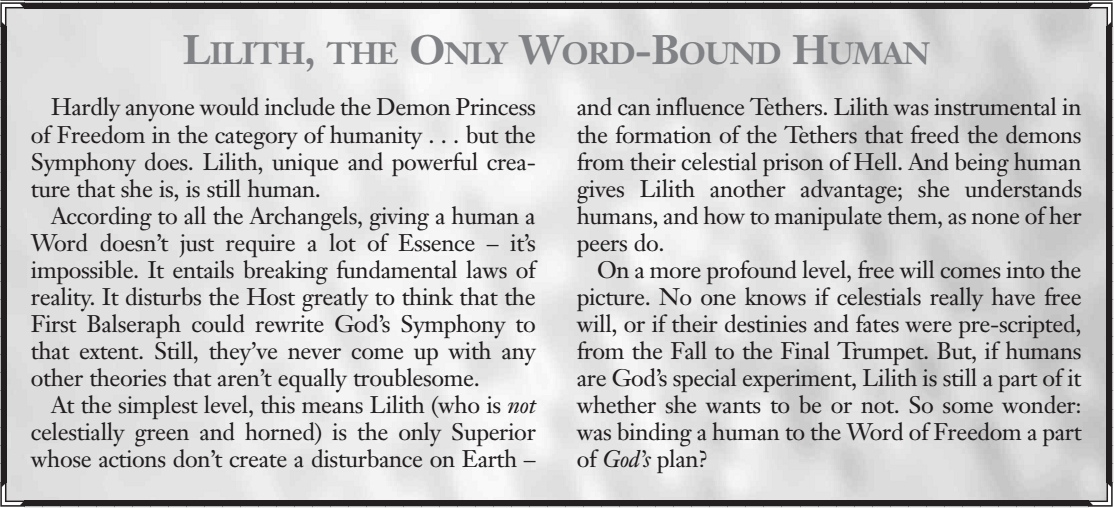
Remnants aren't human, but they function as humans in most ways. A remnant, we recall, is a celestial who has no Celestial Forces but at least 1 Corporeal Force and a vessel. They appear on Earth in their vessel, losing all but their vaguest memories of their celestial existence. They are not celestials any more - they have no resonance, dissonance or Heart. They keep any attunements but can't use any that require resonance or celestial abilities. They have no celestial form and cannot switch vessels. They do not have dreamscapes, and while they could theoretically travel the Marches as celestials do if they have Ethereal Forces, few remember how and fewer have any reason to. Further, as entering and leaving the Marches requires a Will roll, only those with a lot of Essence can even manage it.
A Remnant with a Role assumes the Role in all ways, forgetting they were ever anything else. Remnants with no Role are amnesiac but have no history or place in society. If a Remnant had a Role, harming them causes Disturbance as if they were mortal. Remnants without a Role do not cause Disturbance when hurt. Some Remnants can manage to gain Roles, however, by living as if they were human, spending CP on the Role, with the level reflecting how 'real' they've become. Most, however, wander without motive or memory, lacking enough wherewithal to live as a human. Remnants cannot hear the Symphony, but can control their own Essence and perform Corporeal and Ethereal Songs, even if they have less than 6 Forces. Remnants do not cause Disturbance by their actions except when spending Essence. They generate Essence the same way they did when whole, and if they remember them, they can perform Rites. They do not gain Essence from using skills of level 6. Any Discords they had remain with them. Their body remains a vessel, HP calculated as before and healing as a vessel. Remnants need not eat, drink or sleep, but often do as they imitate humans around them. When they die, their Forces are forever dispersed. Remnants do have one 'advantage', though - they don't exist for purposes of Perception-based resonances, attunements or Songs. Any attempt to gain information on them via supernatural powers just fails entirely. This is usually the only way to identify a Remnant.
Most Remnants instinctively avoid the supernatural, finding it painful to be reminded of what they cannot recall. However, some do become reinvolved with the War. A default Remnant PC has 5 Forces, none Celestial. However, Remnants can gain new Forces the same way celestials can...with one exception. No Remnant may ever gain Celestial Forces without direct intervention by a Superior, and some - especially Princes - will not bother to help. If a Remnant were given a Celestial Force, they would become a celestial again, but would not be the same being they were before. They would have only vague, partial memories of the time before their 'rebirth' and would be much like a newly made angel or demon, just with all the Forces, skills and abilities of their last 'self.'
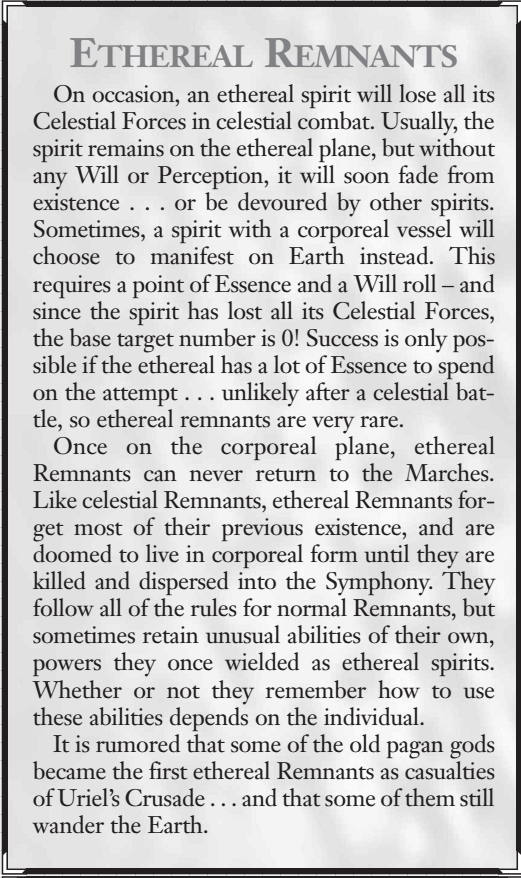
We get some basic advice on how to make mixed parties, none of which is very good - it's just, you know, humans don't cause Disturbance, maybe focus on that kind of thing, or make sure the humans have a niche that the celestials don't intrude on. It talks about human-only games, blah blah. The only real thing is this set of sidebars.
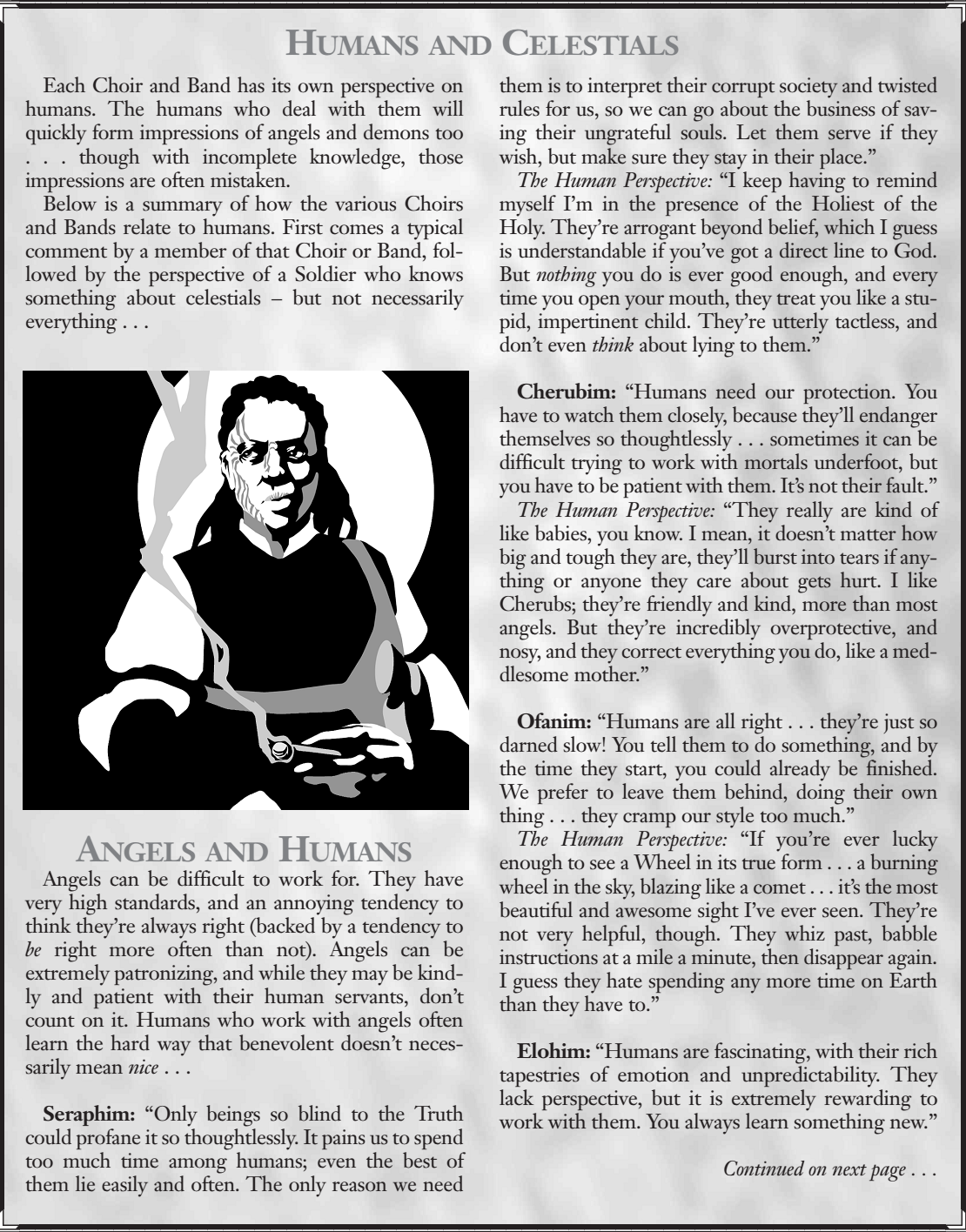
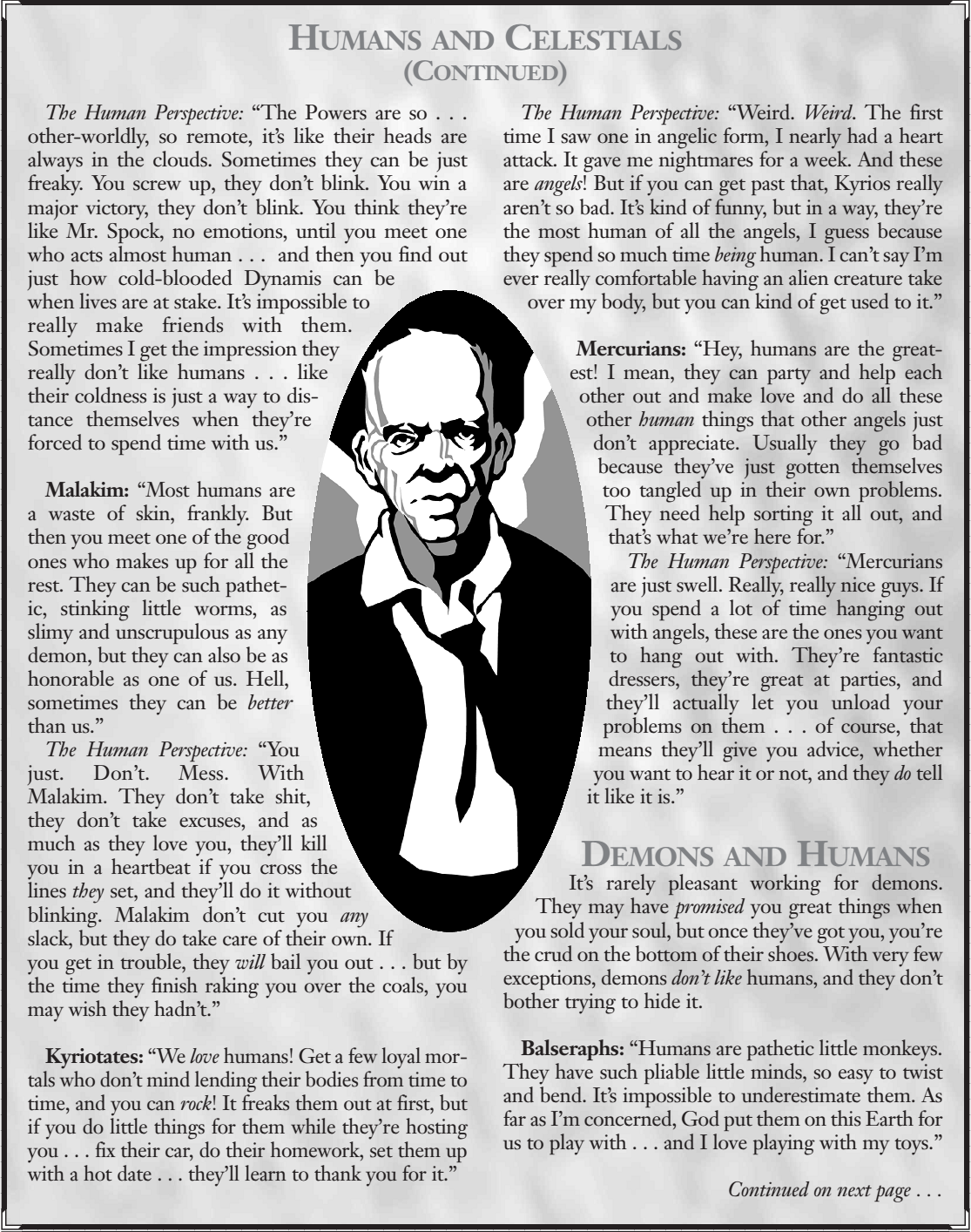
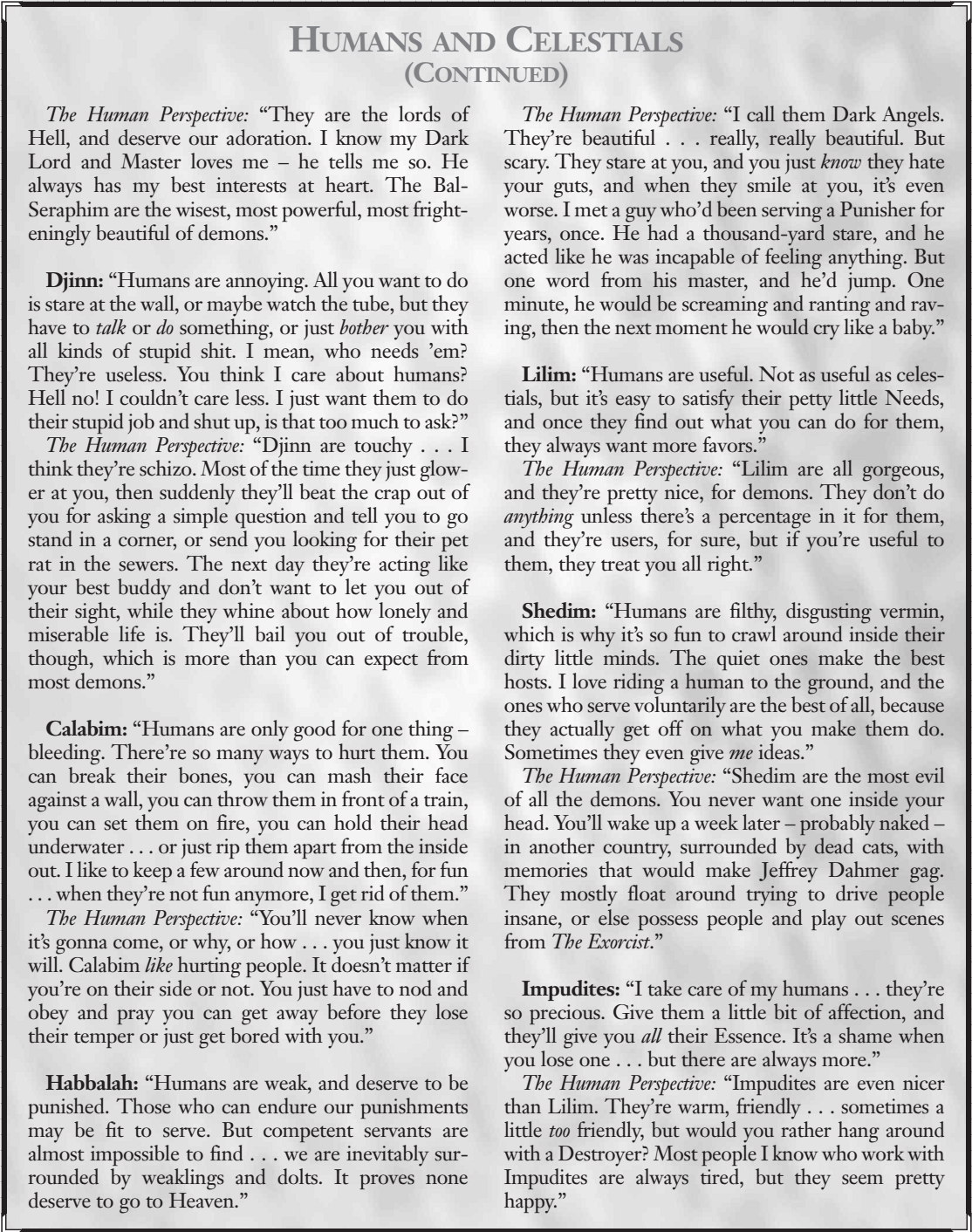
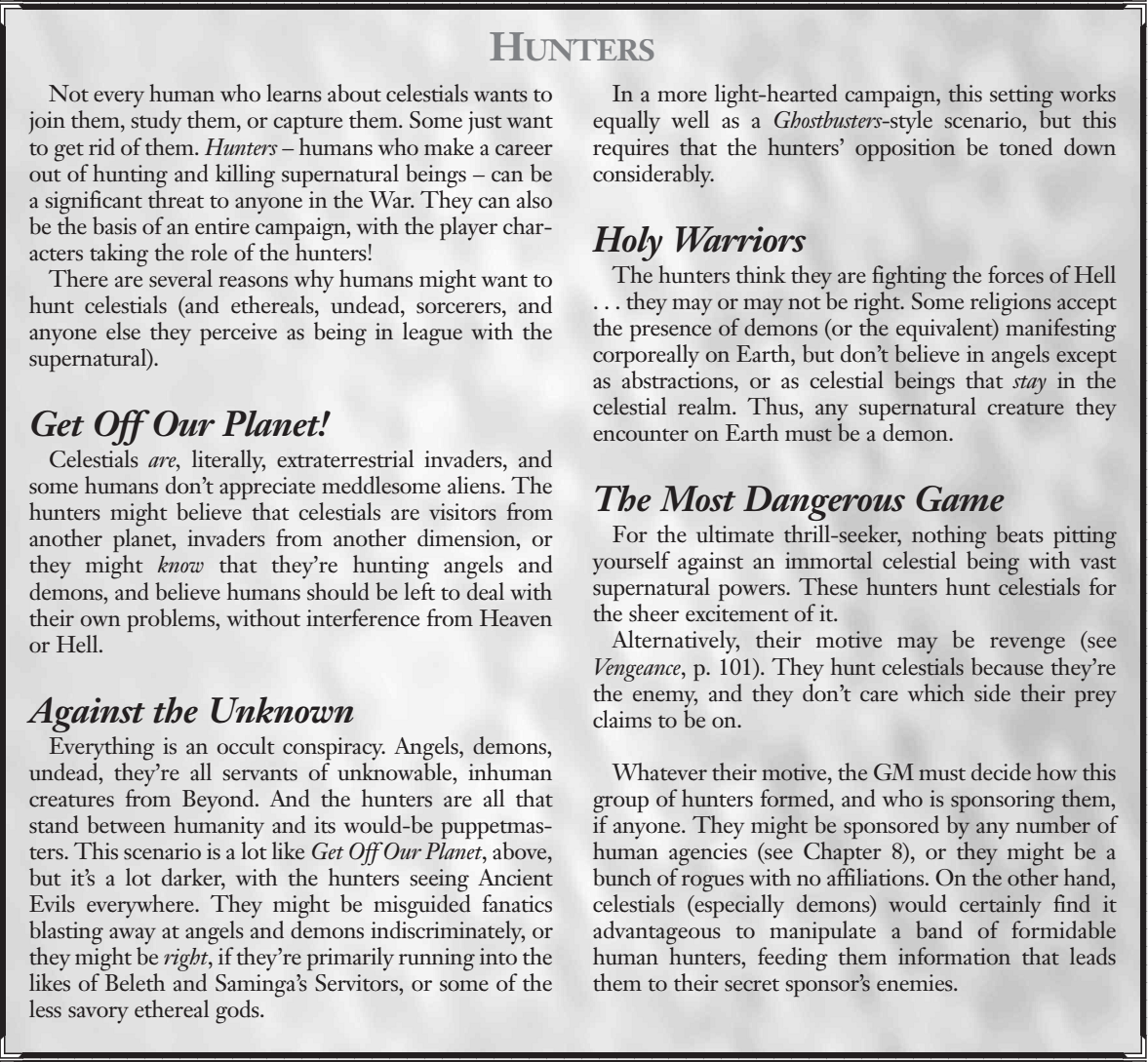
And then we get a chapter on human agencies. How much they participate in the War depends on how much they know about it. Unaware agencies are involved only indirectly, when celestials get into their area of interest. Misled groups frequently get involved, but more often as random interference than any kind of support, unless it ties into their goals. Government agencies hunting for evidence of the suparnetural can be a problem for anyone, while one that knows undead exist and are trying to find and destory them are a threat to Saminga and an unwitting ally of angels. Sorcerous cabals usually work for Hell, even if only by damning themsleves. Informed groups are usually active supporters of one side or the other...but not every group cooperates with or even communicates with their allies. For example, most secret societies of the Children of the Grigori are ultimately on the side of Heaven but avoid angels as much as possible. And some groups try to avoid being involved in the War entirely.

Celestials do involve themselves in human agencies. Mostly, they work with those that further their goals. Sometimes the organization itself is useful or hated by a Superior - Laurence and Dominic, for example, have made the Catholic Church integral to their strategies, while Saminga loves the right-to-die movement even if its greater significance is minimal. Novalis wants to see the military-industrial complex wither, and Lilith hates all governments on principle. Sometimes, infiltrated organizations are just providers of useful re surces - money, for example. The degree of infilration varies widely. Moist large groups like the military, national governments or organized religions are heavily infiltrated by celestials of many Words, each focusing on their own little corner. These groups are effectively as free of control as those with no infiltrators, as a result. Very small organizations, like a sorcerous cabal, a local church or a city government, may occasionally be entirely celestially controlled - maybe even by just one celestial, if they're very effective and unopposed. Groups that are openly run by celestials, of course, aren't really 'infiltrated.' Most groups secretly controlled by celestlals, however, have to be started that way, or else the celestials must be helped by hte members of the group they're trying to control.
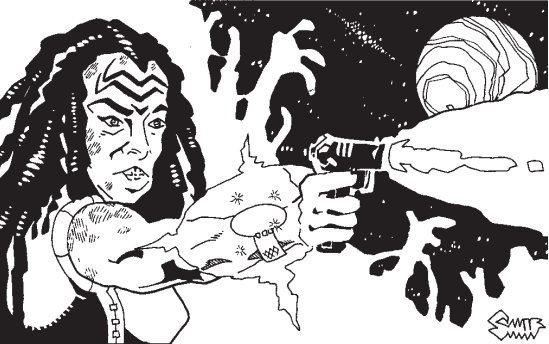
I felt the need to share this just because I have no fucking clue why Smif drew a Klingon or why it was put in the book.
Front organizations are those created by celestials for the purpose of recruiting humans to control. Sorcerous cabals are often demonic fronts, and many demons still use the wwhole Satanic cult idea, though most demons in the cult business these days pick less obvious demonic trappings. Malphans like conspiracy theorists, and Kobalites like UFO worshippers for example. Angels also make fronts, often using religion, but also peace activist groups for Flowers or martial arts dojos or gangs for Stone. The goals of a front organization are usually to just further their sponsor's Word. However, the larger they get, the harder they are to control and the more likely another celestial will infiltrate. Many celestials have found great success in creating and spreading a front organization, only to lose control of it entirely as it started to get really useful.
Collaborator groups are those iun which celestials recruit an existing group within the larger group, using it to take over. Subverting the leadership is the most obvious tactic, but a few influential members can also work, sometimes causing a change in leadership. Soldiers are particularly valued here, but mundanes work, too. Collaborator groups are preformed and often well-positioning, but have the disadvantage of being full of humans that are unknown quantities and possible capable of resisting takeover. Plus ,you never know if there's other infiltrators in there, watching you.
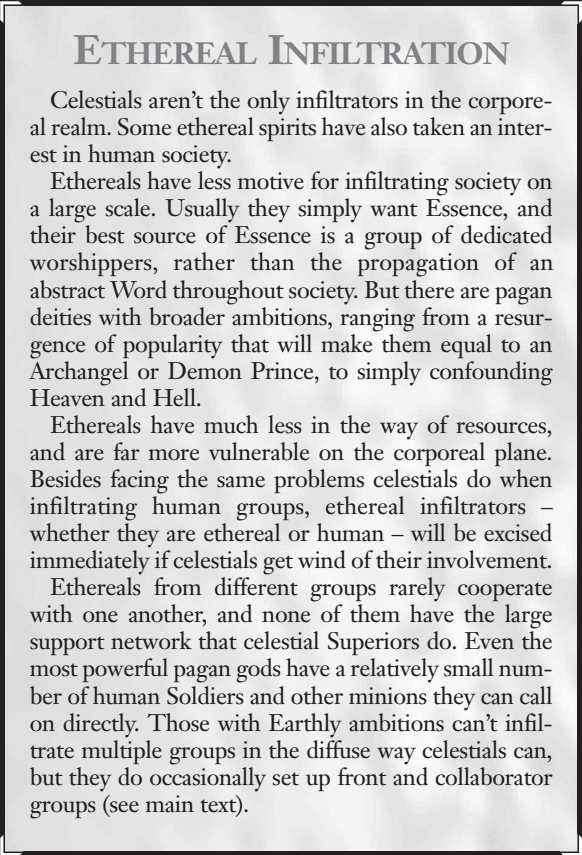
Next time: Organizations
Org Chart
Original SA post Corporeal Player's Guide: Org ChartThe government of a nation, no matter what nation, is usually the most powerful organization within it. Taking control of it would seem an obvious goal for those seeking to sway human society, but celestials rarely go for it. It's too obvious - any important government will have many watchers from either side. Secondly, governments are diffuse. It's not just subverting one group - even if the absolute monarch of a nation is your puppet, his ministers, generals and heirs won't be. Governments have been ruled by angels or demons before, but usually celestials focus instead on only one part of a government, picking those agencies within it that will be most effective.
Usually, the most potent branch of a government in terms of raw force is the military, but their political power varies wildly. In some countries, the military runs things, but in others, they obey civilian rule and have little overt influence. Most militaries are heavily celestially infiltrated but not controlled. Michael and Baal like to have agents in the armies, but almopst ever Superior has a few servants whose job is to be able to get heavy weapons when needed. Peacetime militaries are mostly only useful for training aud supplying arms, but during wars, most Superiors find chances to further their Words - particularly Princes. Military combatants also make good servants for either side.
Law enforcement, from local to federal or groups like the Treasury Department or BATF or even international groups like Interpol are popular infiltration targets. Having cops in your pocket is great if you want to help or hinder the law. Roles or cop servants are very useful, allowing you to carry guns - even in countries where police are not usually armed, they can still get guns easier. Most people also avoid causing trouble for law enforcement even outside their jurisdiction, too. Badges are powerful things. Of course, cops that break the law flagrantly will get noticed even in corrupt societies. Angels usually focus on finding the cops with the strongest morals, while demons like those that are more about control and violence.
Civil service may lack the firepower of the cops or the army, but they can be just as powerful. The IRS has destroyed folks like Al Capone, and regulatory agencies have broad and subtle influence. The Surgeon General or equivalent sets public policy on disease control, healthcare and public education on health. The Justice Department has powers over every law enforcement agency in America. The Education Department has a huge influence on what is taught. Of course, this all varies by country and even state. Infiltrating civilian agenceis takes social and political skills, plus a longterm agenda. Wordbound are most likely to be interested in the ones that set public policy.
Intelligence agencies are generally more about analysis than espionage, but that makes them valuable - they can reveal what others know and can track celestial agents. You can use the CIA to notice a large purchase of biological warfare agents, which could put Heaven on the alert that Vapula or Saminga are plannign something, and Baal loves the data his spies send him to help anticipate Laurence's moves. Intelligence agencies do engage in some espionage, too, which can be quite exciting.
Scientific agencies like NASA or the CDC are mostly of interest to Jean and Vapula, who use them to keep track of how quickly humanity is advancing, and occasionally to feed new information to them. Other Superiors need to take them into account mainly because they have a lot of resources and can spread information fast. Any artifact or supernatural event that they investigate might result in mortals learning a lot more than anyone wants, and some Superiors keep teams just to prevent that kind of thing.
The private sector is...well, everyone else. Business on all levels exist to make money, and while their nature can vary dramatically, both the gredy and the responsible are useful. Some business, particularly those that are fronts or collaborators, exist just to funnel money for the War. Others impact society with their products, and celestials want to influence that market. The media...well, many are infiltrated by Nybbas, but also other Words. The main thing is that Nybbas is so broadly powerful and influential...but he doesn't run everything, and if you're subtle, you can still make use of them. Academia covers both universities and independent scientific organizations. They have little overt power but a lot of influence. Their theories often become policies enforced by power, and infiltrating universities or think tanks can be a good way to influence society, if you have the right strategy. Plus, it's more subtle in disseminating information. Non-profits...well, they vary widely, but most are or pretend to selflessness, making them popular with angels and somewhat less useful to demons unless the demon enjoys corrupting altruists. Non-profits often support causes angels like, but with a little manipulation, demons can subvert them as well. PETA, for example, pleases both Jordi and Malphas. Most non-profits have little money or power, but some have a lot of popular support or huge impact, like the Red Cross. Fringe groups like hobbyist clubs, militias or 'zines are small, unconnected but potentially quite useful to more specialized Wordbounds. Their members tend to very dedicated to whatever their cause happens to be, after all. Some of those fringe groups are also researching the supernatural, which can be helpful or very, very annoying.
Organized religion is exceptionally powerful, and leaders often have great influence, sometimes even running governments. Religious organizations are obviously of interest to celestials, but generally more for their temporal influence and morals than their theology. Most angels don't care how humans worship, and most demons see religion as a tool of control. Religions have a lot of dedicated followers, many of whom would love to serve Heaven and many of whom can be easily tricked into serving Hell. Many Superiors do recruit heavily from religious organizations, but some, most notably Jean, Jordi, Belial and Vapula, see religion as irrelevant. The rest of this section is basically just a less good rehash of the stuff from the GM's Guide.
Anyway, some sample organizations! The Muradi Sufis are a mystical sect of Islam stressing harmonious coexistence. They are a Sufi brotherhood based out of Istanbul, secretly guided by the angel Murad, an Elohite Master of Fire. There's about 30 Muradi Soldiers and another 40 or so mundanes. Most are Turkish or Egyptian and the vast majority are male. The Muradis are pacifists towards other humans and will not deliberately kill even Hellsworn, but have no compunctions about destroying demonic Vessels. They defend themselves, but prefer nonviolent means. They have no official backing and must rely on their own funding. They keep a low profile and have many contacts in other Sufi organizations. Murad consider the Muradi Sufiss to be Soldiers of Fire, but they see themselves as Soldiers of God. Murad does not run the organization, though he approves their missions, and any requests from other angels for their help go through him. These days, he spends most of his time looking among them for Soldier potential, but he has been known to use ivolence where they cannot when they are threatened. All Muradis must follow the brotherhood's peaceful tenets. Deliberate killing is forbidden save for known demons. Accidental or unavoidable deaths must be atoned for with long fasting and prayer. Individuals who cannot abide by this or the priunciples of Sufism will be sent elsewhere.
The Purifiers are all Soldiers, most serving the Sword but some serving Judgment. All are very tough fighters. They are the Vatican's elite demon hunters, and they're good at it. Dominic and Laurence sponsored their creation within the Catholic Church. The Purifiers do not officially exist, and are loose and informal. Most are priests or monks, generally Jesuit or Dominican. Several are also current or former nuns. Some are practicing exorcists. There are a handful of devout lay members, including some IRA technicians. The Purifiers have 17 chapters, each with 10-12 members. The chapters are located in Italy, France, Spain, Germany, Poland, Ireland, Quebec, Baltimore, San Francisco, Mexico, Guatemala, Venezuela, Brazil, Argentina, Peru, Zaire and the Philippines. Besides the core membership, the Purifiers can mobilize allies and supporters for extram uscle. They can draw on the Vatican's artifact collection and archives, andi f they know what demon they're facing, they will check on their files to learn the target's strengths and weaknesses to better prepare. Demons fear the Purifiers, and they are quite intelligent. They take the time, do the research and learn all about their targets before striking, and they're quite professional.
The Seagull Society was set up after WW2 by a group of Mormon veterans who became Soldiers during their service. The name comes from an event in Utah's early history involving a plague of locusts being destroyed by a flock of seagulls. They're based out of Salt Lake City and were briefly sponsored by the Mormon church, but cut their ties in the 60s, when the Mormons became uneasy about the Society's violence. Recently, the Seagull Society has been forced undergorund as the FBI (with some demonic help) has classified them as right-wing paramilitary group, armed and extremely dangerous. To avoid further scrutiny, they have dispersed through the mountains, communicated via elaborate codes and drop sites. Few trust the Internet. No one celestial is their patron, but many cells have an angel or Saint supporting them, generally serving David, Janus or Michael. Three of the angels who helped found the Society are still tied to it - Evani, a Kyriotate Friend of the Sword does most of their recruiting, while Rand, a Malakite of Stone, and Tharael, an Ofanite Master of War, help train new Seagulls at a ranch in Idaho. Te Seagulls rn on a military chain of command, and most are army vets. They prefer camo fatigues and brown berets with a white seagull logo, and they are led by Colonel Howard Engels, an ex-Green Beret and a Soldier of War. There are around 20 Soldiers in the Seagulls and about twice that many mundane combatants and support personnel. Almost all are white, Mormon and male, though a few are mainstream Protestants. Lately, there's been some dispute over whether they should accept non-whites and Catholics. There are no women in the Society.
The Saint Christopher Society is named for the patron saint of travelers, though the Catholics decanonized him after determining he was probably never real. Still, he remains popular, and the Society was founded by the Church as a traveler's aid society. Several years ago, it became a Divine collaborator when Laurence decided it could do its job and also help members of the Host in need of transportation. He set Zadkiel, Archangel of Protection, to infiltrate the society. They are a non-profit that provides free travel information and helps travelers in distress with anything from emergency road service to wiring funds to those trapped in foreign countries. They have chapters on six continents and a worldwide toll-free number. The Catholics fund them in part, but most of their money is donated or fees from emergency rescue services. The Host knows that the Soceity will get angels, Saints and Soldiers where they need - usually in the form of mundane transportation, but in an emergency they can even send Ofanite rescuse teams. Those that use them are expected to reimburse them, preferably in favors. The headquarters are in a phone bank in New York, and most of the organization is mundane. However, a Kyriotate Friend of Protection oversees the Society in the goal of gaining the Word of Travelers in Distress.
The Hellforce are a large organization with strands across the world. They are directed by Baal and are the largest human operation in the War, as well as one of the only initiatives involving several Princes in cooperation. The backbone of the network is a group of agents, the Heralds, who usually serve demons of Technology and help to maintain computer records, phone connections and even physical messaging services to keep the army under command. Darkeyes are monitors, mostly serving the Game, who report any Disturbances or evidence of angelic activity to the nearest Herald. Response teams, or Hellhounds, are Soldiers of the War who are dispatched to investigate, followed up by demon gangs. Usually, a team will have bee in the area for a hwile when demons arrive, debrief them and send them on to their next assignment. Only Baal knows exactly how large the Hellforce is, but it's rumored that most major cities have hundreds of Hellforce agents, with dozens of Soldiers. If this is so, it means a lot of demons are dying in back alleys that could have been rescued. Special demonic operations are frequently backed up by the Hellforce for transport and fire support...or cannon fodder. Most attacks on divine Tethers, if Baal sanctions them, are supported by Hellforce Soldiers, and they are always mobilized to help defend infernal Tethers. Within the Hellforce is a second organization, the Shadow Corps. These are Malphas' Soldiers, using the organization to spy on other Princes. Sometimes Baal finds one of his Soldiers turns out to be a demon of Factions. No one knows how deeply the Shadow Corps has infiltrated Hellforce except Malphas, and it continues to be a source of friction between him and Baal.
Eminent Entertainment is one of the largest media conglomerates in the world, but it keeps its holdings hidden beneath a vast web of shell corporations and a legion of lawyers. They own newspapers, radio stations, magazines, book publishers, TV stations, prodcution companies, film studios, record labels, Internet providers, restaurents, wineries, toy companies, sports teams, travel agencies, amusement parks - anything that humans enjoy. This include an underground network of pornographers, prostitution rings, drug cartels and black marketeers. The Chairman is listed, should someone manage to get in that far, as Francis X. Bushman, a clue left by Nybbas to hint at his ownership. It is Nybbas' Earthly infrastructure, after all. It generates cash, has countletss outlets to produce mortal media and so on. The companies it owns are not 100% demonically controlled. Most have one or more demons of the Media in the upper ranks, but they are largely run by mundanes who know nothing of the War. Thus, they aren't always serving Hell and can even work at cross purposes. They've been infiltrated by both angels and other Pricnes, who oten don't even know that Nybbas owns the property. Andrealphus is a partner in the company, but not an equal one. EE is working to make their religion of media self-indulgence, and Andrealphus' part is FeatherFire Productions, dealing in porn, prophylactics and recreational drugs as well as the Hellfire Society (a chain of BDSM nightlcubs in the US, Europe and Japan) and also has been looking into sex tourism and mail-order brides. One of EE's major rivals is a smaller but similar group, the Simonson Group, which sponsors talk shows, Internet sites and town hall meetings with the goal of putting together people who will never agree and generate more vitriol than dialogue. The Simonson Group is a Malphas project, and Nybbas does not appreciate it.
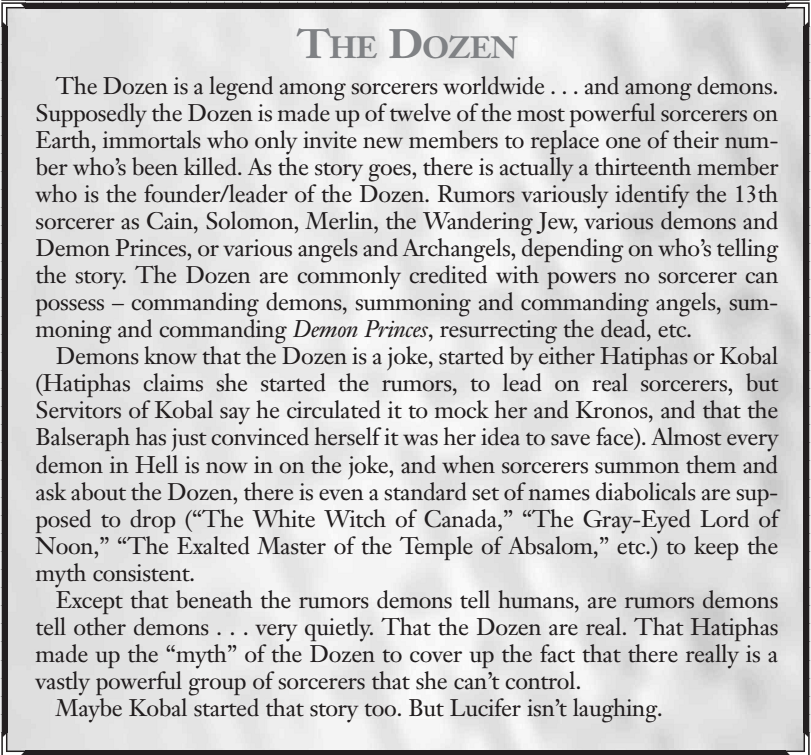
The Midnight Screamers are children. Children, specifically, that Beleth has found to have immense selfishness and inventive cruelty. They just need a push into early psychosis, so they can't tell right from wrong or dreams from reality. They are groomed to be Soldiers, if they have potential. If not, well, mundane sadists also serve Beleth's purposes. The Midnight Screamrers are the elite of Dream Soldiers, children with 6 or more Forces. Each is guarded by a Djinn of Nightmares. They meet in the Marches almost exclusively, and Beleth has a secret fortess near her Tower for them to gather and gloat in, and to be taught by demons...who often learn as much as they teach. There's rarely more than a dozen Screamers at once, and usually less than half that. They terrorize dreamers Beleth designates, acquiring knowledge and experience so that, if they live to adulthood, they are her very best, knowledgeable and skilled. They're also quite mad, and once they pass adolescence Beleth sets them to independent work, so that they don't contaminate her next generation.
The Black ORder is your good old-fashioned black magic cult. They curse people, summon demons, sacrifice living beings for Essence, whatever. They have remained stable for almsot 100 years largley due to being the pet project of Hatiphas. She has groomed them as the elite of sorcerous cabals, with chapters in many cities in several countries. Other sorcerers, if succesful, will eventually either find or be found by the Black Order, and usually they aspirre to join to get access to their rituals and resources. (The resources are somewhat exaggerated, though many members are wealthy, and the rituals are taught only to the inner circle, who report to Hatiphas directly.) Hatiphas ensures that only the most reliable rise to lead, and purges those that threaten to destabilize the Order. Black ORder chapters are usually deadly rivals to any other local cabals.
The Sons of Lucifer have little to do with Lucifer. They were founded in the 1800s by a group of British aristocrats who did sorcery as a naughty hobby. They adopted the grand name to mock Victorian society and conventions, seeing themselves as wicked nonconformists. Mostly, they were mundane opium addicts, but a few were genuine sorcerers who allowed their peers to believe they were contributing. They made a vast fortune by recruiting young degenerates who sought to play at black magic, and even recruited a few real initiates. They had the Corporeal Song of Entropy and the formula for an immortality potion. The true sorcerers among them lived quite a long time, but during WW2, there was a schism between supporters of England and Nazi sympathizers. The cabal fought itself, and several died, but by the end of the war, the Nazi sympathizers were killed or driven into hiding. Today, the Sons of Lucifer remain an exclusive club, still doing sorcery, mostly for sport. Most of them know only Focus and Alchemy rituals - any summonings are purely show and they have no serious celestial attention. They accept only very wealthy members, and preferably those with claims to nobility. At least two of the founders, now over 150 years old, remain alive and active.
Next time: Not Much
gunsbrasters
Original SA post Corporeal Player's Guide: gunsbrastersThe Esteemed Overlords of Sleep are a cult founded by a Korean Buddhist monk in the 1600s. He was kicked out of his temple for doing sorcery and mad his way to Japan, where he gathered a small circle of followers. The cult grew by attracting mystics from across Asia, developing a highly syncretic belief system. In the early 20th century, Japanese authorities cracked down on them, so the cult moved to Myanmar and built a temple there. They summon ethereals, who trade 'enlightenment' for Essence. Pilgrims visit their temple from across the world, and occasionally one of the sorcerers will leave it to start their own cabal.
Anyway, we then get rules for explosives and heavy weaponry. Most celestials can take a grenade to the face with no problems - they deal only 2d5 damage. Yadda yadda. There are rules for searching for information, but frankly none of this is interesting. There is a discussion on how autopsies on vessels will produce weirdness - no food in the stomach, no hydration, ovaeries and testicles that never functioned despite being fully functional. Plus Corporeal Discords and the traces of having been much faster at healing and immune to disease. Officially, In Nomine will never answer the questions raised by modern biology and instead handwaves them away, but the book suggests you could change that for your game.
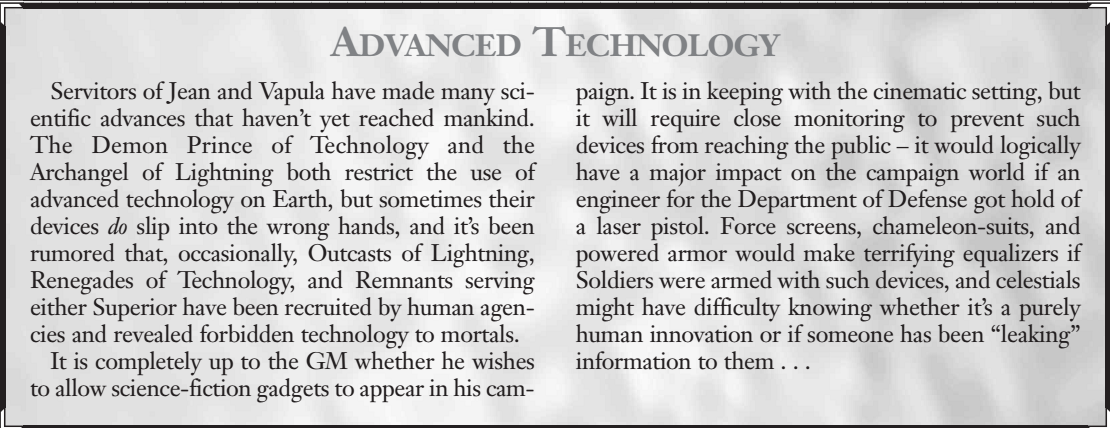
Blah blah, security systems, cameras...there is a nice sidebar on weird magic gadgets.
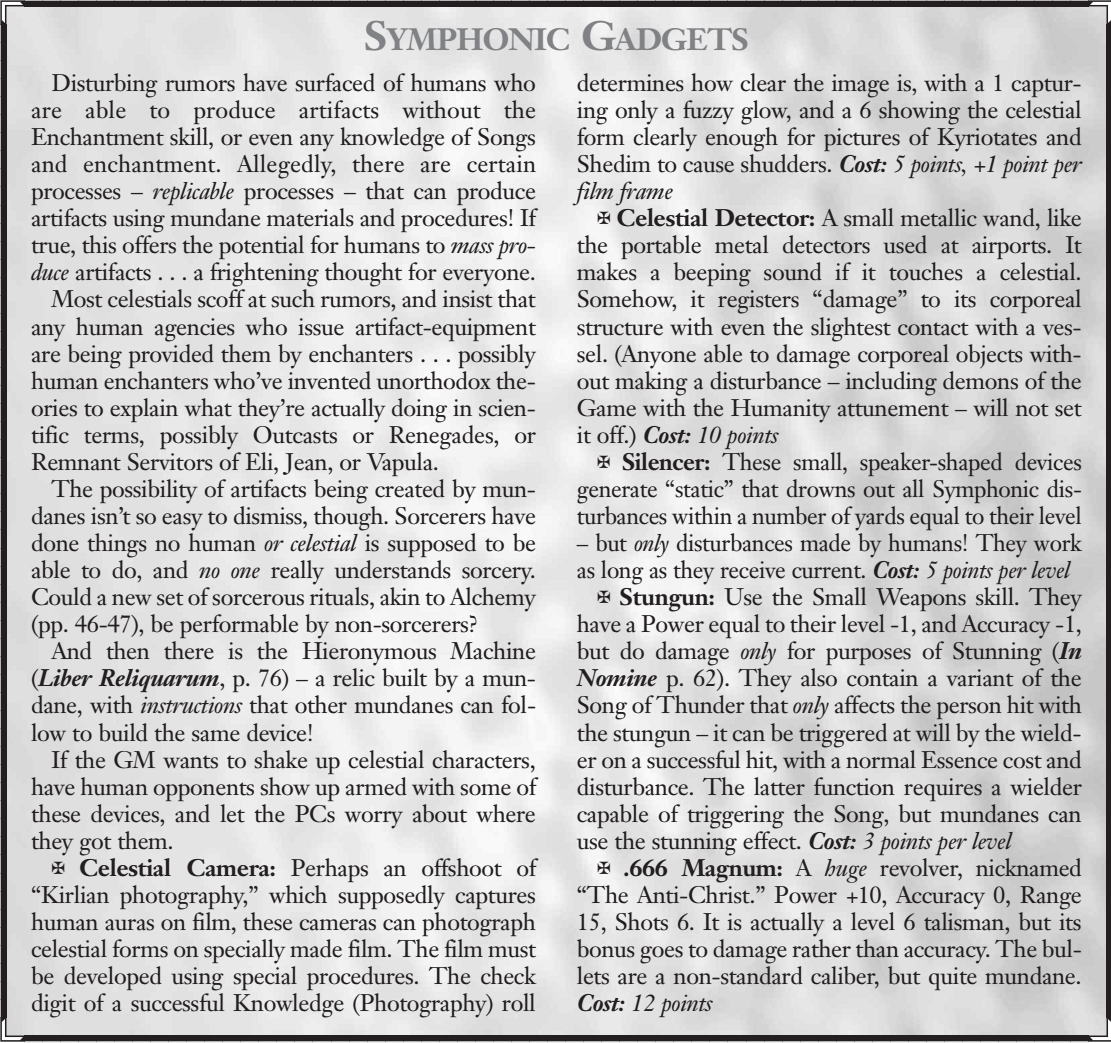
Then there's poison and disease, which essentially deal damage on a recurring cycle. Celestials, ethereals and Saints are highly resistant to poison, and undead are totally immune to it. Any non-mortal is immune to disease. But the reason this is interesting is that it includes rules for drugs. Undead are immune to drugs, but no one else is. Drugs can raise stats (but not above 10, or 12 for celestials) or lower them, but not below 1, and changes do not alter HP in any realm. Anyone, even a celestial, who takes an addictive drug must make a Strength roll depending on how addictive it is, or gain an Addicted disadvantage or Discord. Non-addictive drugs do not require a roll. Mildly addictive ones check if you average more than 1 dose per day, and make you roll every (Corporeal Forces) weeks. Moderately addictive drugs check if you take them at least once a day or (Strength) times per week, and roll once per week. Very addictive drugs make a roll ever (Corporeal Forces) days even if you use the drug only once in that period. Withdrawal reduces Will due to Addicted. Humans reduce addiction after long withdrawal periods - but celestials don't. Also, withdrawal deals 1 mental damage per week for easy withdrawal, per day for tough and per hour for severe.
Alcohol is mildly addictive and tough withdrawal. 1 dose of it is 4 beers, 2 glasses of wine or 2 shots of hard liqour. Every dose reduces all stats by 1, which goes away aat 1 point per hour, 1 pint per 10 minutes for non-mortals. Alcohol also acts as a poison so it can cause physical damage if you drink a ton of it real fast. There are no beneficial effects to taking alcohol.
Caffeine is mildly addictive and easy withdrawal. One dose is a cup of coffee, two cups of tea and two cans of soda. The GM may allow it to give bonuses to Will to stay awake, or penalties to Will to fall asleep. At worst it can cause Precision penalties.
Cocaine is very addictive, easy withdrawal. One dose is a 100mg. Anyone high on coke gets +1 to all Will rolls, including infernal resonances, but each dose also gives -1 to Perception. Each dose lasts 1d6*10 minutes and also acts as a poison.
Crack cocaine is very addictive, tough withdrawal, and addiction rolls are at -2 because crack is apparently the most addictive thing known to man. 1 dose is 10mg, and it has the same effects as cocaine, but only lasts 1d6 minutes. So, if you plan to use cocaine for buffs, use the powder, not the rock.
Heroin is moderately addictive and severe withdrawal. Anyone high on heroin gets -3 to all stats, and also heroin is a poison. No benefits.
LSD is non-addictive. Each dose lasts 6+1d6 hours. The first dose gives +2 Perception but -1 Precision and Will; each dose after that cumulatively penalizes but gives no additional bonus. Unlike other drugs, LSD can reduce a stat to 0 - if that happens, the stat permanently drops by 1, and 1 again per additional dose.
Marijuana is mildly addictive, easy withdrawal. It causes -1 to all stats per dose, lasting 1 hour per dose.
Speed is moderately addictive, tough withdrawal. It gives +2 Agility for 6 hours, plus 1d6 hours per dose. It also gives +2 to Precision for 1d6 hours, but that becomes a -2 penalty after that period. Plus, it's a poison, except the poison deals both body and mind damage.
Tobacco is moderately addictive, easy withdrawal. One dose is 4 cigarettes. However, unlike most addictions, tobacco requires one dose per day per level of addiction. Tobacco gives +1 Precision, but while under withdrawal you suffer -2 Precision.
So now you know how to take drugs for fun and profit in In Nomine! Smoke cigarettes for gun accuracy, take LSD for angelic resonances, snort coke for demonic resonances.
The End
Next up: Angelic Player's Guide, Liber Canticorum or Revelations 1?